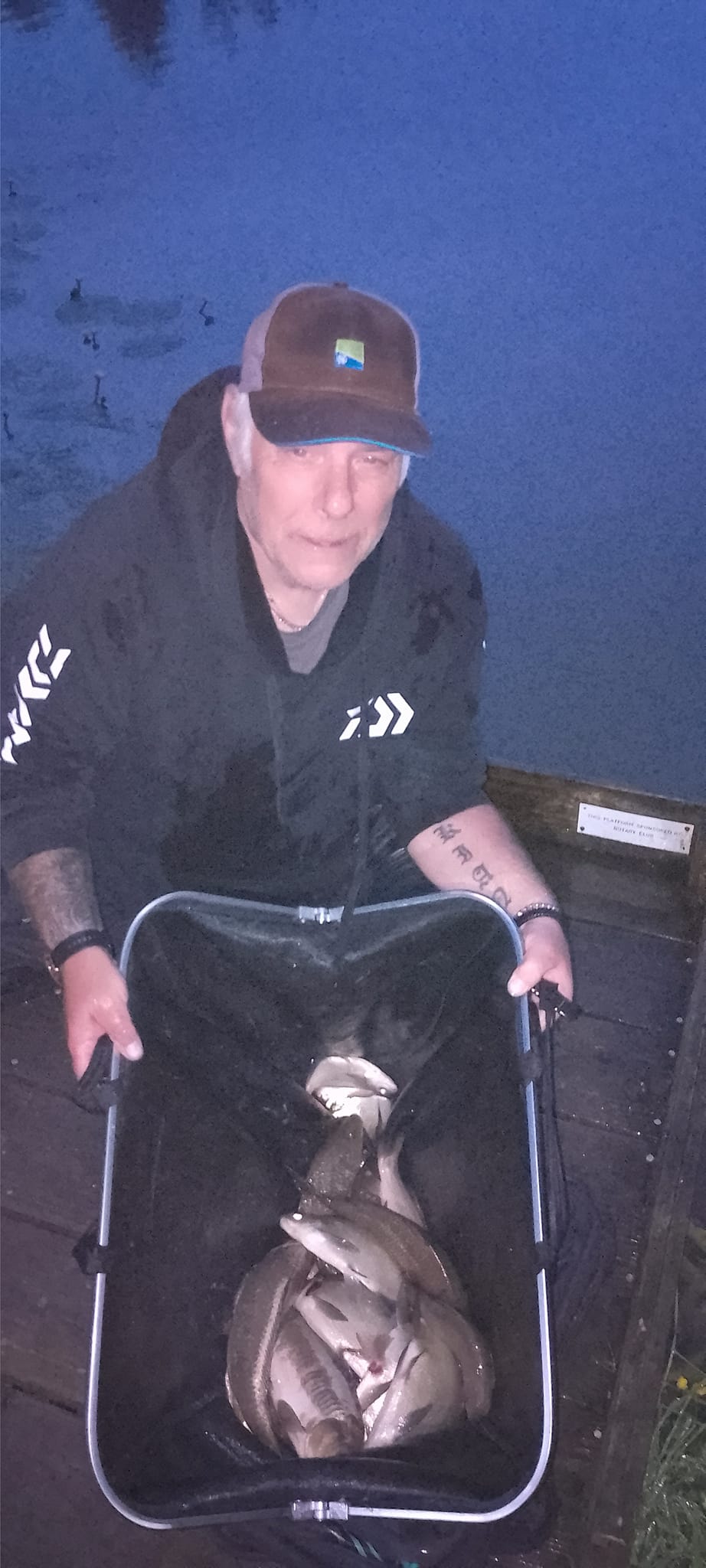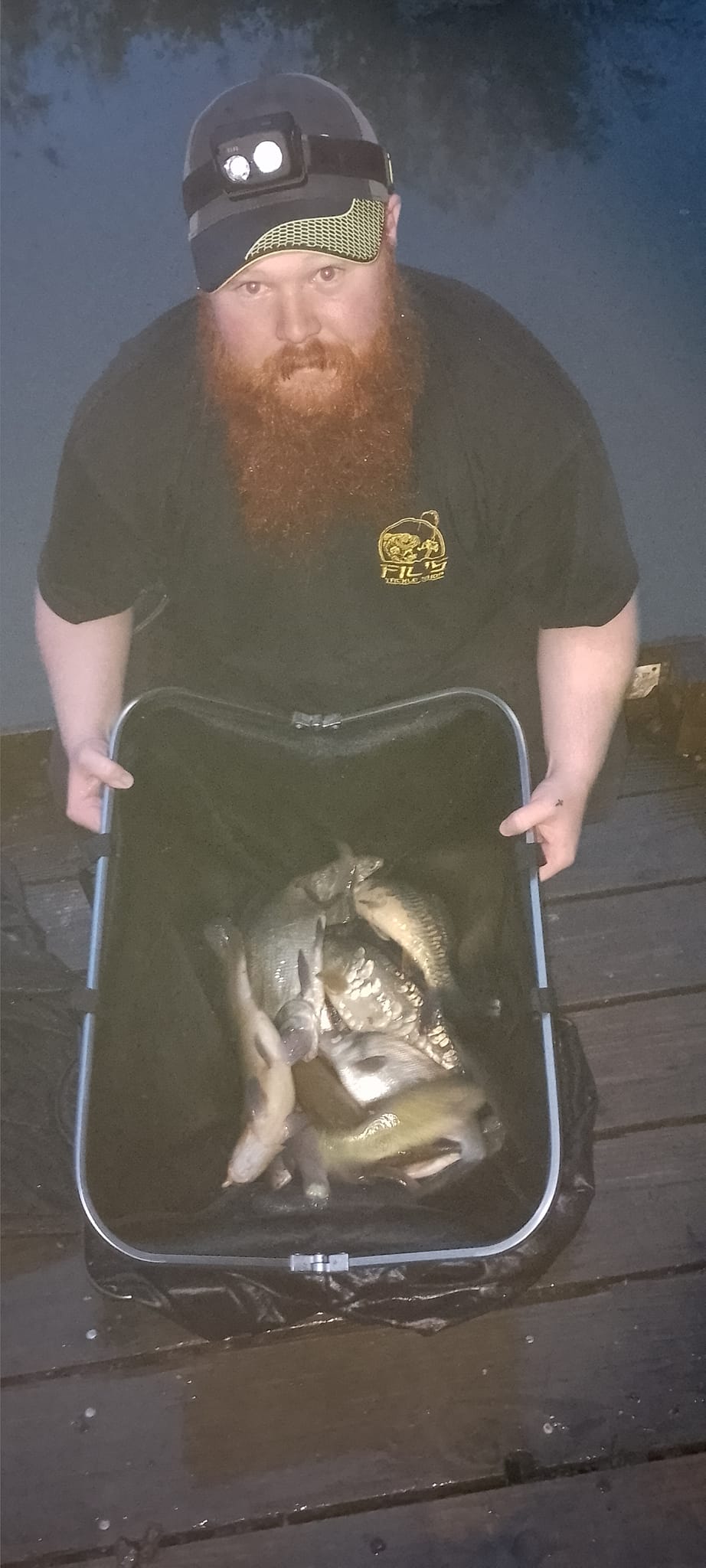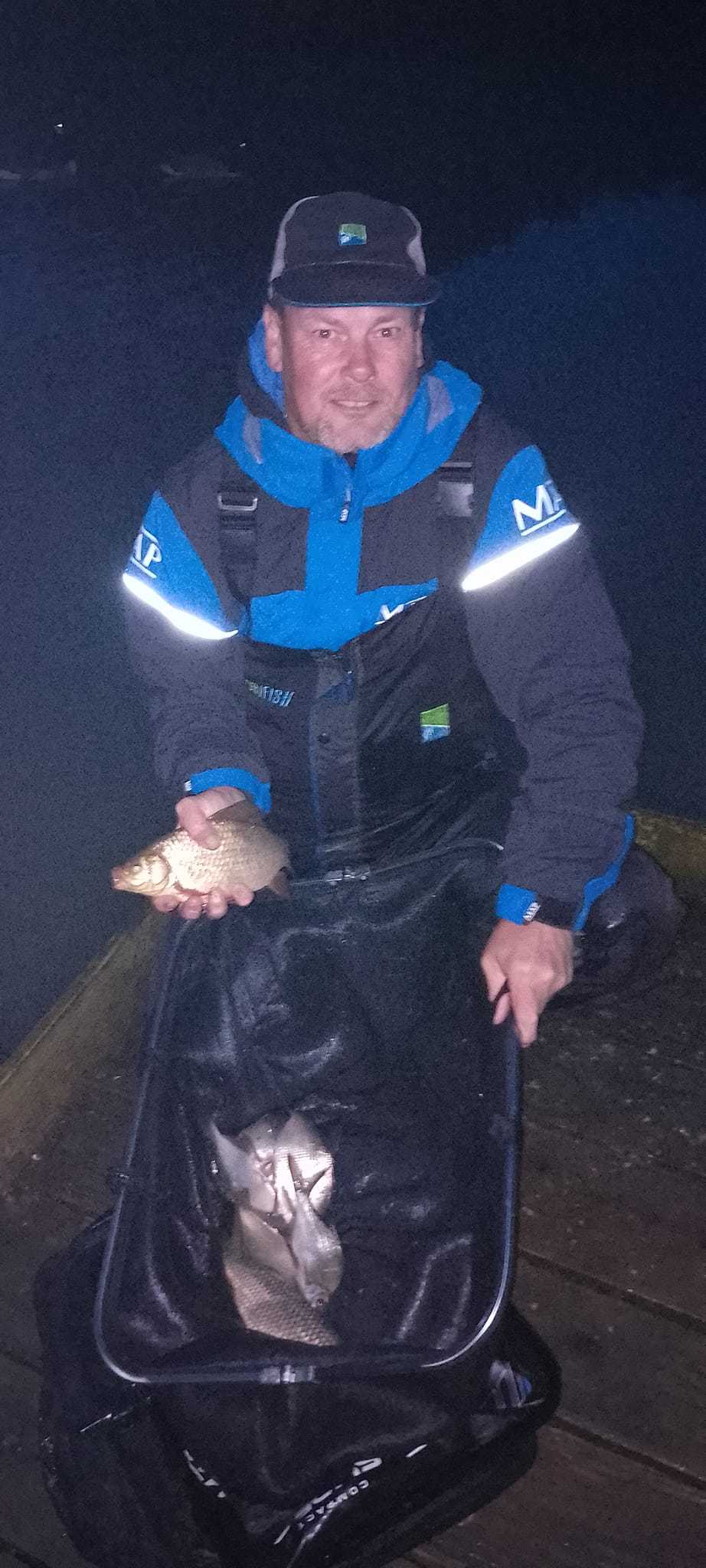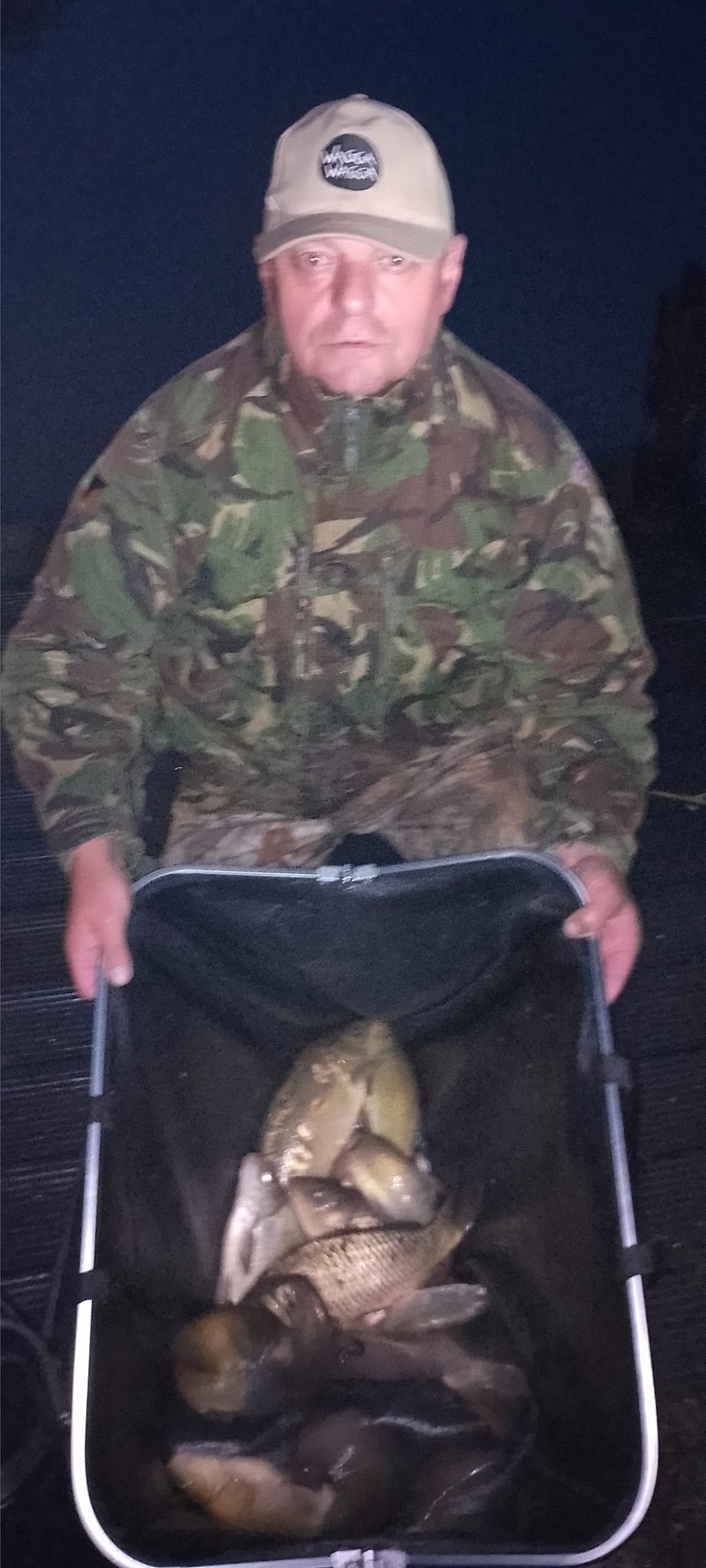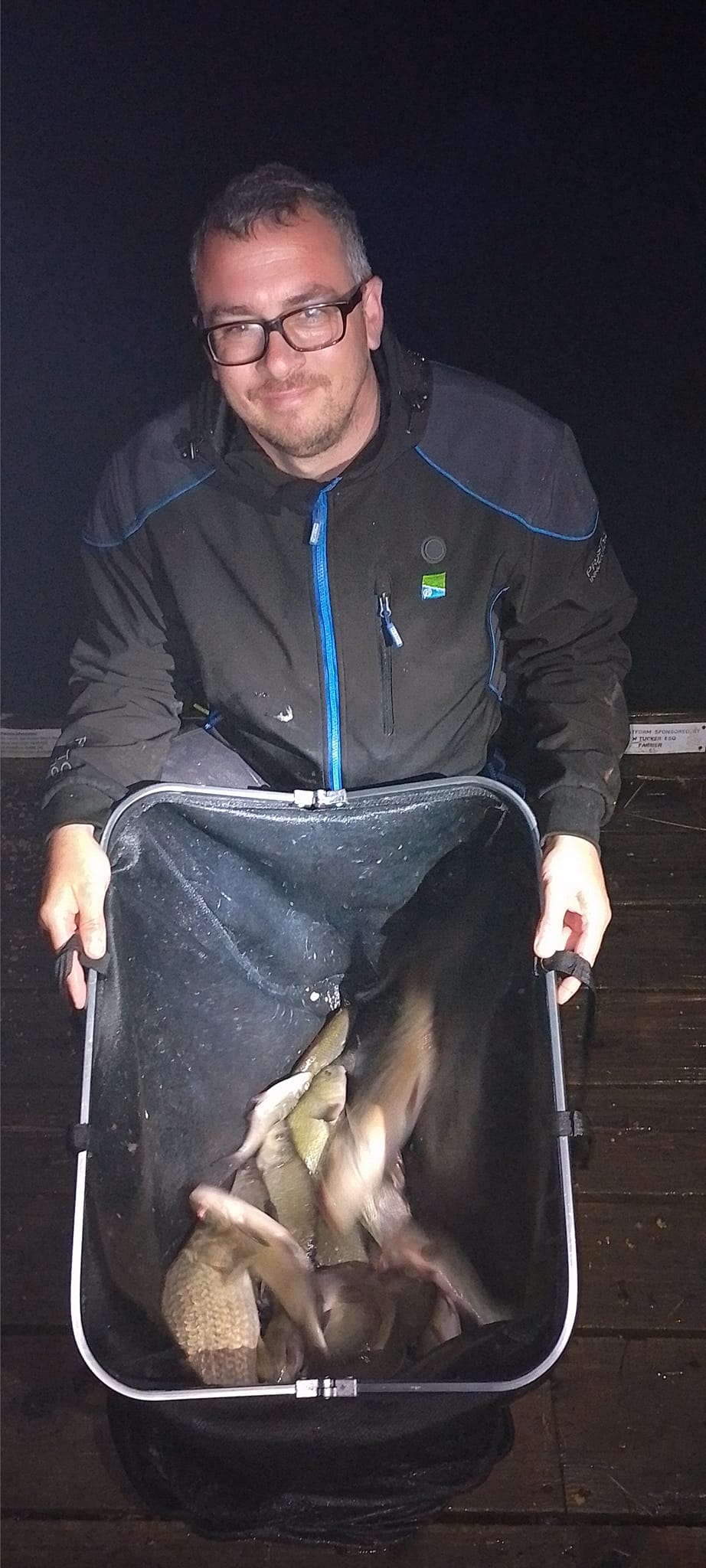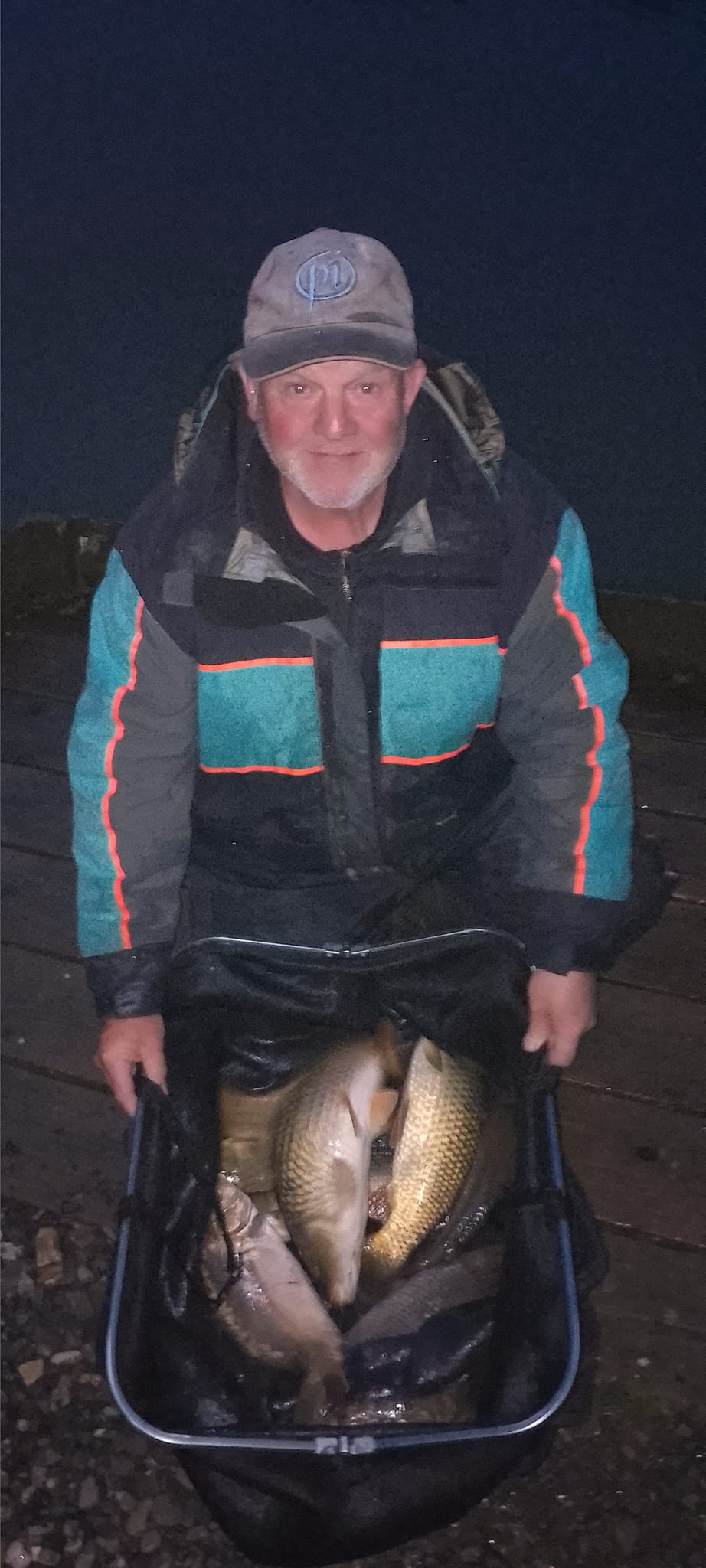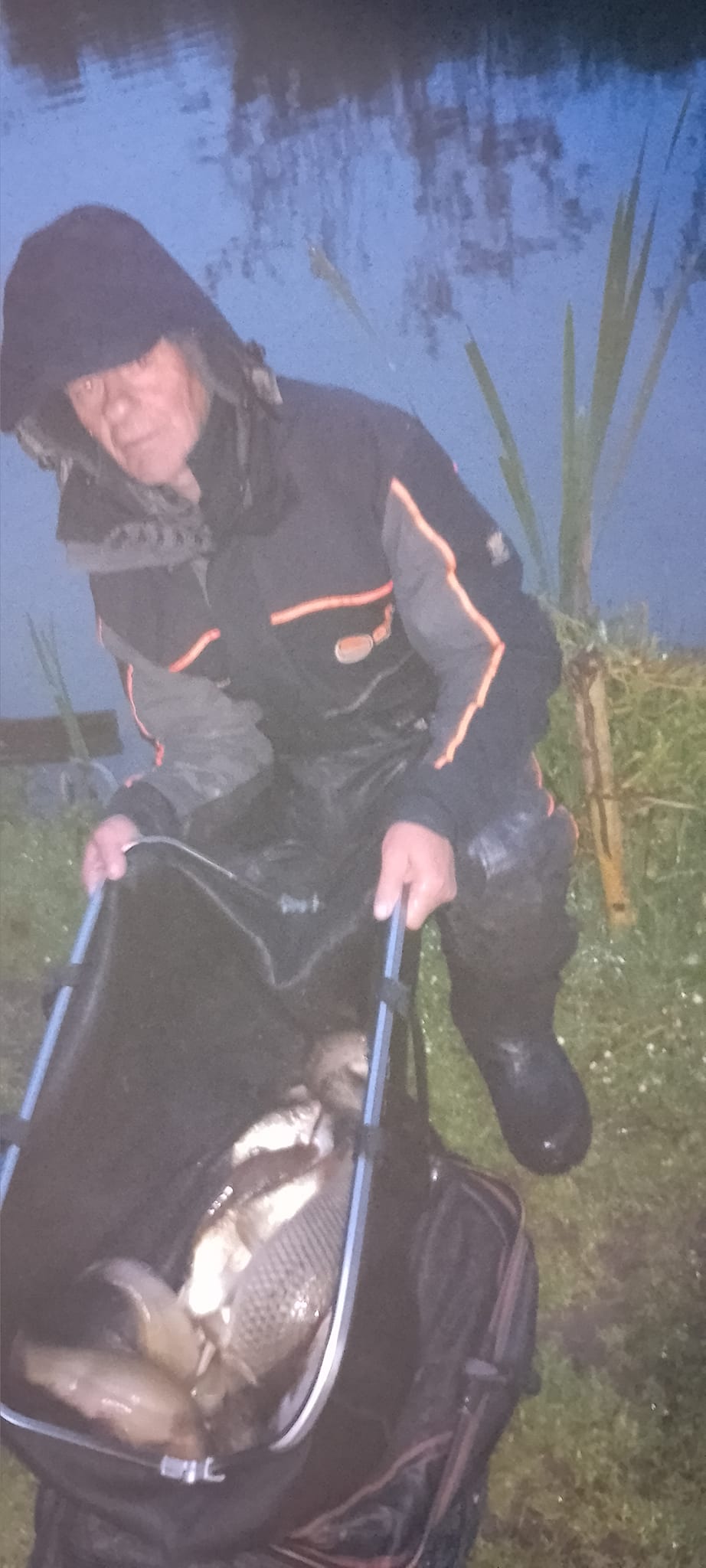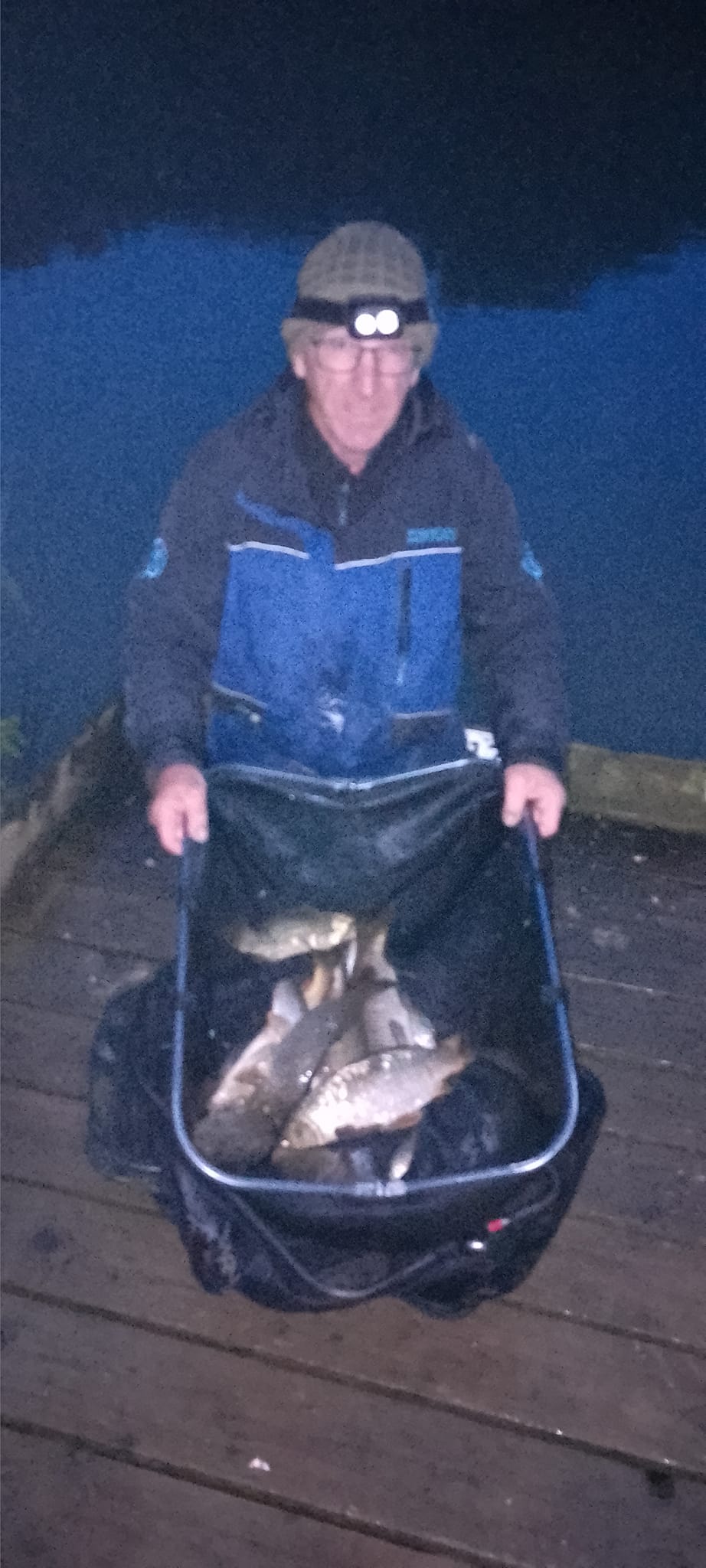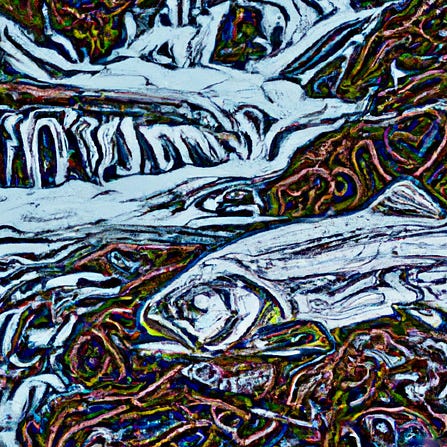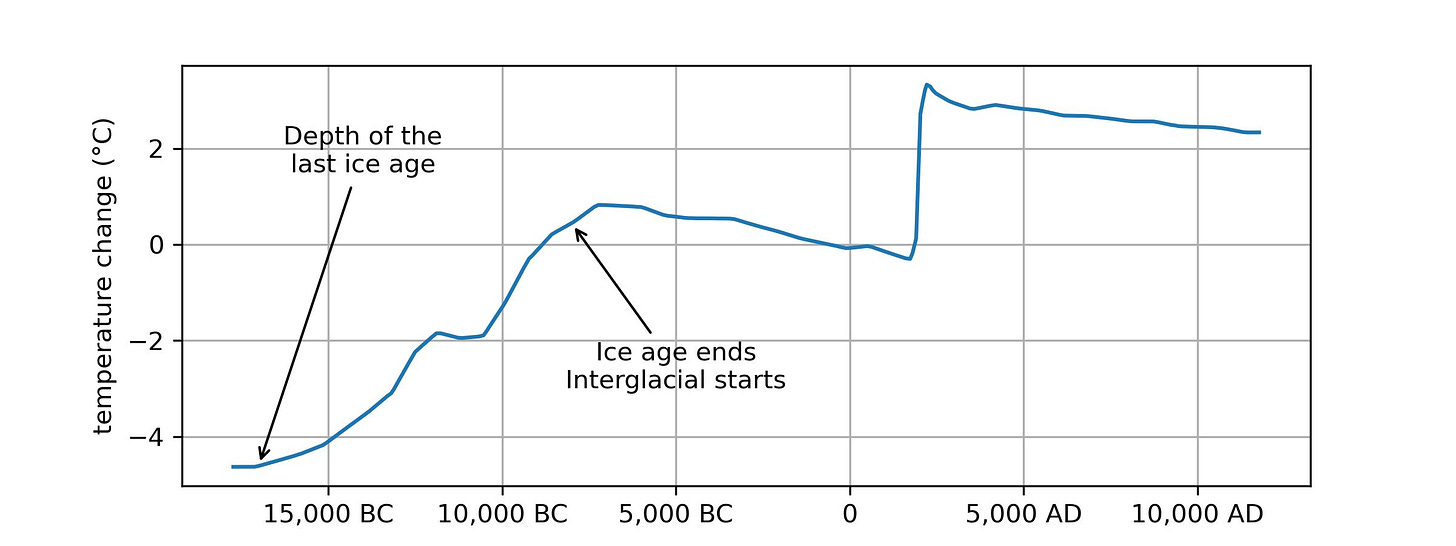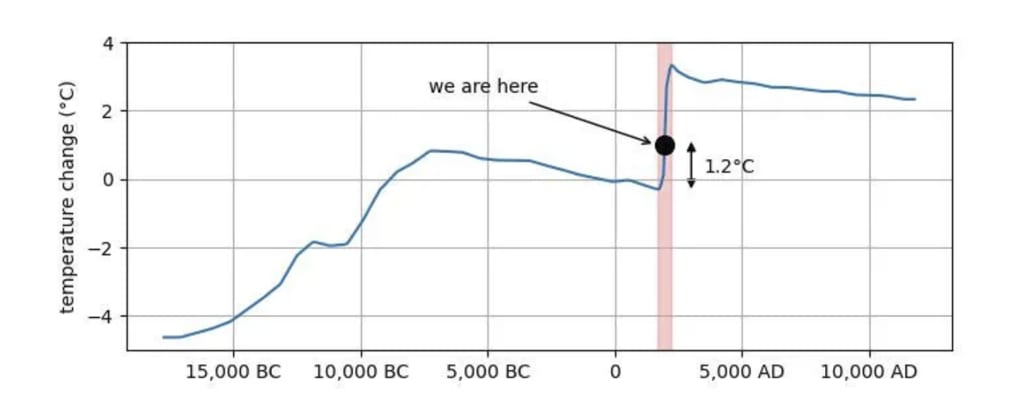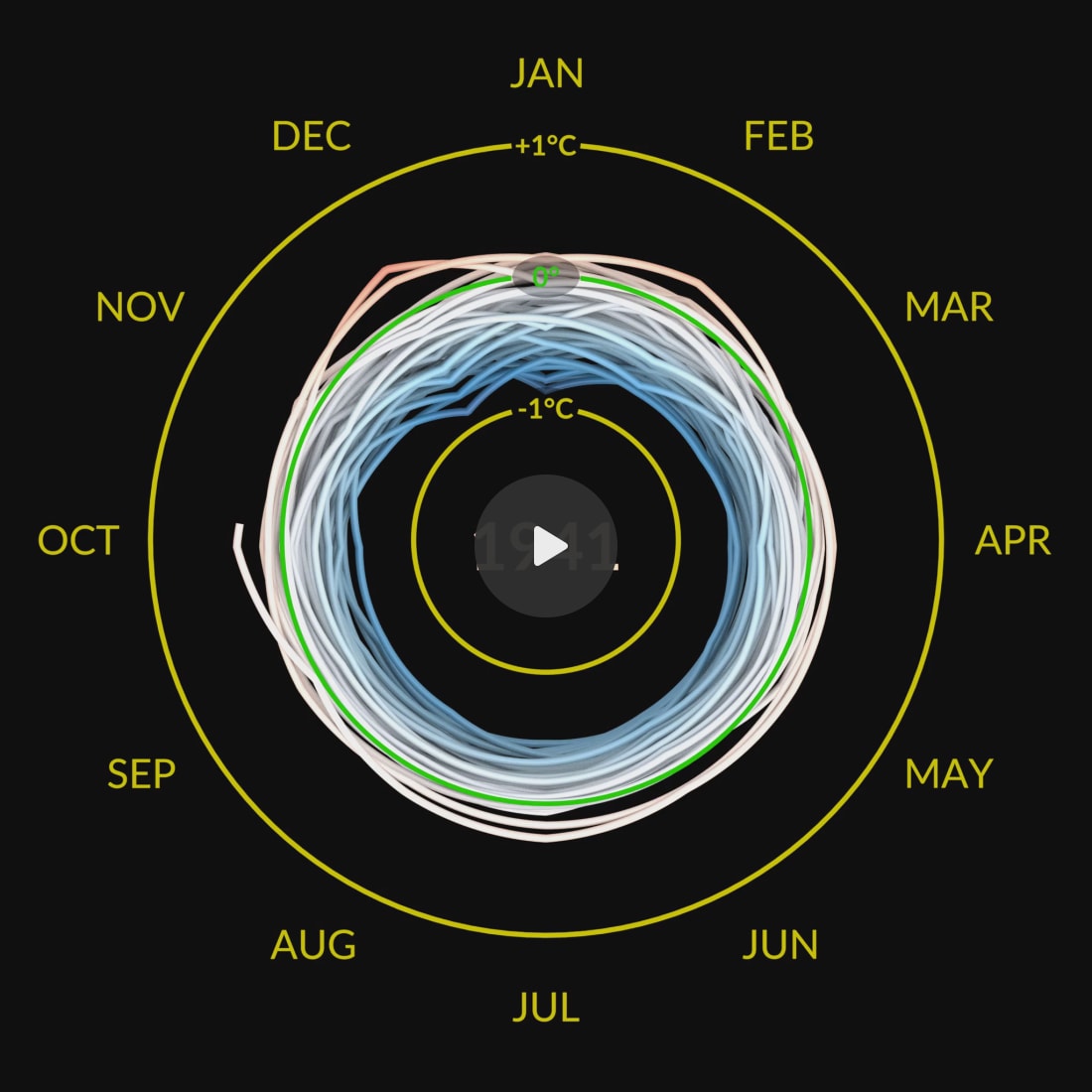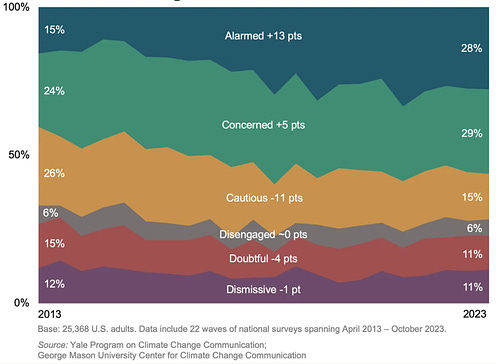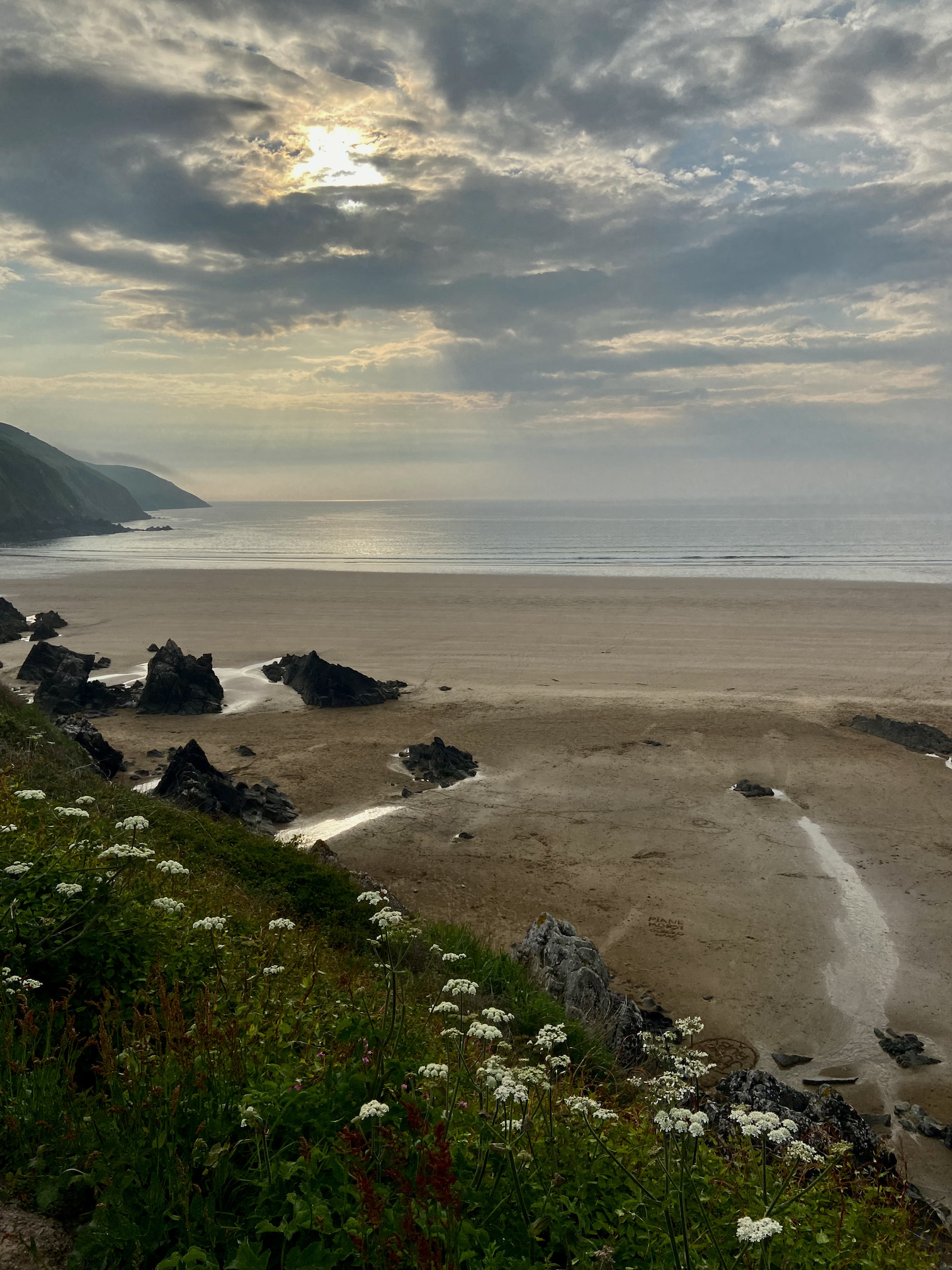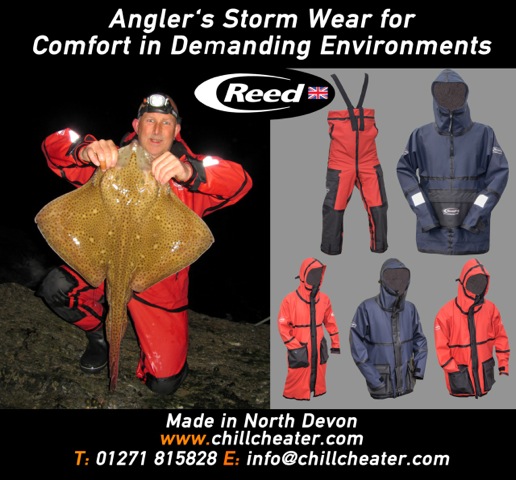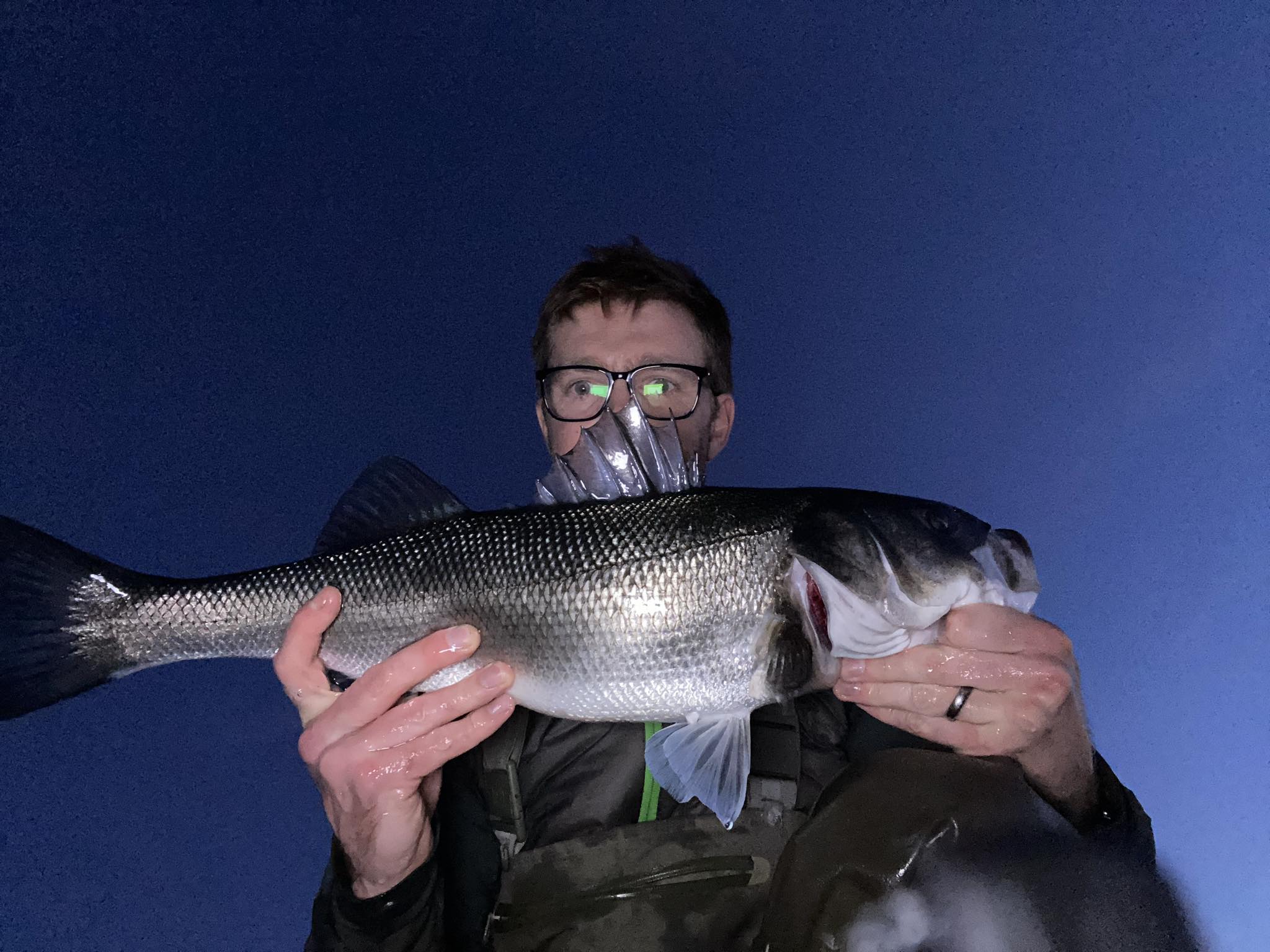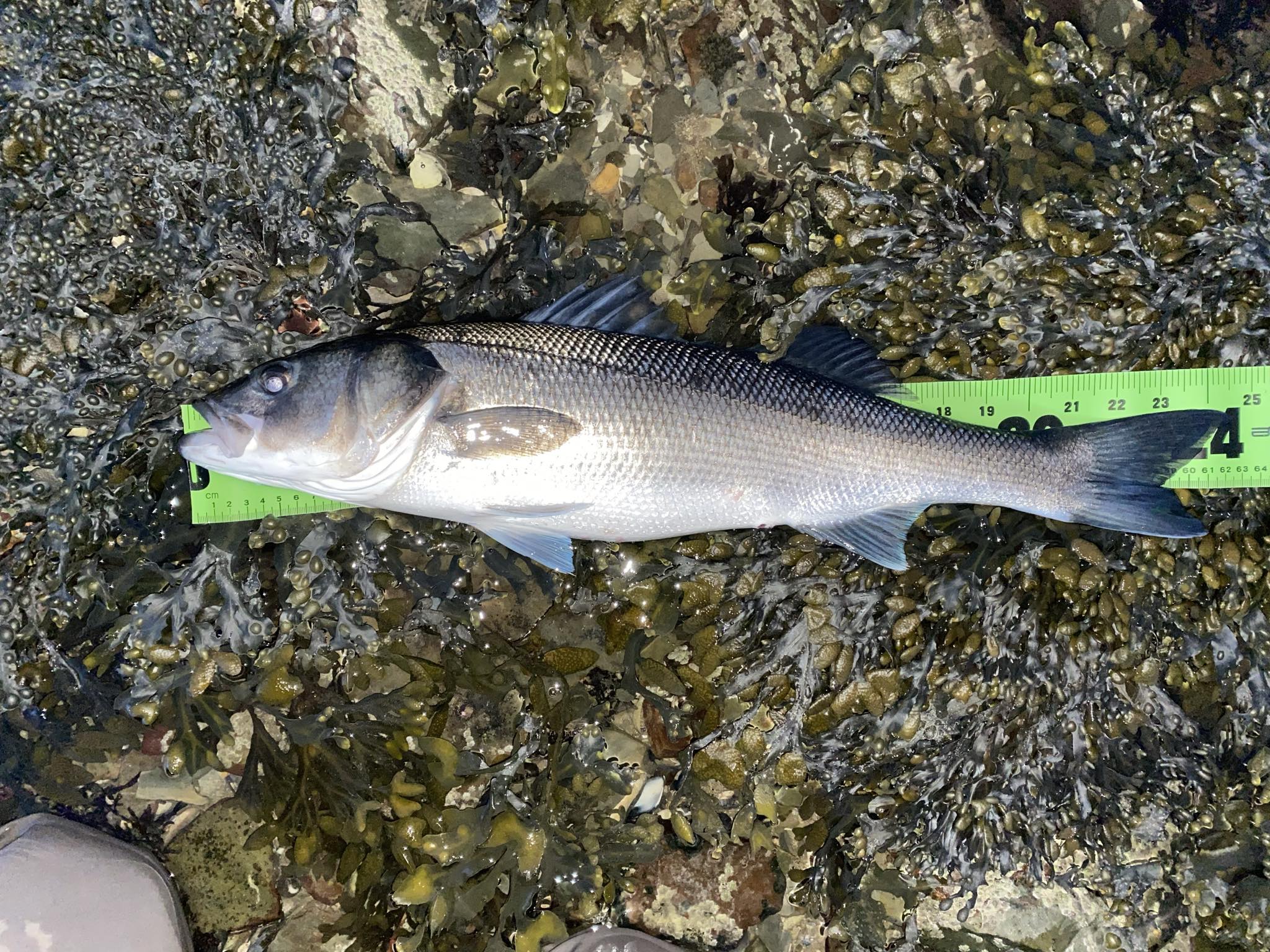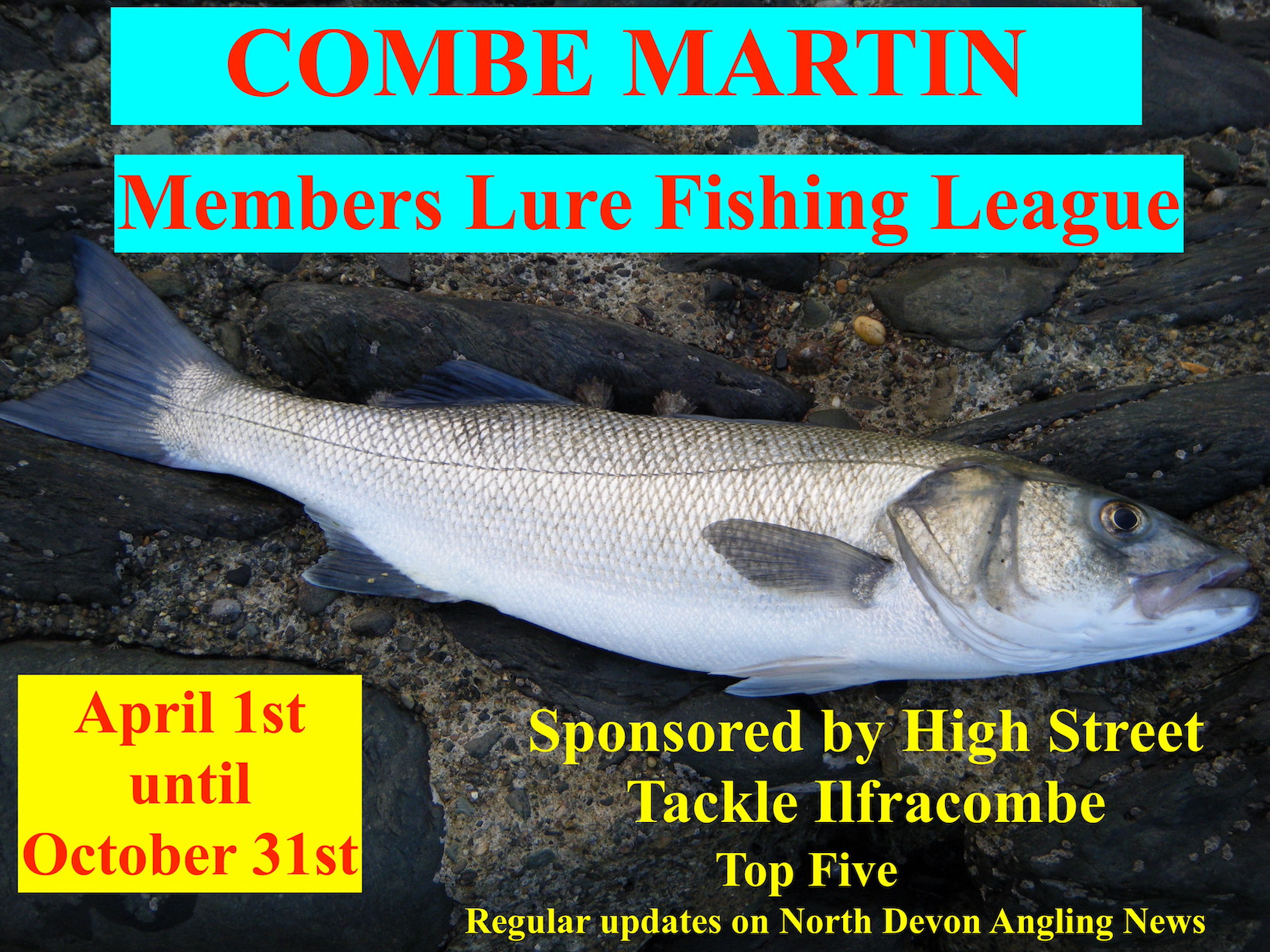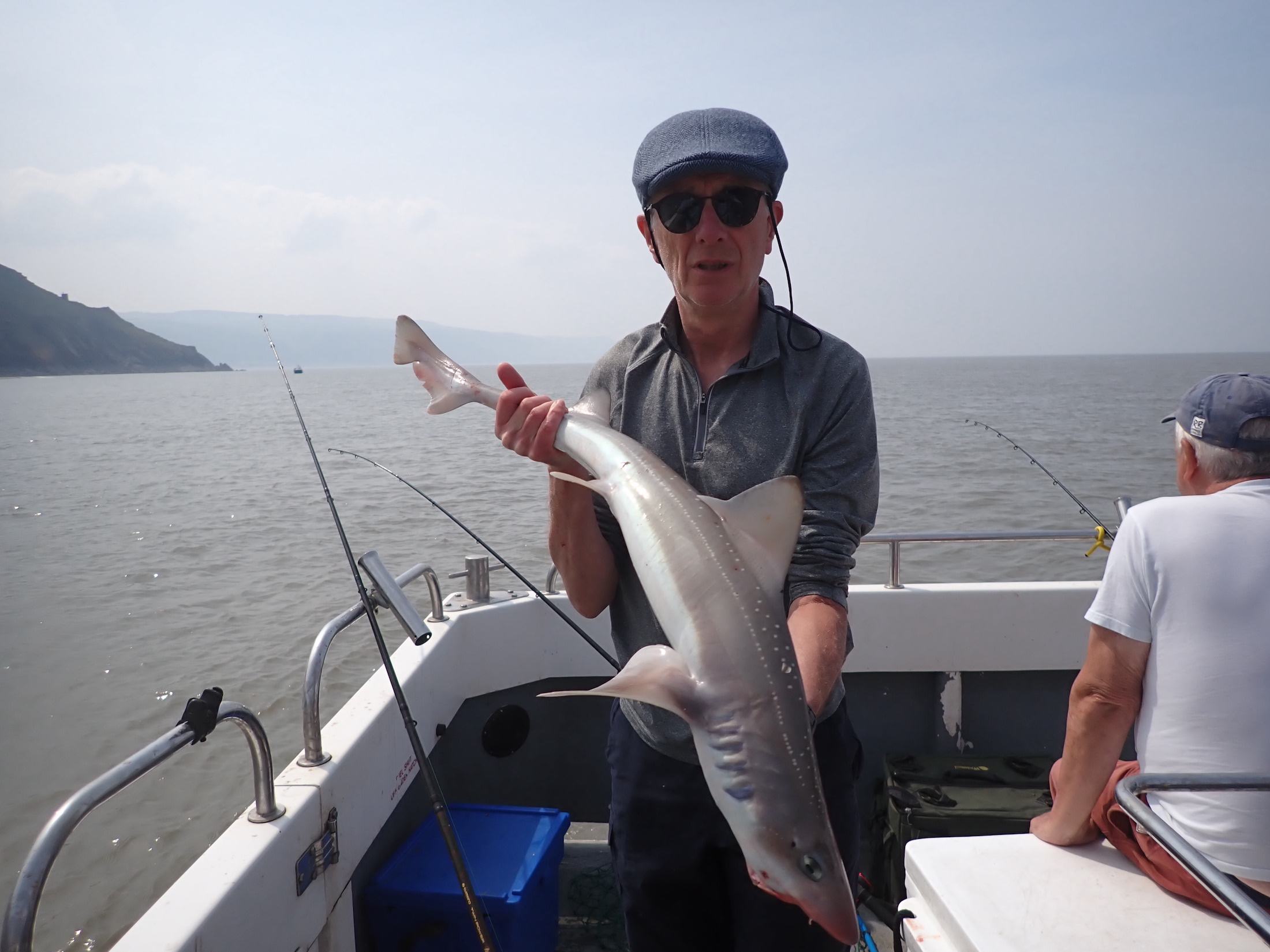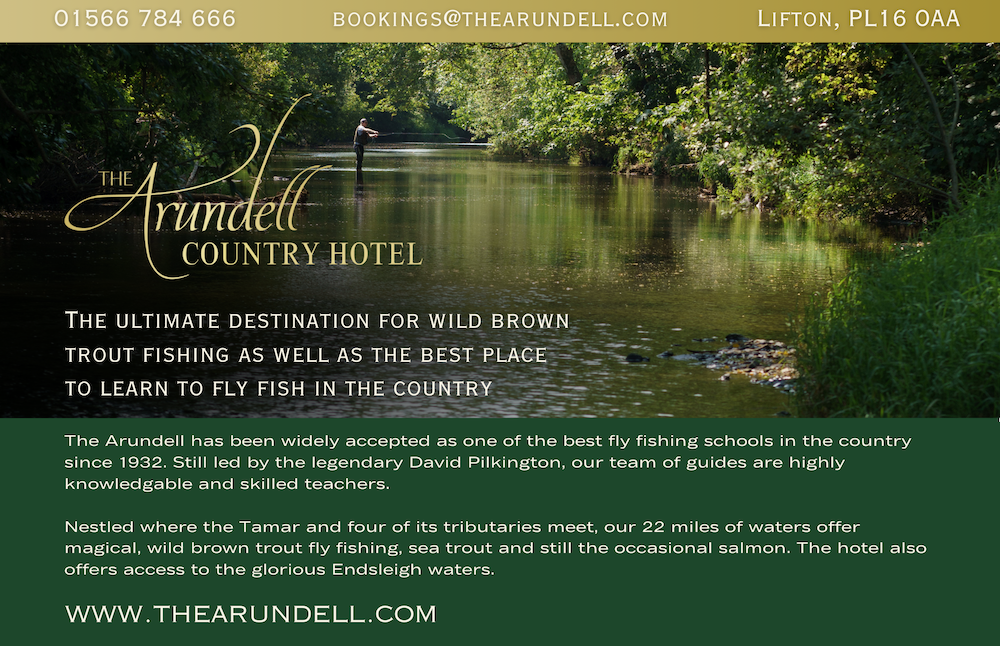South West Lakes Trust Trout Fisheries Report -May 24
May 2024
As the weather starts to warm, there has been an increase in insect activity, with fish eager to feed either on or below the surface; intermittent thunderstorms and heavy downpours of rain have resulted in some challenging days’ fishing, although this has meant that the reservoirs are still all at top level.
Fishing:
Kennick – Anglers averaged 3.5 fish per rod over the month, with fish well spread out around the lake. Bank anglers enjoyed slightly more success than the boats, with Clampitts, Smithacott, The Dam, The Lawns and Oak Tree Point being particularly popular locations. There were plenty of Hawthorn in the air, which, combined with Sedge and Buzzer hatches, meant that fish were eager to look up to feed, either at or near the surface. In addition to fish rising to dry Hawthorns, Sedges, Hoppers, Black Gnats and Buzzer Emergers on the surface, plenty of fish were taken on subsurface nymph patterns (Buzzers, Diawl Bachs, Damsels and Hares Ears), or deeper fished lures (Wooly Bugger, Black or Yellow Boobies, and Tequila Blobs). Alan Behan (from Plymouth) caught eight rainbows using an Orange Stalking Bug and Black Gnats, while Graham Read (from Christow) caught a bag of six rainbows.
Siblyback – Anglers averaged 4.8 fish per rod in May, with the catch rate improving as the month progressed. Stocky Bay, Two Meadows and the North Bank produced the best sport, and, with Hawthorns and beetles in the air and Buzzers hatching, there was plenty of dry fly action. Popular patterns included Hawthorns, Black Hoppers and Black Beetle patterns, with deeper-feeding fish taking Diawl Bachs, Buzzers, Damsel Nymphs, Montanas and the occasional Boobie. Floating lines with long leaders and a slow figure-of-eight retrieve proved to be the most successful method. Martin Stevens (from Liskeard) caught a bag of seven rainbows (six on dry patterns), while Alex Jackson (from Tiverton) caught a bag of twelve rainbows – fish coming up to dry patterns, with very subtle takes in a cool breeze. The Snowbee Bank Teams of Four competition on 4th May was won by Mark Damarell, Graham Johns, Paul Nottle and Jed Stone, with a bag of 24 fish weighing in at 34lb 9oz.

Burrator – The fishing tailed off slightly from last month at Burrator, with anglers averaging 2.1 fish per rod. Fish were found at all depths in the water column, with floating, intermediate and sinking lines all catching fish. Longstone Bank and Point, Pig Trough and Lowery Bank all produced fish, and with midges hatching, Buzzer Emergers and Hoppers took surface-feeders, while deeper fish were caught on Damsel Nymphs, Buzzers, Black Tadpoles, Orange Blobs and Green Fritz. Harry Duggan caught three rainbows, including a personal best and current season record with a fish of 4lb 4oz, using a stripped Orange Blob while fishing by Sheepstor Dam.

Stithians – The excellent sport at Stithians continued throughout May, with anglers averaging 3.7 fish per rod. Fish were well spread out around the lake, and, with Hawthorns being blown onto the water, there was plenty of dry fly action to be had, with anglers catching on Hawthorns, Black Gnats, Hoppers, Bob’s Bits, Klinkhammers and emerger patterns. Deeper feeding fish were caught on Black and Green Buzzers, Hares Ears, Spiders, Montanas, Cormorants and Orange Blobs. Nigel Burley (from Truro) caught a bag of eight rainbows; Steve Fuller (from Camborne) caught twelve rainbows to 2lb, as well as a Brown, using a self-tied Hawthorn variant and a Griffiths Gnat/Shipmans Buzzer hybrid, fished both stationary and pulled through the surface ripple.
Fernworthy – The warmer weather brought an improvement in the fishing, with anglers averaging 4.1 fish per rod, plenty of which were caught on dry patterns, as fish were eager to feed on the abundant beetles, Hawthorns and emerging midges – Black Hoppers, Black Ants, Black Gnats, Klinkhammers, Hawthorns and Black Sedge patterns fished on a floating line all caught well. Sub-surface feeders were mostly caught on Buzzers, Montanas and Pheasant Tail Nymphs. Popular locations included Boathouse Bank, Thornworthy, Potters Bank and Lawton Bay. Daniel Robson (from Tavistock) caught eight browns to 1lb 4oz, with the best results in the late afternoon; Mark Mcilwane (from Bishopsteignton) caught eleven browns to 1lb 8oz, using a dry Hopper cast to fish feeding on terrestrials.

Colliford – Anglers averaged 3.9 fish over the month, and with Hawthorns in the air, many fish were taken on dry patterns (Bob’s Bits, Hawthorns, Foam Beetles and Claret Hoppers). Other successful patterns included Black Cruncher, Bloodworm, Soldier Palmer, Bibio, Zonker and White-Tailed Zulu. Fish were well spread out around the banks, with the most successful anglers keeping on the move to cover as much bank as possible. Allan Lawson (from Plymouth) caught a bag of eleven browns, with fish taking a Claret Hopper around the bank at Fishery Hut Bay. Dean Boucher (from Gunnislake) caught thirteen browns in one session, pulling wet flies (most takes were on the lift at the end of the retrieve), using Soldier Palmer, Zulu and Zonker patterns, while his best fish of the day (at fifteen inches) took a White-Tailed Zulu.
Roadford – The fishing improved towards the end of the month, by which time anglers were averaging 4.8 fish per rod, with the best fishing to be had at Gaddacombe and the East Bank. Floating lines were the order of the day, with a variety of retrieval methods. Rodney Wevill (from Lifton) caught seven browns to 2lb, using Soldier Palmer, Mini Scruffy Tiger and Beaded Blue Zulu patterns on a floating line with a medium retrieve. Alex Jackson (from Tiverton) caught seven browns to 2lb, using an Olive Damsel on the point, and a Soldier Palmer fished on the dropper.
Please see the Trust’s website (www.swlakestrust.org.uk/trout-fishing) for more information on buying tickets, boat availability and booking, and forthcoming events. The Trust will be offering beginners’ taster days at Roadford, Burrator, Stithians and Kennick throughout the season, assisted by local experienced guides and instructors. The Trust, in conjunction with Fluff Chuckers, will be running a Brown Trout Masters competition this season, to be held over three dates at Colliford, Fernworthy, and Roadford – please see the website for more information.
Chris Hall (May 2024)
ENDS
For more information, please contact:
Becky Moran
Head of Communications and Marketing
South West Lakes Trust
01566 771930
Atlantic Salmon : THE BRINK OF EXTINCTION?
https://fishrise.substack.com/p/atlantic-salmon-the-brink-of-extinction?utm_source=post-email-title&publication_id=1289122&post_id=140218257&utm_campaign=email-post-title&isFreemail=true&r=1uvzdy&triedRedirect=true&utm_medium=email
Salmon are in trouble. Ask anyone involved and they’ll tell you how bad it is and who’s to blame (it’s always someone else).
It’s so bad that the Atlantic Salmon is now officially an IUCN Red List Endangered Species in the UK. In Ireland, the population has collapsed by 80% in 20 years. Other places and other salmon species are not far behind, and the word extinction really has entered the debate.
We can see this decline by watching the way the money flows. Just about everywhere the value is slowly ebbing out of salmon fishing, almost no matter how or where we do it, and from mega-trawler to rod & line.
Sure, we can remove dams and nets, replant catchments and clean up pollution to help mitigate the decline, but they’re not enough.
This crisis is universal, which is of note, because not everywhere has nets or fish farms or pollution or management corruption. Indeed, some have none of the above, yet their salmon are in trouble.
One of Scotland’s most exclusive rivers, the Helmsdale, used to be a place where fishing was accessed via dead men’s shoes. Royalty graced its banks and the management was so discrete as to be almost uncontactable. A rod on the Helmsdale was a mark of status. Now the Helmsdale has gaps to fill and is promoting itself in upmarket magazines. It has no pollution and no fish farms to blame. Something else is going wrong.
What salmon everywhere have in common is rising water temperatures. This is happening both at sea and in rivers. High temps impact badly on salmon at every stage of their lifecycle, from squeezed and collapsing ocean food chains to overheated redds and undernourished smolts failing to make the journey back to sea. The salmon lifecycle makes them especially vulnerable to warming water.
This is real and it’s happening everywhere. Check out the Missing Salmon Alliance for a thorough breakdown of these combined threats. Their rallying call is Cold, Clean Water – which is as succinct a summary of the salmon’s plight as you can find anywhere.
And it’s not just salmon: Entire food chains are wobbling. In recent years 10 billion snow crabs have gone missing from Alaskan waters and the most plausible explanation is starvation in warming seas. A few years ago 100m Alaskan cod went AWOL for the same reason: Warmth increases fish and crustacean metabolic rates, so they have to eat more just to maintain body weight. At the same time the warm water suppresses growth in their food supply. So they need more, get less and starve. It’s becoming a regular feature of ocean life.
Worse, the increase in metabolic rate may also increase salmon’s need for oxygen beyond the ability of their gills to fully deliver. If so, that too would inhibit growth and reproduction.
To understand why, we need to do some time travelling because today’s benign weather wasn’t always a given. Our ancestors had a much tougher time than us.
About 17,000 years ago the world was in the depths of the last Ice Age. We humans scraped a marginal existence as hunter-gatherers. Life was freezing and the world was a whopping 5c colder than nowadays.
We hit our stride about 10k years ago when the climate warmed and delivered a sweet spot that stuck. We could sow crops, expect to harvest them and feed our expanding population. Great civilisations formed. We could also hunt and fish for nature’s seemingly boundless resources such as the herbivores that roamed the plains and the fish and whales in our seas. The post-glacial world was rich in opportunity.
This is the Holocene Era: The time when the Earth and its climate came good for humans. There were blips along the way: a few major volcanic eruptions that caused cooling and short-term global famines, for example. But since the end of the Ice Age, Planet Earth’s climate has been stable and very hospitable.
Then came the Industrial Revolution and the arrival of the fossil fuel era. We are about 250 years into it now – the red zone below.
Current predictions are that temperatures will likely peak at about +2-3C, with growing confidence that it will be a lot closer to 2C than 3C. The hoped-for 1.5C target is surely a lost cause.
We have understood the basic science behind this since the mid-1800s. It’s not difficult – excess CO2 is pollution that traps heat in the atmosphere. We can measure it very accurately. We know the science is good and that what’s happening now is unfolding as scientists predicted it would (my first TV report saying the Holocene could unwind was nearly 30 years ago, and I was in Antarctica reporting established science, not breaking new ground). The scientists even got the speed of change about right, although as a layman I’m shocked by what we’re seeing now:
NASA animation of global temperature change since 1880:
We’re hitting temperatures not seen for 125,000 years and it’s going to get worse. When we finally stop pumping out CO2, we will revert to a long, slow cooling trajectory (business as usual). It will take thousands of years to get back to where we were just 250 years ago ( NASA ). That’s one heck of a hangover from our CO2 party that we’re giving to future generations.
It’s not all bad news (below). Climate scepticism is fading, clearing the way for better political engagement. The graphic below shows that only the 10% or so on the margin are still drinking neat Clorox. This group are mostly hard-core conspiracy theorists and have bucket lists of competing dire consequences they expect to suffer. You’d think climate doomsterism would be right up their victim-centric street, but I don’t think they will ever shift their position by much. I suppose they believe that one day they’ll be proved right and they won’t be the only ones dying of vaccine-preventable diseases or in G3/4/5 radio mast attacks.
The remaining 90% of us are increasingly concerned about climate change. The dial is shifting.
So where does this leave the salmon?
The answer is worrying: We can do a great deal to adapt to and mitigate the impacts, but the bottom line is that we’re stuck in a pattern of decline that won’t end until we tackle the root problem. The Earth is getting too warm and it’s happening too fast for the fish to adapt.
Ask an Atlantic Salmon. If you can find one …
The final of Stafford Moors May Festival 2024

The consistently high weights caught during matches at this superb venue never cease to amaze.
COMBE MARTIN SAC PUTSBOROUGH OPEN 2024
Combe Martin SAC have been hosting an Open competition at Putsborough for close to thirty years with a two year break for the COVID epidemic and it seems a little surreal to be writing this as I think I have fished and helped organise each and every one, alongside our longstanding Secretary Nick Phillips. I guess we will get the hang of it one day!
There is always a degree of stress and apprehension running the competition for there are a multitude of things that can and do impact upon the success of the event. We have been very fortunate over the years to have been given generous support from our sponsors Sakuma and local tackle shops.
We must also thank the venues owners at https://www.putsborough.com for allowing us to stage the event each year with the lower car park opened for us throughout the night.
The main factor that determines the date and time of the event is of course the tide and six months or so prior to the competition we peruse the tide table to find a good tide. This year tides during June were all rather late at night so we went with Saturday, May 18th. With low water falling at 9.38pm the competition was scheduled to run from 9.00pm until 1:00am a less disruptive time than some years when we have been driving home at first light.
The weather is of course the big game changer that can disrupt the event. Even weather leading up to the event can have a detrimental impact if large amounts of weed have been dislodged by a summer storm.
Bank holidays, big sporting events or Royal celebrations can all impact upon attendance. And some of these events are difficult to predict. One year England’s footballers got through to the semis of some big tournament. Now I am an optimist but there are limits! This year Tyson Fury was boxing in the heavy weight title unification bout.
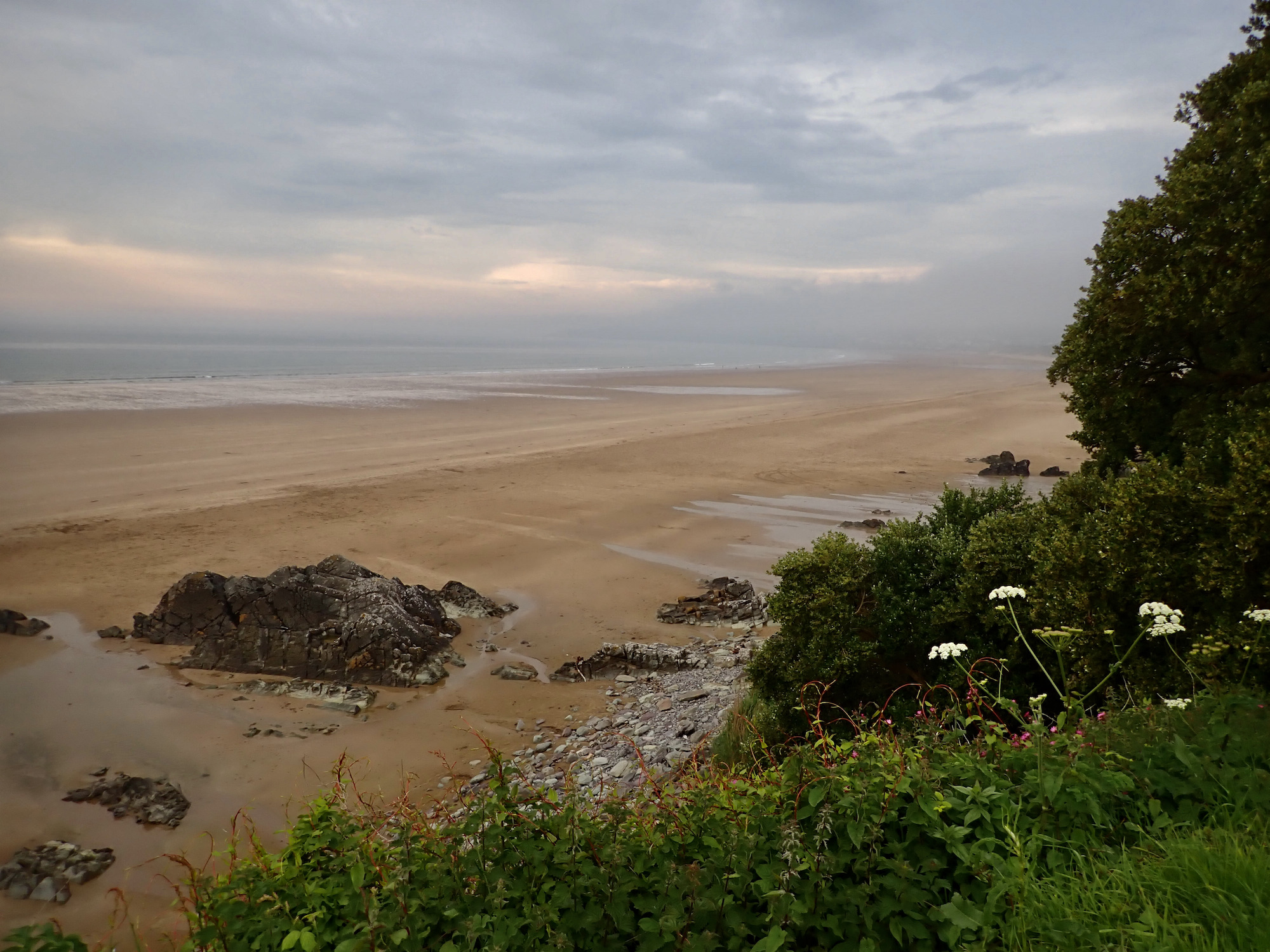
Anyway onto 2024 and after extensive publicising on social media, the local paper and my website North Devon Angling News the night had arrived and it seemed the weather was playing ball with light winds forecast and only the chance of a few showers. A little drama was as always introduced with a severe weather warning of thunderstorms until 8:00pm!
I arrived at the car park a few minutes after 7.00pm having picked up some quality frozen squid and sandeels from Braunton Baits. Nick was already setting up in the familiar corner of the car park. The sun was slowly setting the warm embers of the fading day reflecting upon a mirror calm sea.
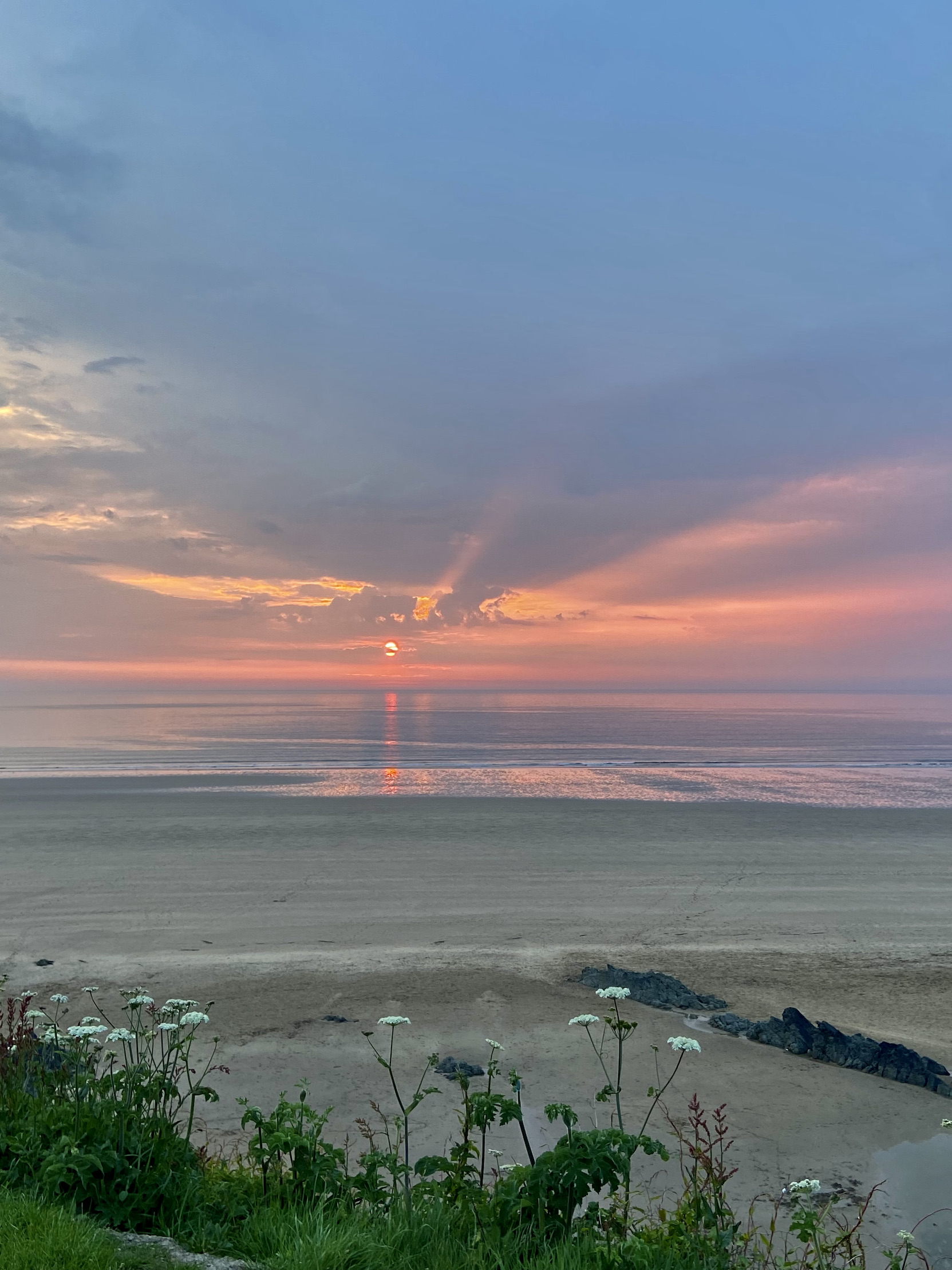
A few early arrivals were already taking rods from their cars keen to get booked in and off to secure a piece of beach. It was good to note that the sands were pretty much deserted as being slightly earlier than some years visitor numbers were not an issue.
Over the next hour a steady stream of familiar faces arrived along with a few newcomers. The atmosphere was convivial and friendly with prospects for the coming fishing very much unknown. I always find it fascinating to put a good number of anglers onto a beach and see what turns up. Every year is different with the odd surprise always on the cards.
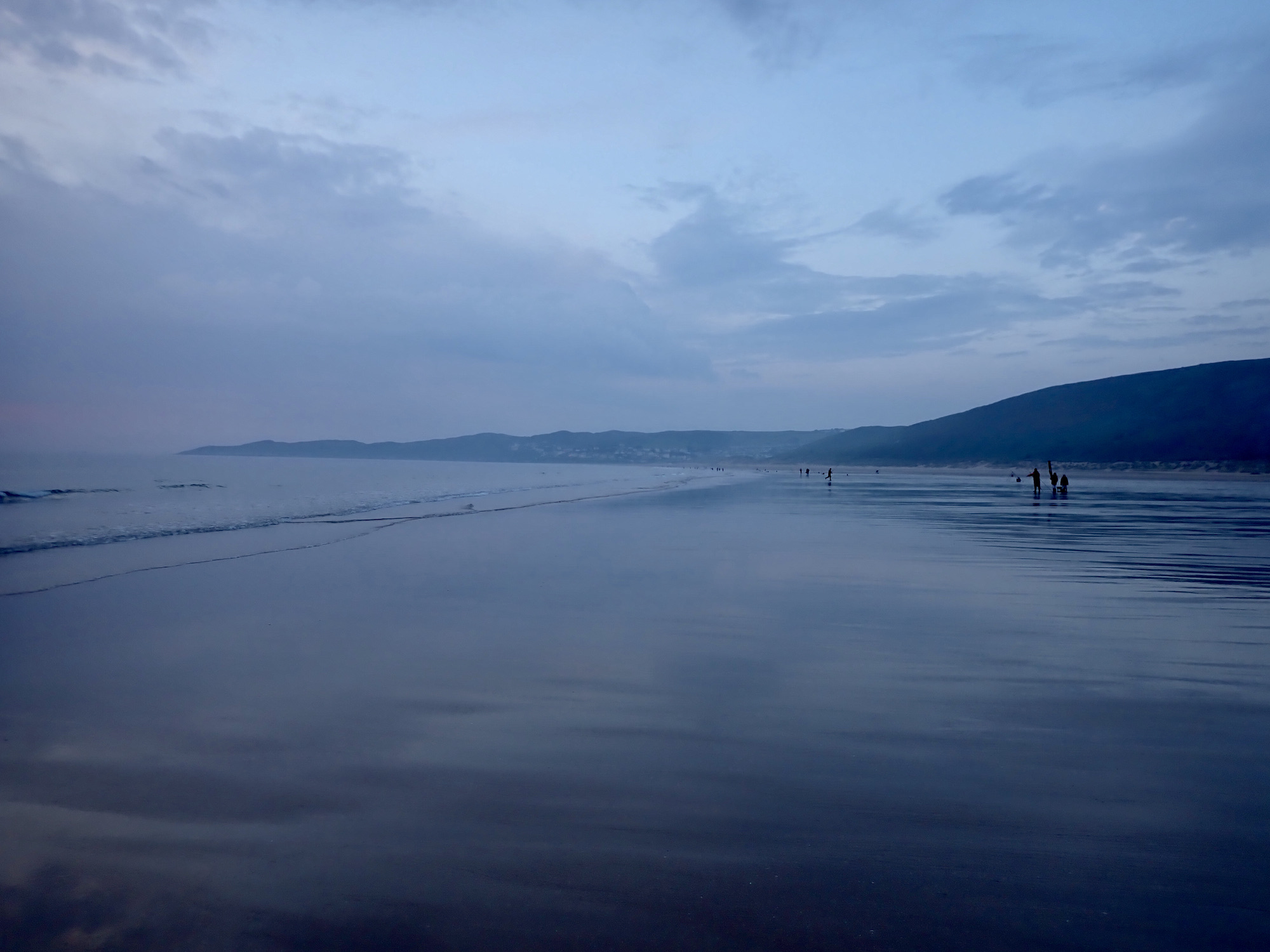
By cast off we had thirty competitors booked in and spaced out along the sands. This was perhaps slightly disappointing as in previous years we have at times exceeded fifty plus entrants. Last year had proved extremely successful as regards to fish numbers with the weigh in taking far longer than expected. Learning from this we have scrapped the best brace pool with a flat £10 entry with prizes awarded for the best single specimen fish. It was good to see two junior anglers taking part and we catered for them with two special prizes to award if they successfully tempted fish.
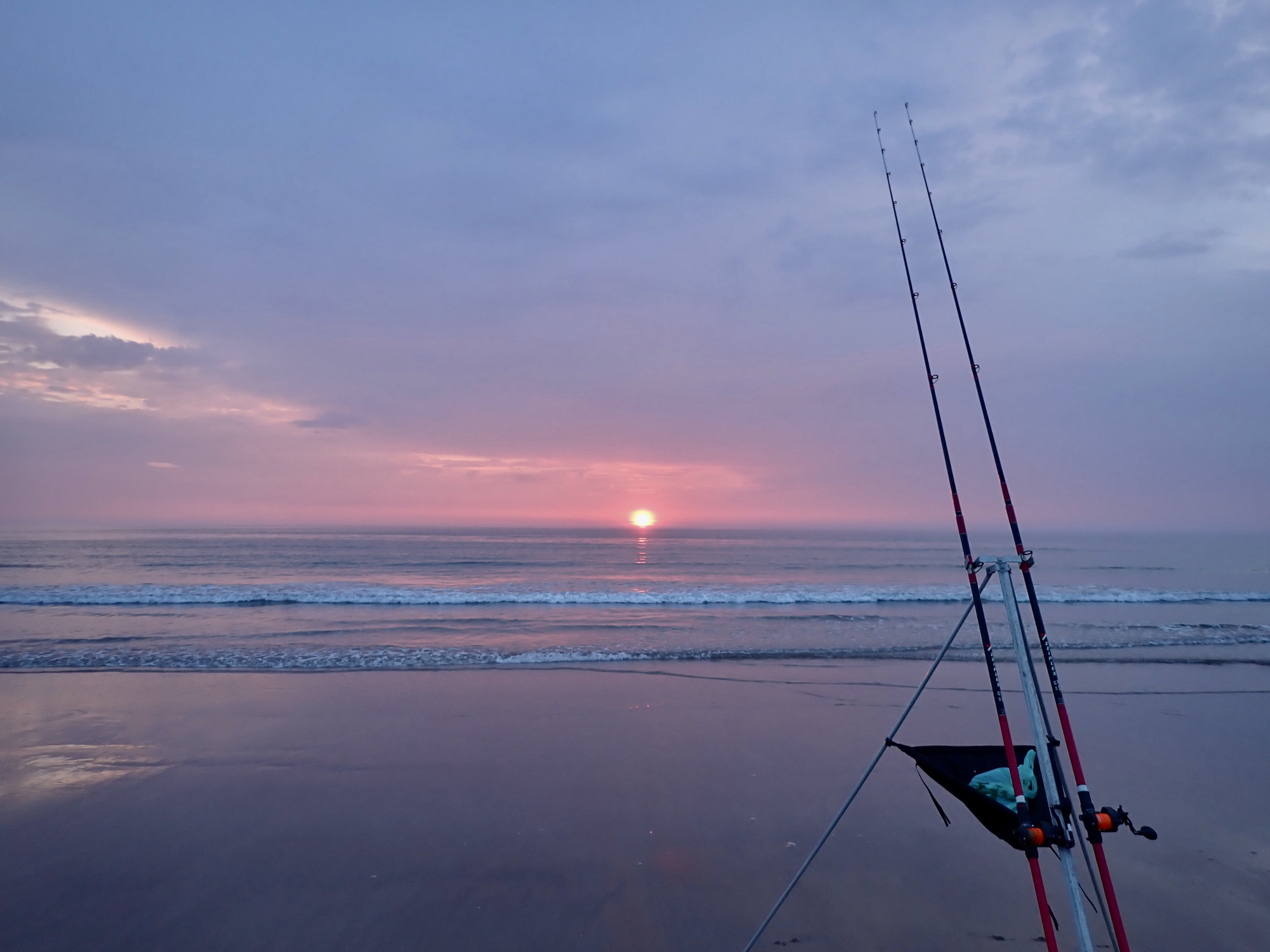
As the sun set dipping beneath the horizon baits were launched and rods set in readiness. Nick and I being organisers headed for the section of beach immediately below the car park an area that seldom results in winning catches. The winning fish generally coming from the central area of the beach where the water is shallower as the tidal pull undoubtedly pushes sand and food to accumulate and attract the hunting fish.
It was good to be back wading into the surf in the fading light. A gentle wave caressed the shore and I wondered what was swimming out in the dark waters.
An hour into the competition I heard excited calls from the right and walked over to where Lee Algar and his son and daughter were fishing. Eight year old Leo was engaged in a tussle with a good sized fish that was putting an impressive bend in his light beach caster. A good sized small eyed ray emerged from the surf to the delight of his proud father. At 6lb 11oz it was a pleasing start and ensured that he would get a prize for his sterling efforts. His sister Chloe went on to land dogfish and a plump bull huss of 3lb 6oz.
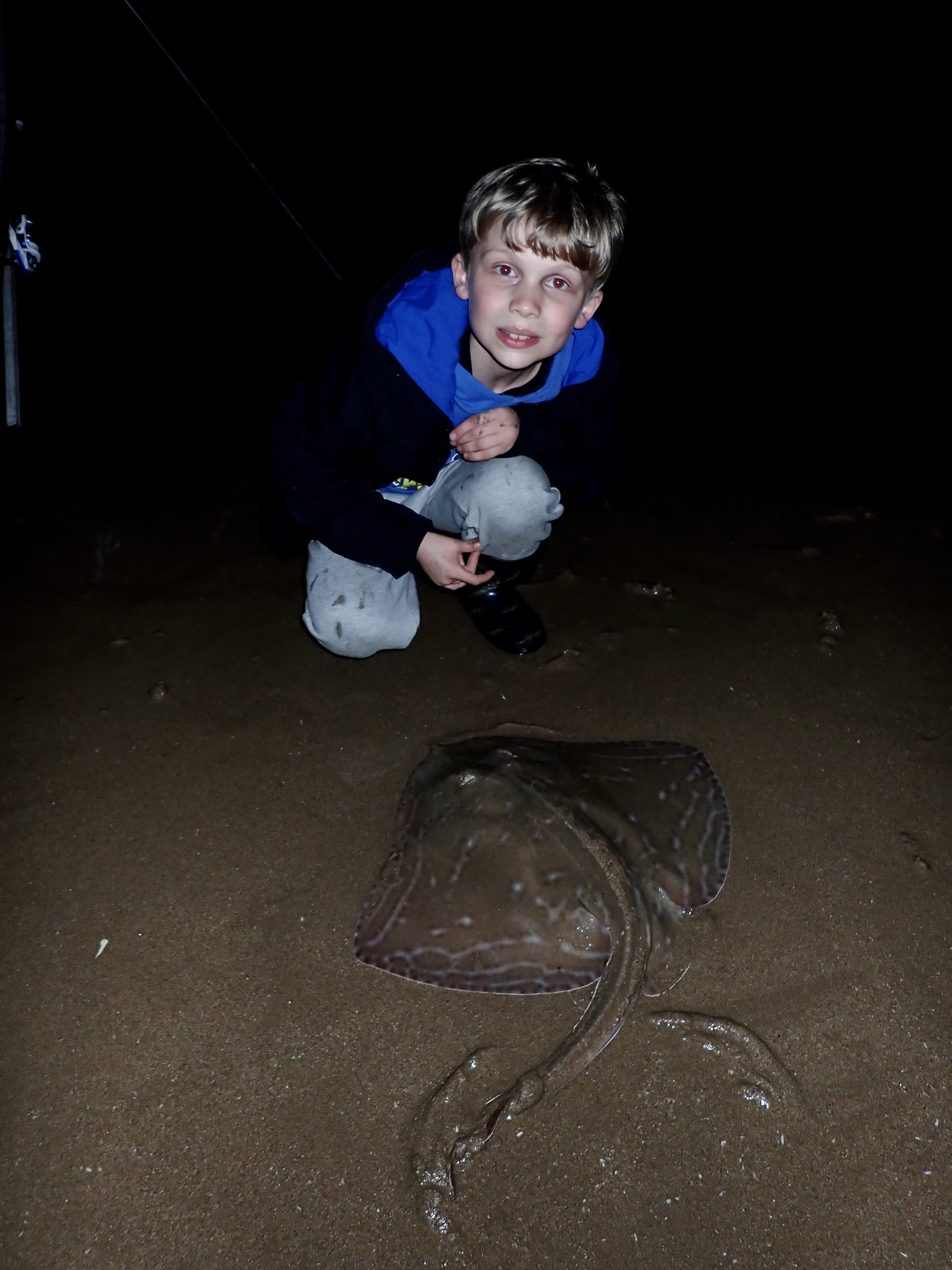
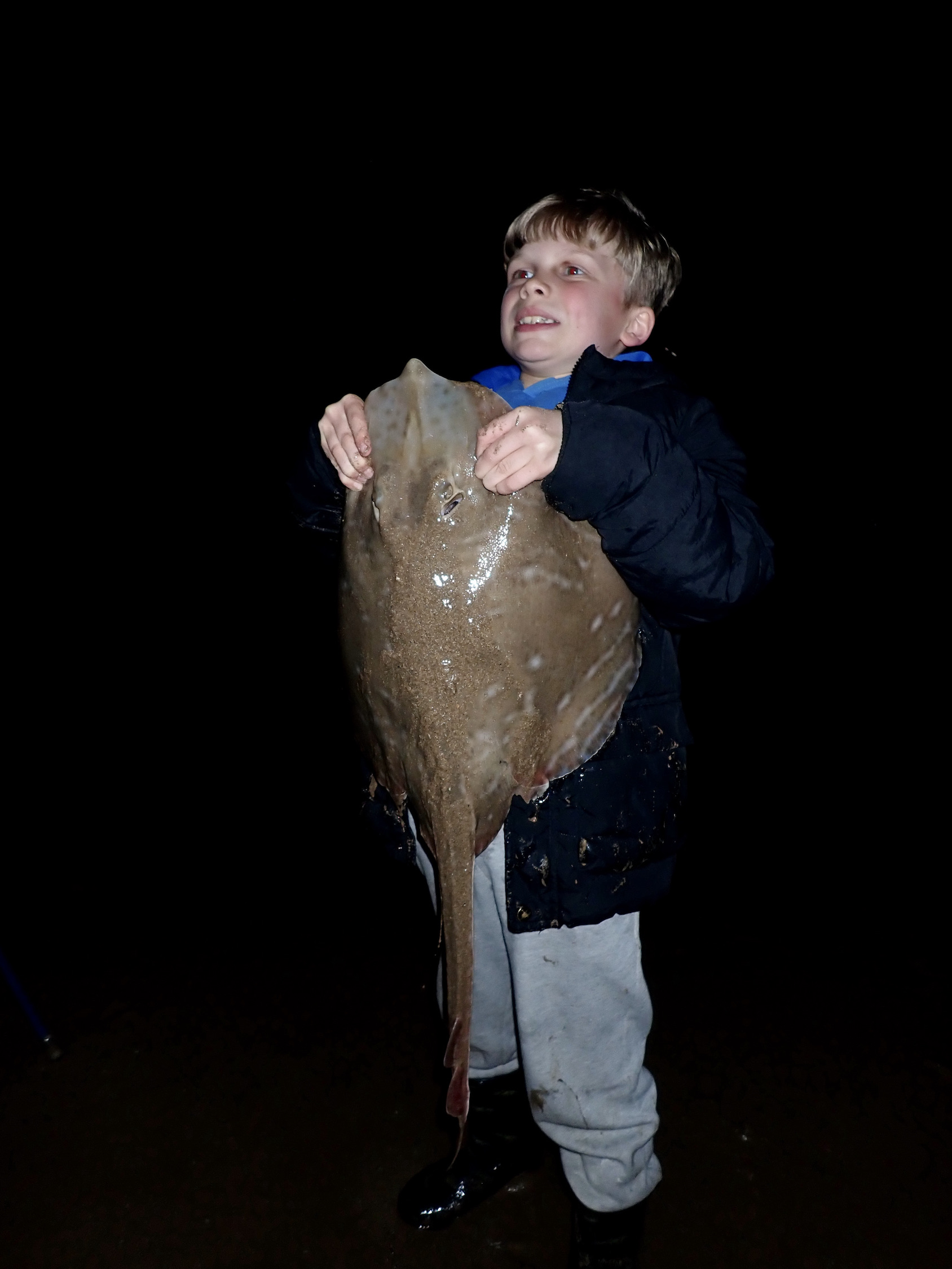
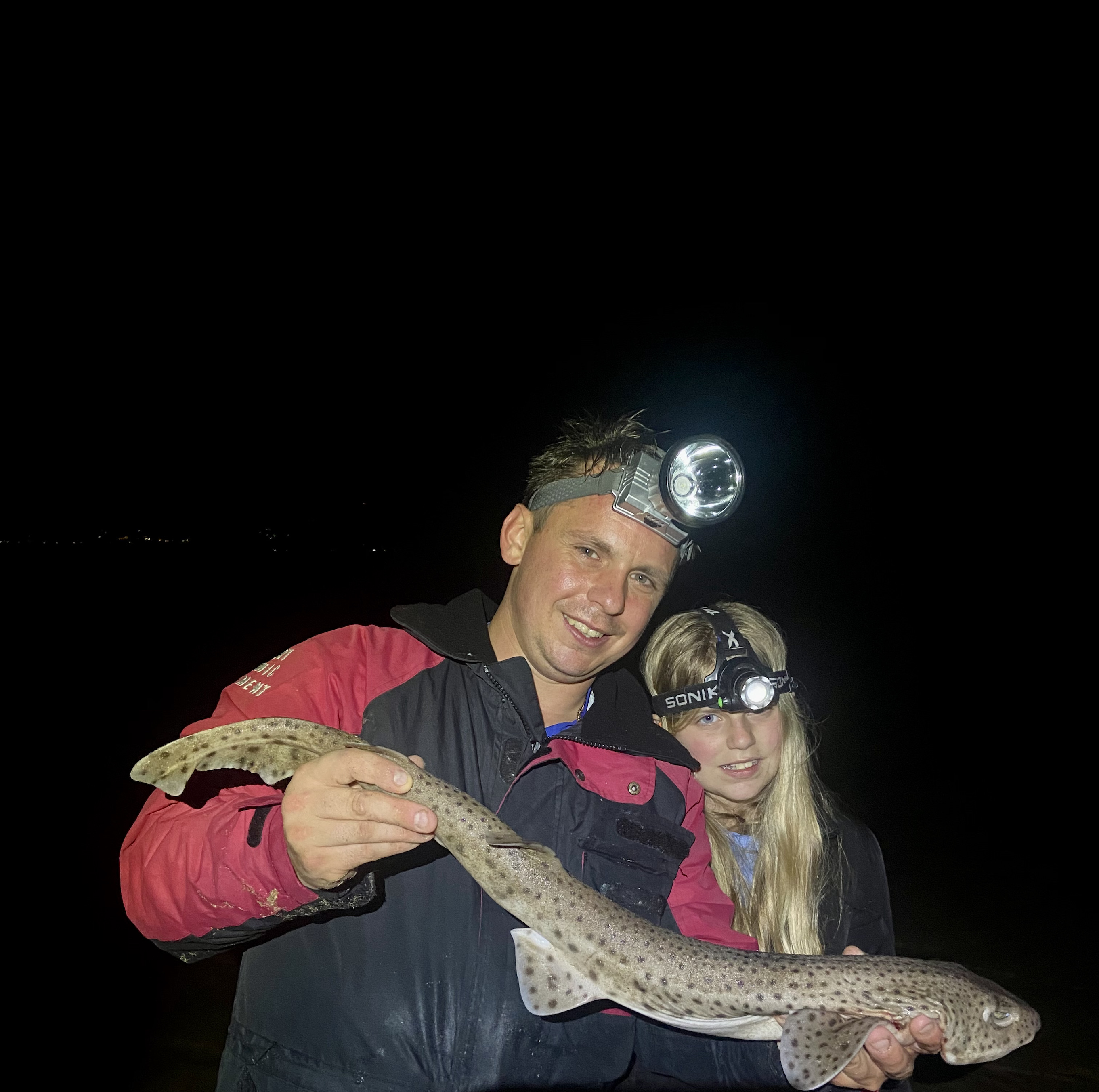
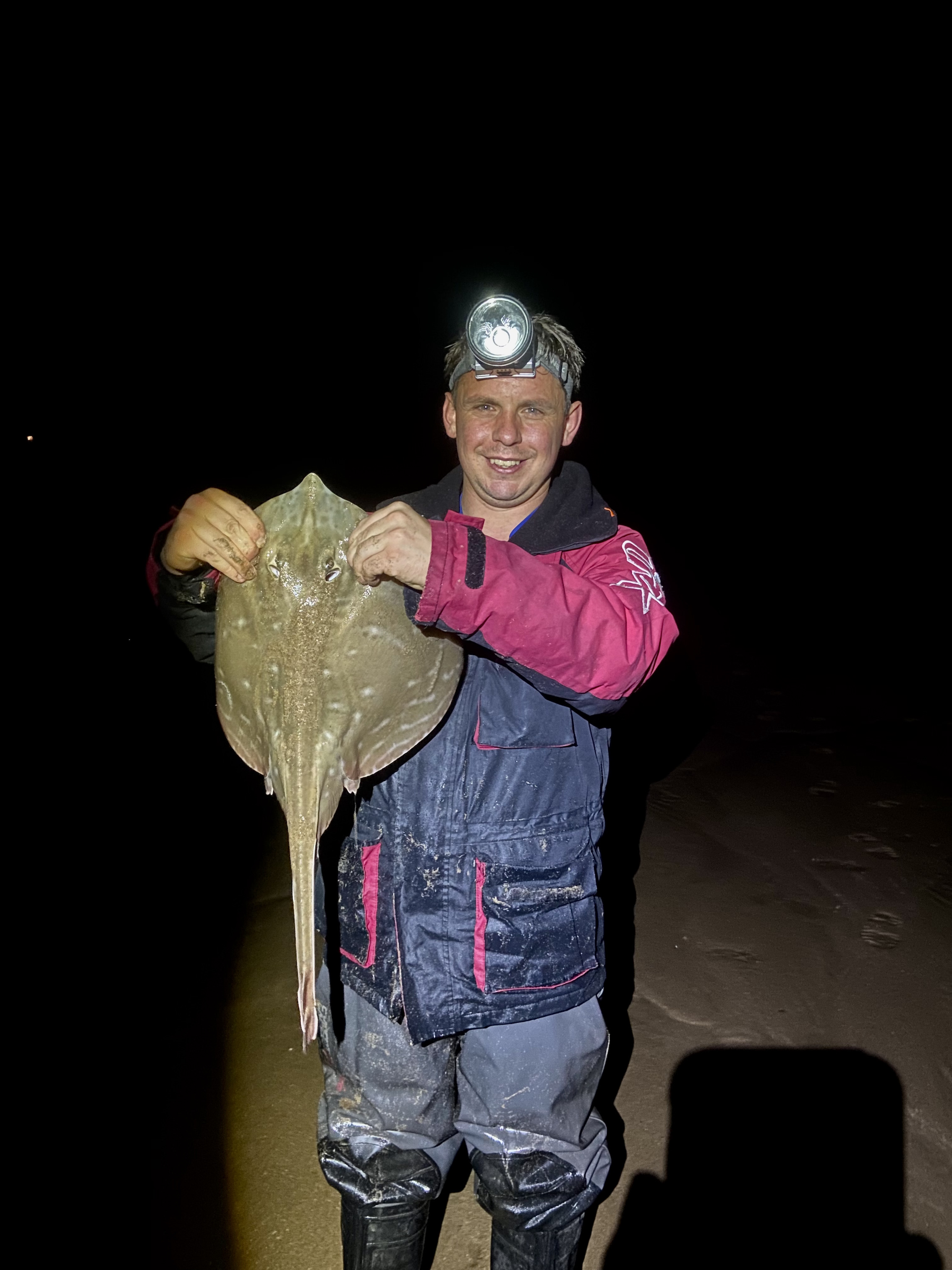
It was a joy to share the family’s triumph with dad catching several dogfish and a couple of small eyed ray.
Further along the beach I heard of several good fish being landed with small eyed ray of over 9lb beached within the first hour.
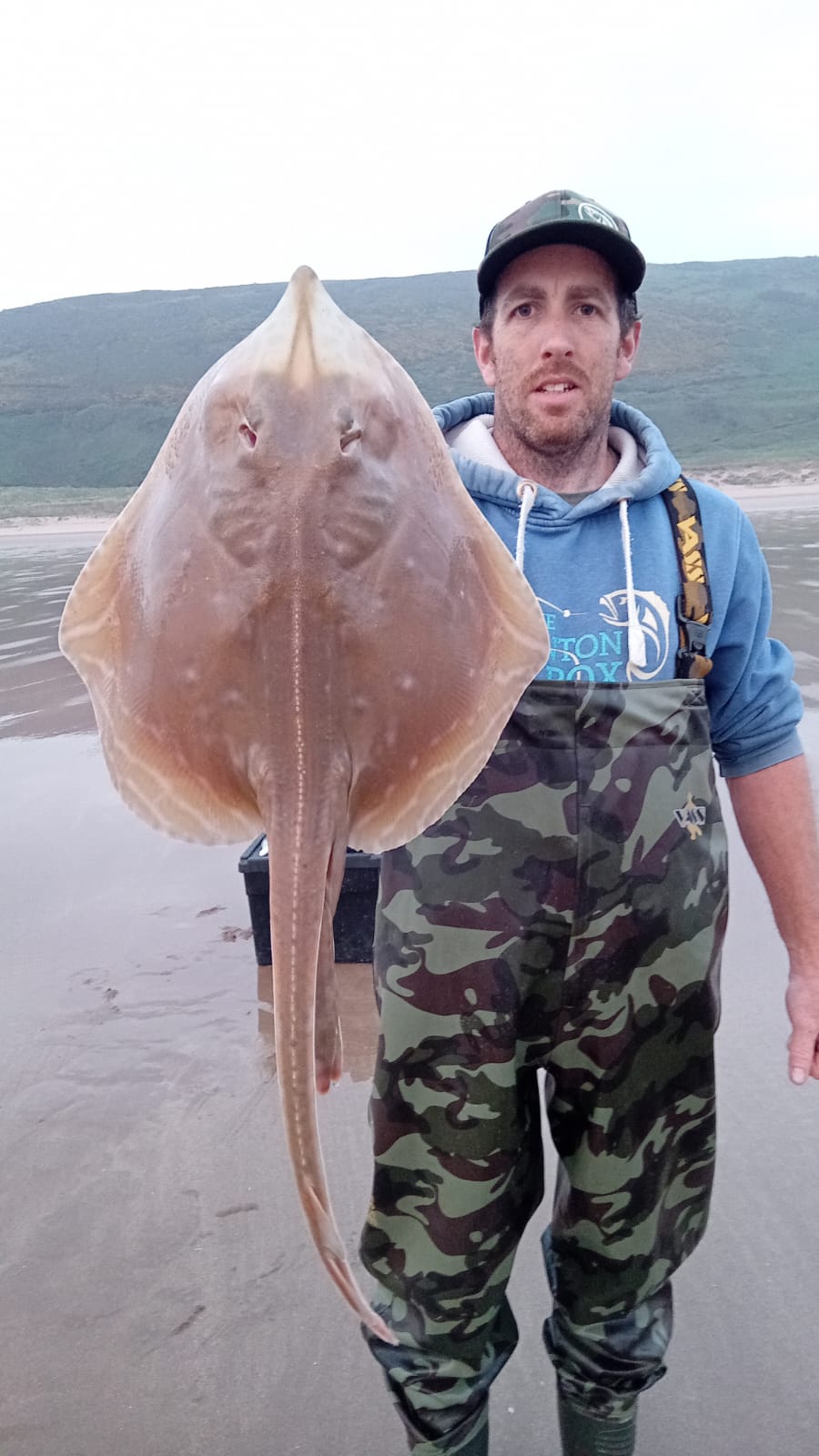
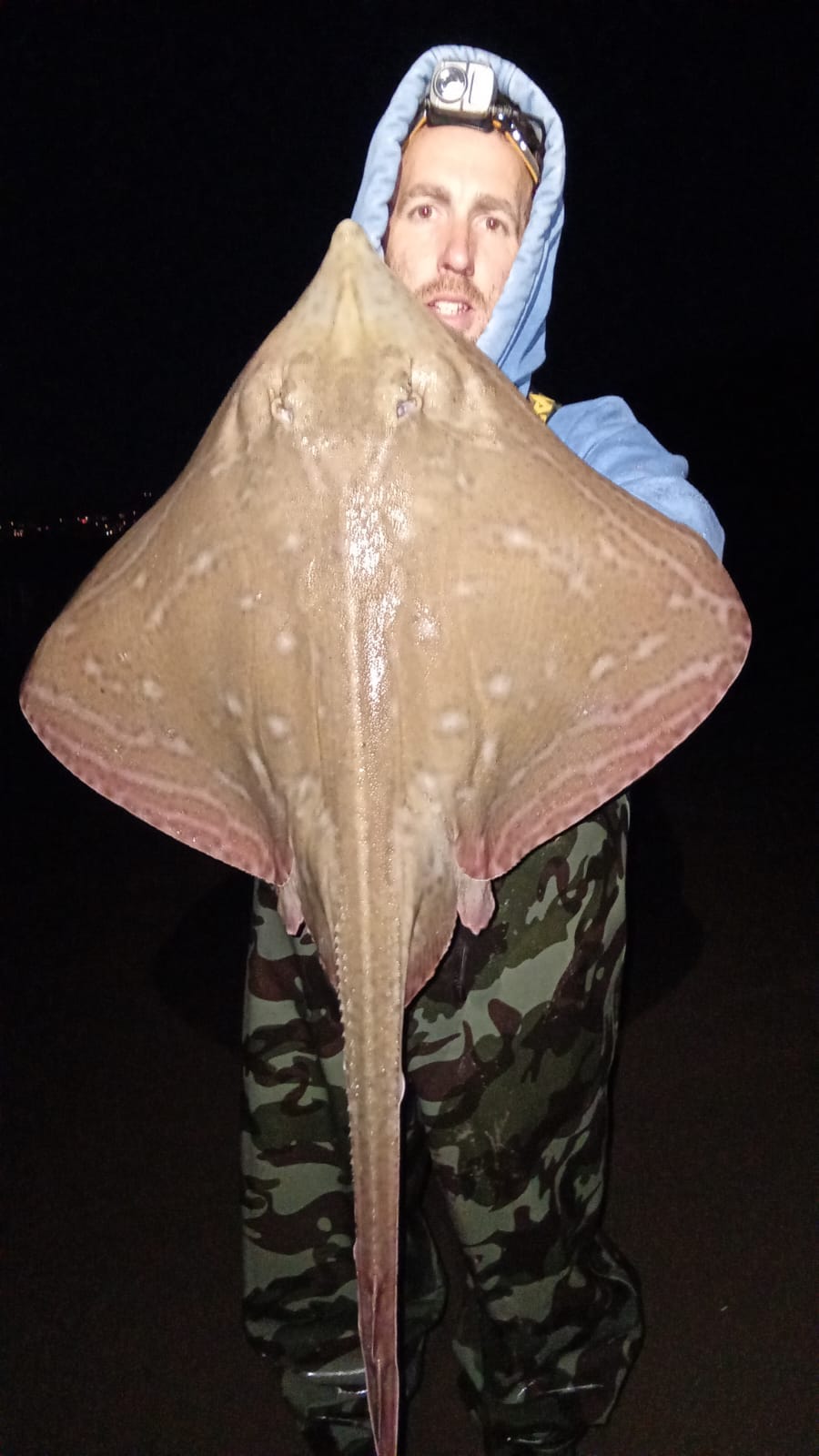
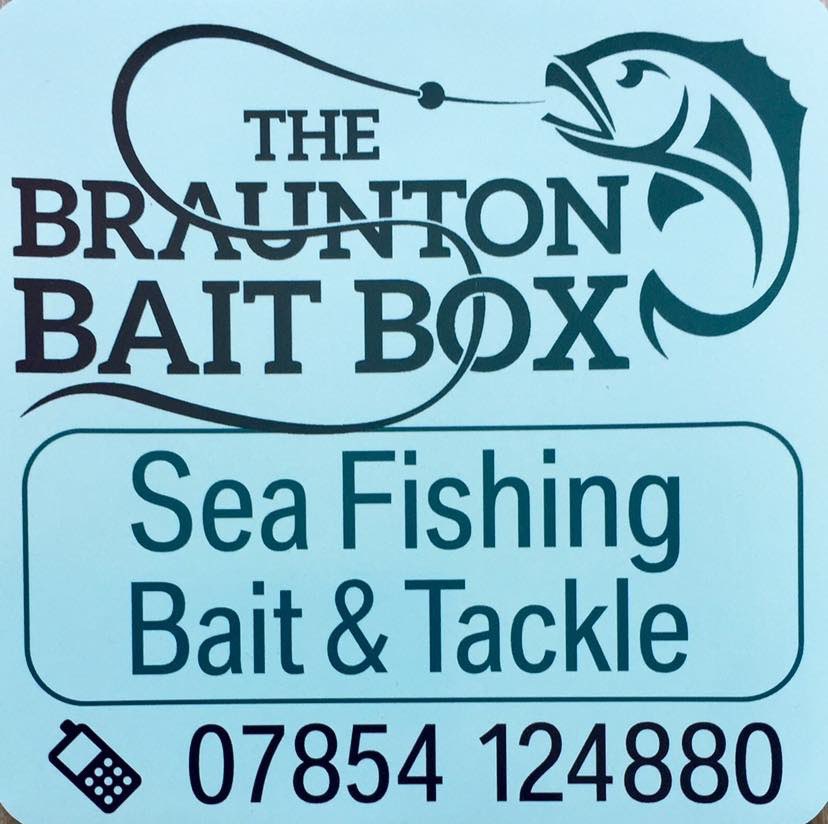
The four hours of fishing passed by all too quickly and we walked back to the meet up keen to find out what had been tempted.
In the last hour even I secured a catch my ratchet rasping into life as a small eyed ray of over 5lb took my bait.
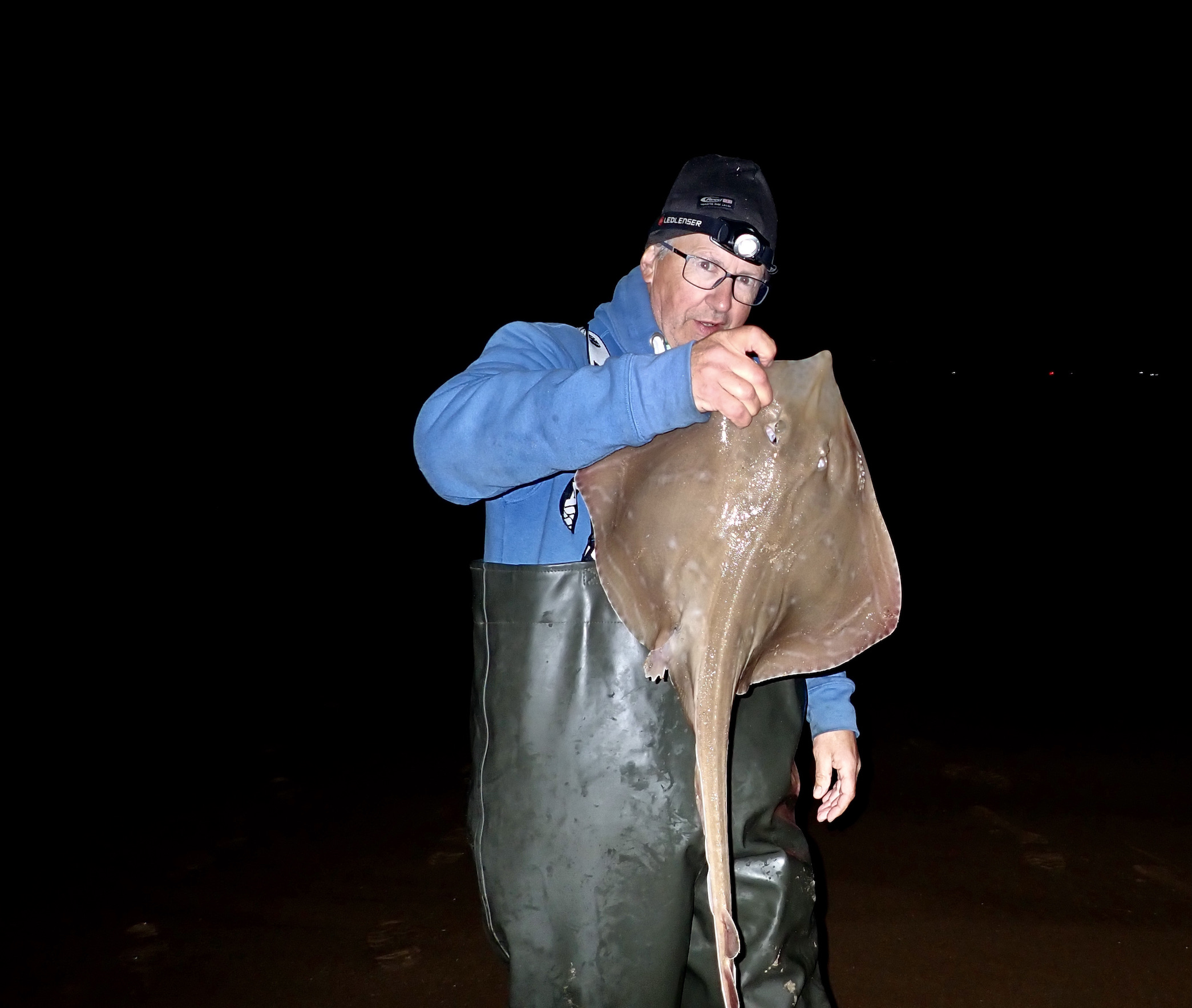
The prizes were set out in readiness on the papering table and Nick and I started to take the entry forms from competitors. It took a while to write down all the fish entries and work out each percentage point. In total close to forty fish were registered with many more fish not recorded as they would not make the grade required to secure a top ten place. Species caught included dogfish, smoothound, small eyed ray, blonde ray and turbot. Full results below.
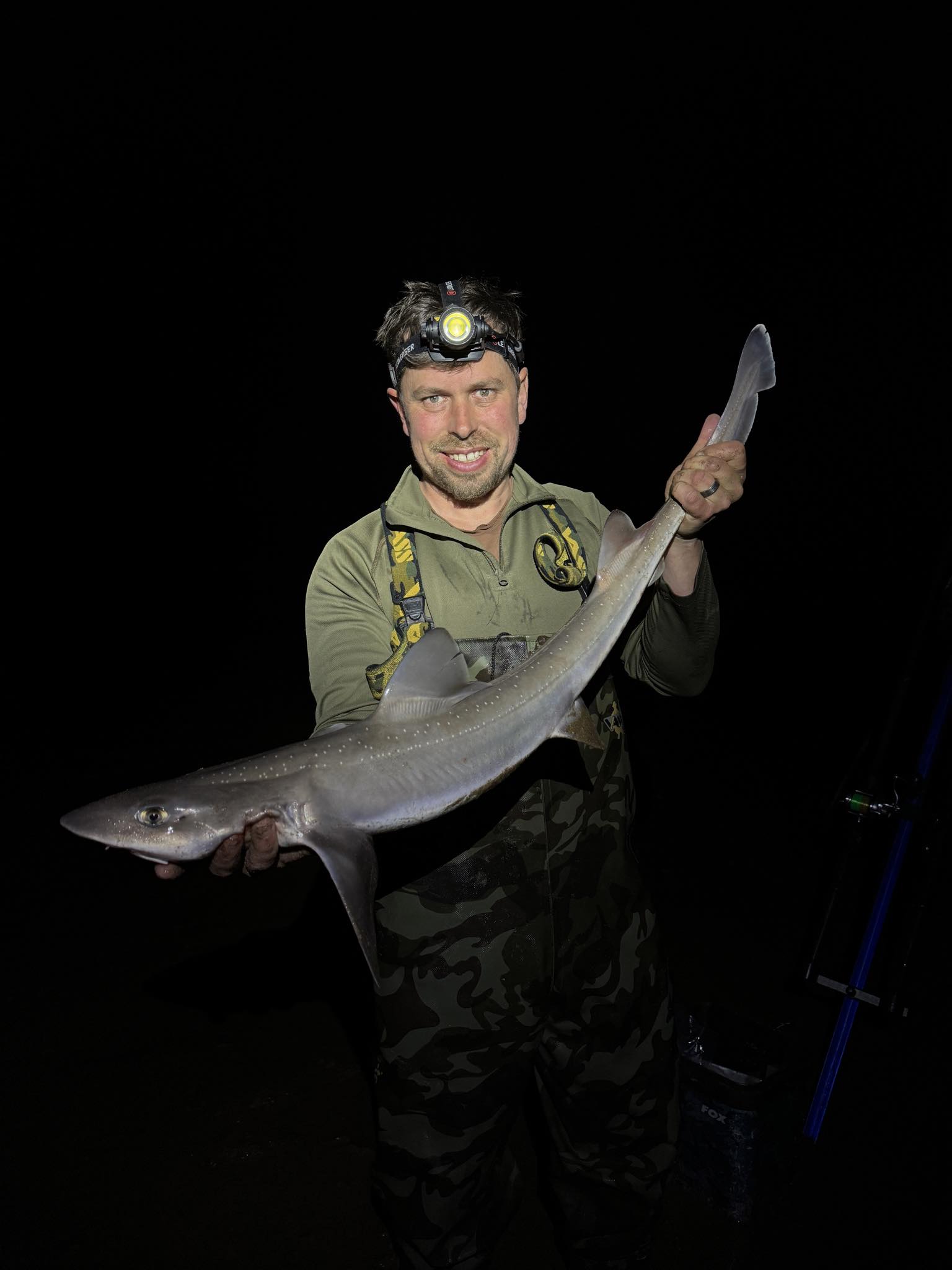
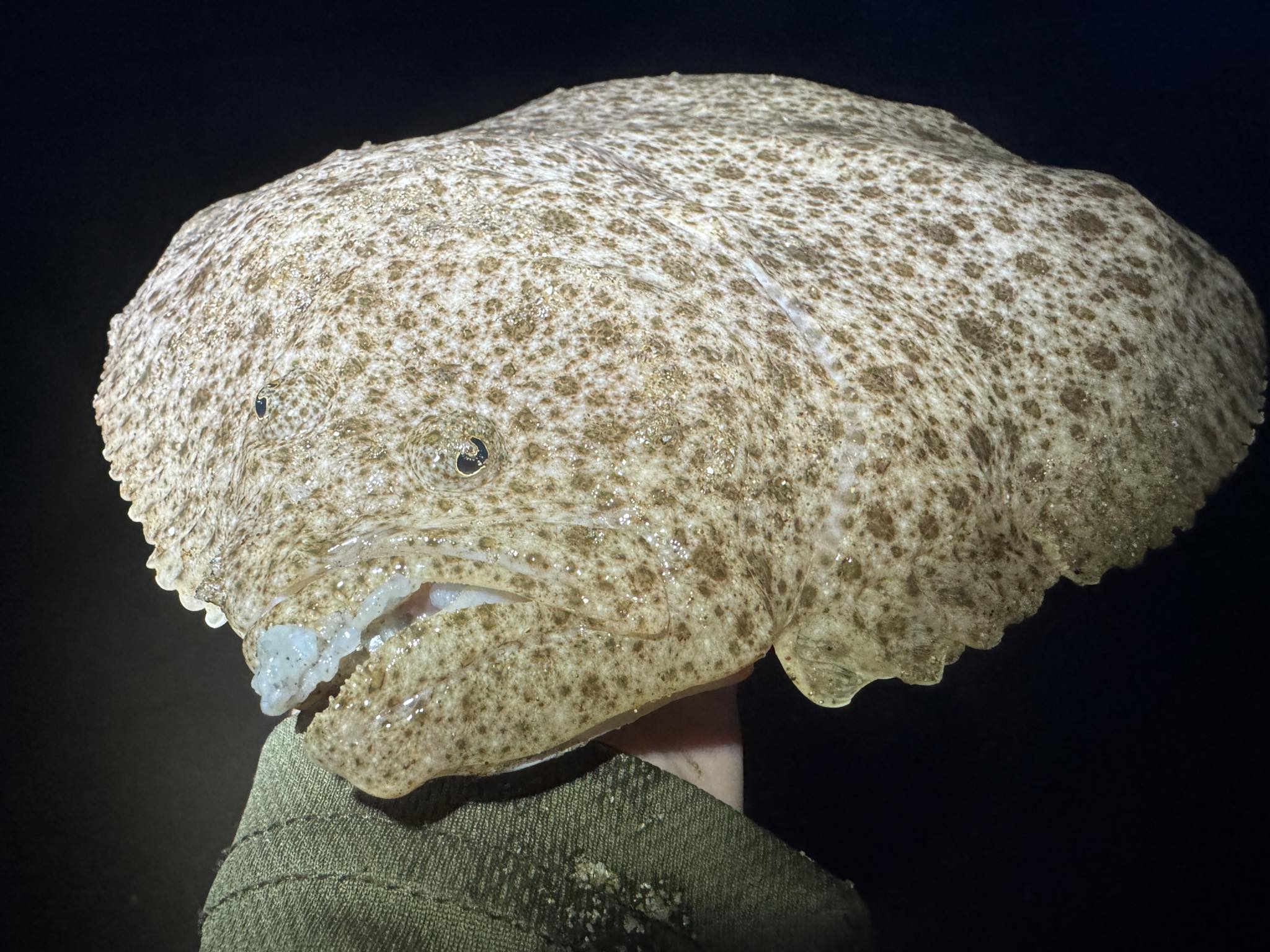
A turbot fior Daniel Welch
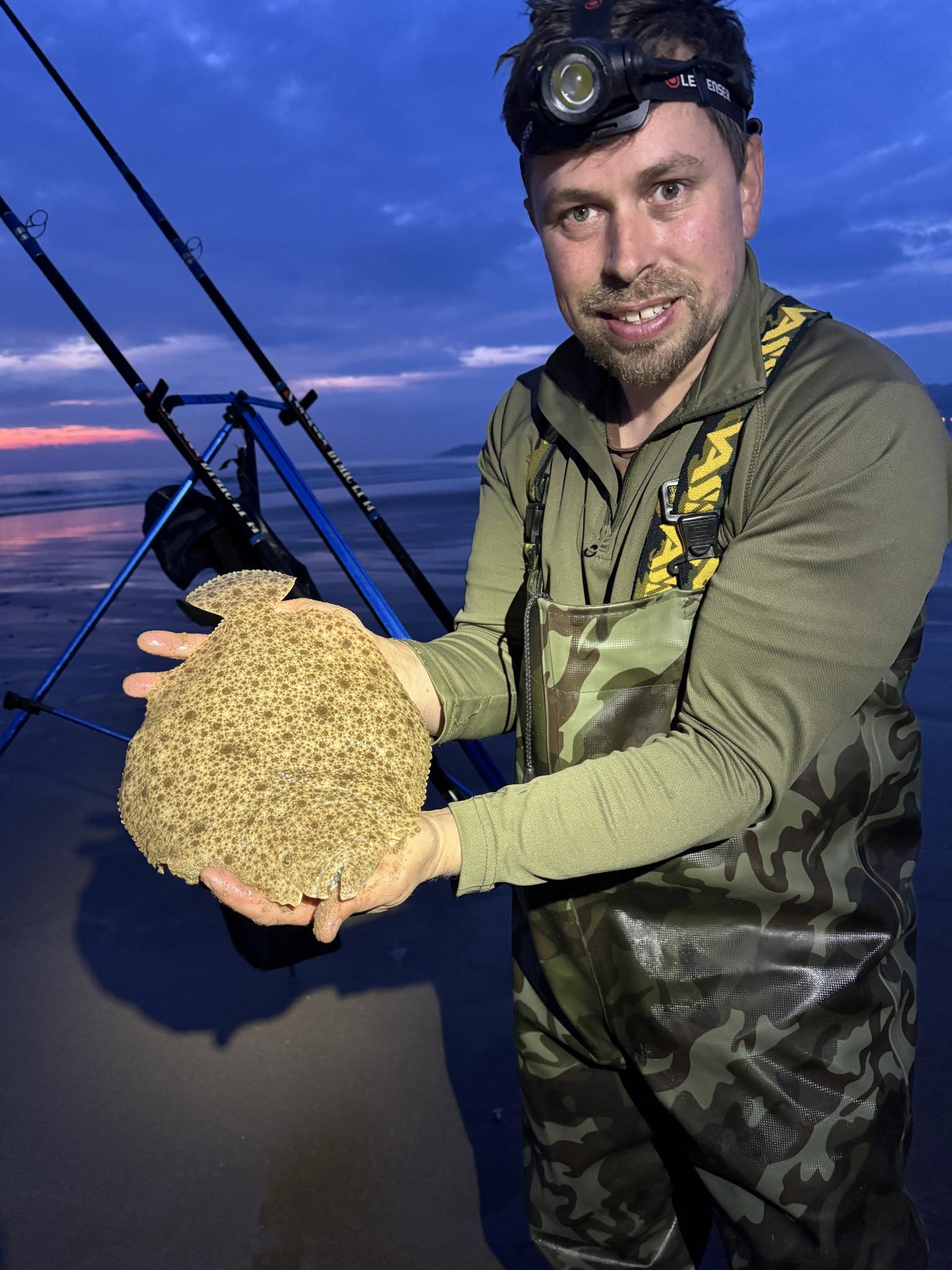
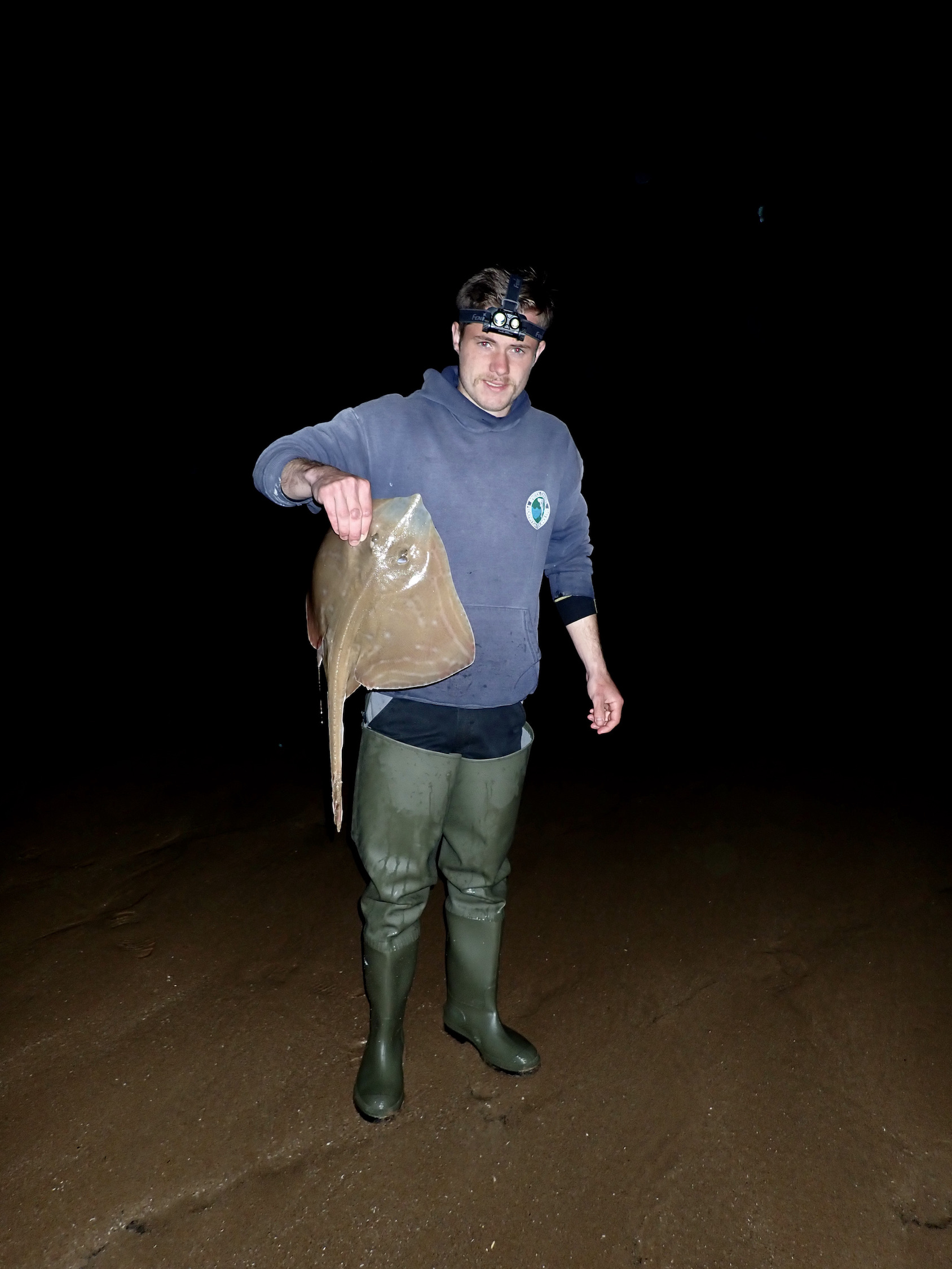
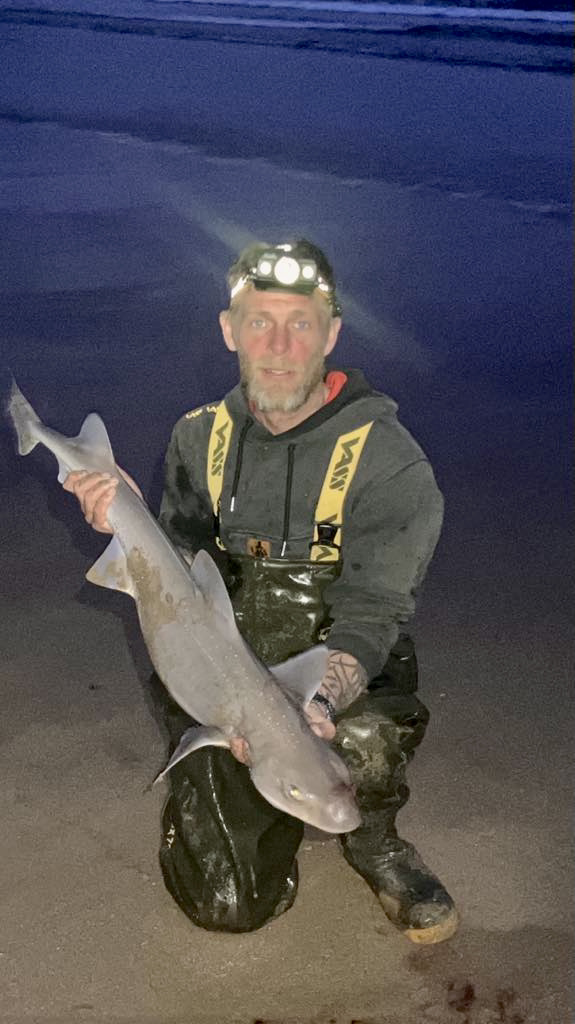
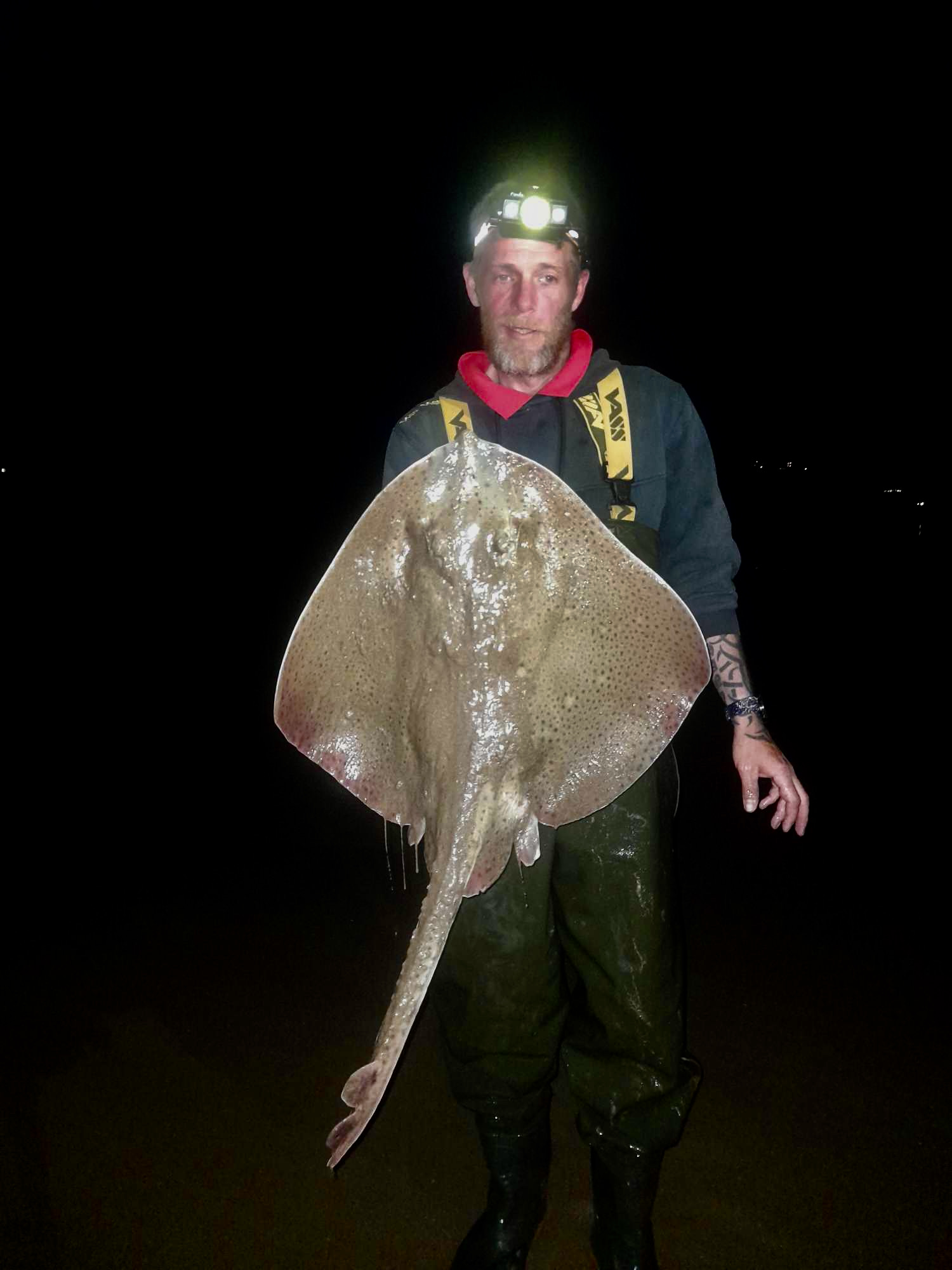
One pleasing conclusion from the results is that despite general gloom around fish stocks the truth is that some species are doing Ok. The catches over the past couple of years have been exceptionally good considering there have been years when we have worried in case nobody actually caught. Smoothound are undoubtedly far more prolific than in the past. I didn’t hear of any bass this year and over the years bass have been surprisingly absent from catch returns.
Combe Martin SAC are very grateful to the anglers that make the effort each year to fish this popular event in the local calendar. Many travel from Somerset and South Devon to take part with a long drive home afterwards in the early hours.
FULL RESULTS – Putsborough Open 2024
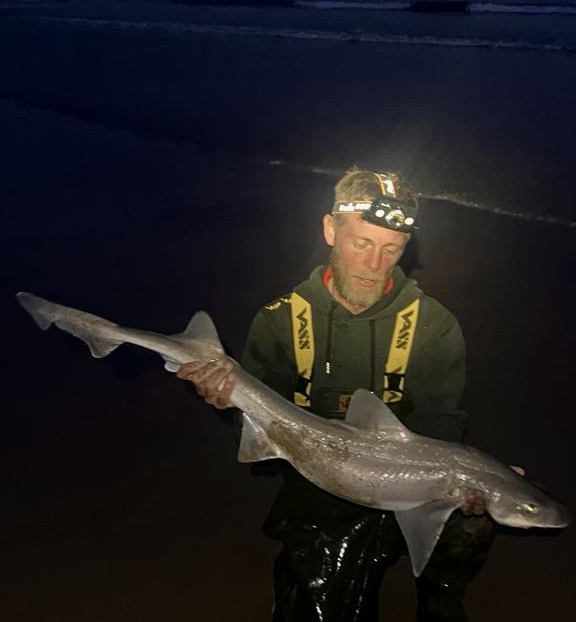
1st Simon Springell – smoothound – 12lb 2oz 121%
2nd Craig Mc Cloughlin – small -eyed -ray – 9lb 6oz 93%
3rd Simon Springell – blonde ray – 11lb 1oz 92%
4th Steve Liddle – smoothound – 8lb 12oz 87.5%
5th Matt Werbitzki – smoothound – 7lb 11oz 76.8%
6th – Tyrone Jones – smoothound – 7lb 10oz 76.25%
7th – Mike Squires – small-eyed-ray – 7lb 6oz 73%
8th = Phil Vanstone – small eyed ray – 7lb 1oz 70%
8th = James Waygood – small-eyed-ray – 7lb 1oz 70%
9th – Gareth Peach – small-eyed-ray – 6lb 13oz 68%
10th – Simon Springell – small-eyed-ray – 6lb 11oz
Top Junior
1st – Leo Algar ( Age 8)– small-eyed-ray 6lb 11oz
2nd – Chloe Algar (Age 10) – bull huss 3lb 6oz
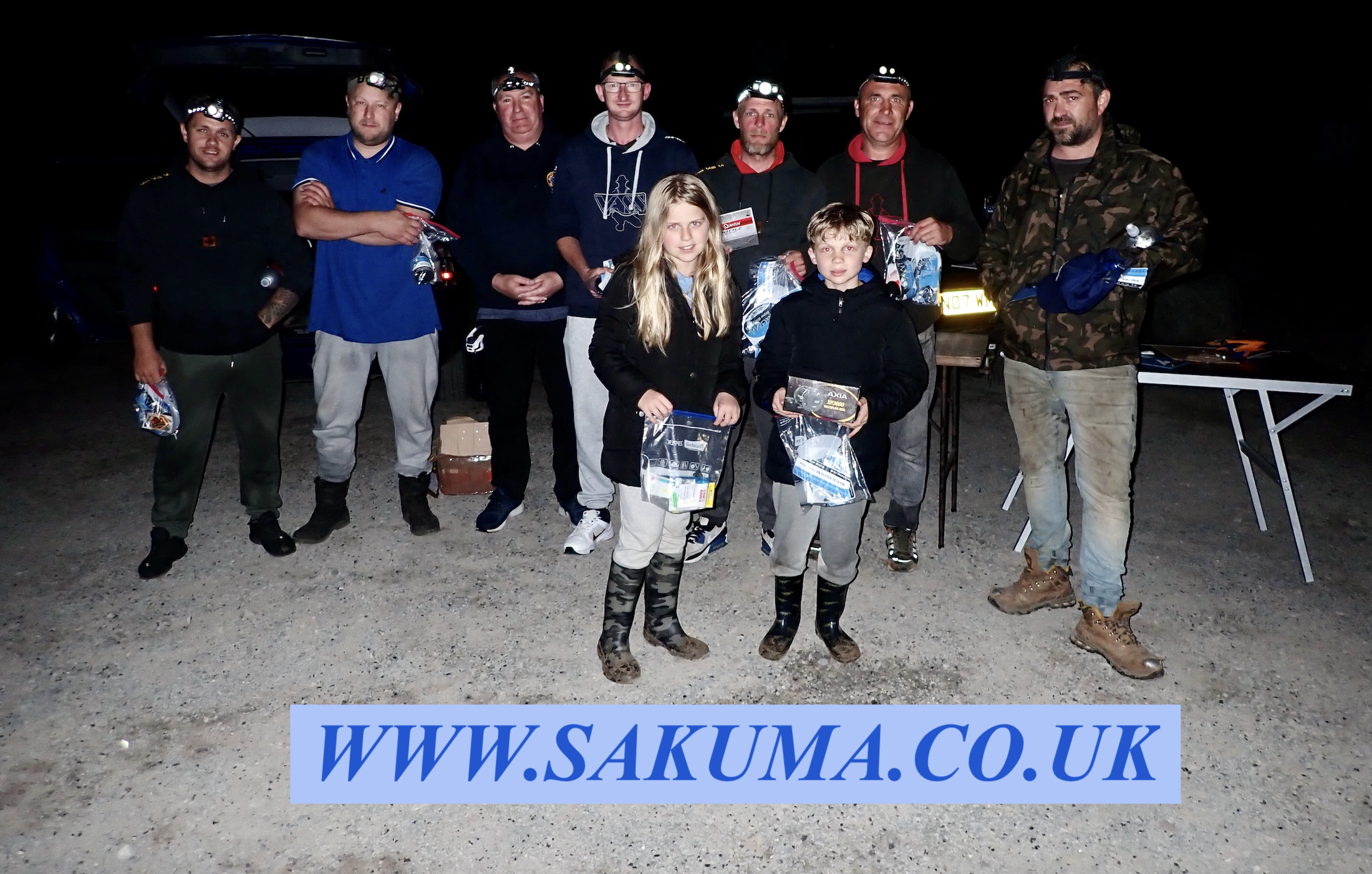
Fading Silver
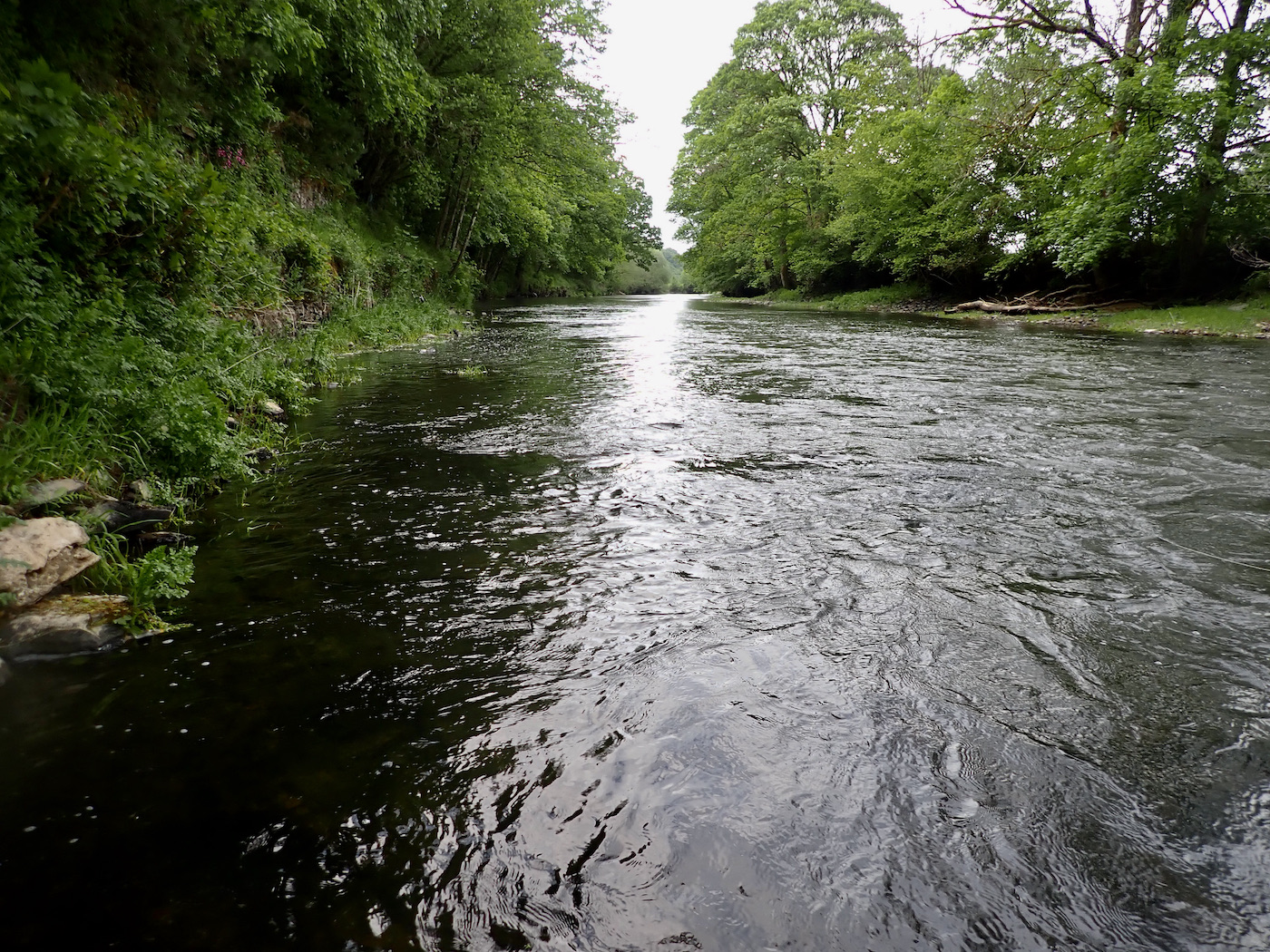
It’s almost Mid-May and the evenings are long with dusk now lingering well past 9.00pm. I always seem to be caught out not fully appreciating the onset of Summer realizing all too soon that it’s getting towards the longest day and that those days will once again start to shorten. In the words of that Pink Floyd song;
Staying home to watch the rain
You are young and life is long
And there is time to kill today
And then one day you find
Ten years have got behind you
No one told you when to run
You missed the starting gun
I arrived at the fishing hut early evening pleased to be at the beat for only the second time this season. I was half expecting there to be another angler fishing but I had the fishing to myself. I had brought my salmon rod and a light trout rod just in case the trout were rising and could be tempted on a dry fly.
The river looked to be in fine fettle a perfect height and good clarity. I watched the river carefully for signs of life but no fish moved.
I left the trout rod in the hut and approached the water’s edge extended a line across the water and drifted a silver stoat’s tail across the river. I made my way carefully negotiating the slippery rocks coated in slimy algae. My casting could be better I thought, no sweet rhythm this evening.
After a few steps I was startled by a head appearing just a couple of feet from the rod tip. The large otter rolled again a further few yards down river. There are some who curse the otter for it predates upon the salmon and sea trout. I take a slightly different view for whilst I fear for the salmon I accept that otters have hunted this river for centuries. There was once an abundance of salmon in this beautiful river more than enough for angler and otter.
I feel sure that if I had stood on this river bank just thirty years ago salmon and sea trout would be leaping from the water crashing back with loud splashes that would fuel the anticipation.
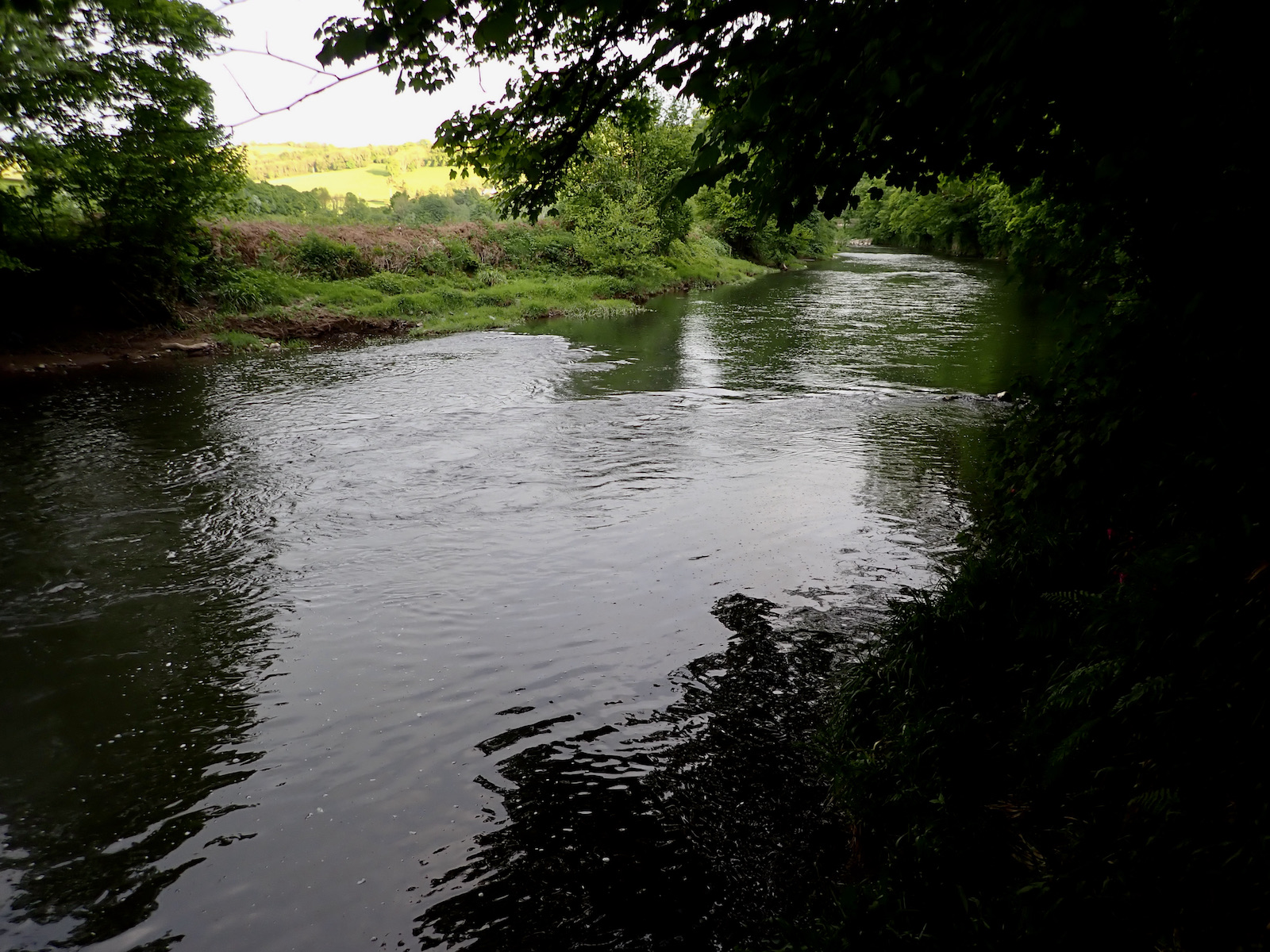
This evening the ever flowing river heads to the estuary and the ocean beyond. During my two hours I drift my fly in fading hope. There are no glimpses of silver, the river banks are lush and green. The scent of wild garlic drifts in the warm evening air. But despite the natural beauty all around I cannot help but dwell upon the lack of salmon and sea trout. As a young angler I assumed the salmon and sea trout would always run the river or at least throughout my lifetime. Sadly I realize that this may not be so as the actions of mankind decimate the natural world and in particular the rivers those arteries of the land.
In recent months I have been involved in the screening of the film Riverwoods to audiences across North Devon. The film suggests solutions to the demise of salmon. After the film I give a presentation about salmon decline in the South West and beyond. I talk of the plight of salmon, their decline in my lifetime and suggest ways that we can all delay their route to extinction.
I ponder upon the salmon’s plight as I pack away my tackle. The angler, the otter and the salmon are all perhaps on borrowed time unless we act to bring our rivers back to life.
As I step from the River I again see the Otter heading back up river where Henry Williamsons fictional Tarka may well have swum. I read the tale recently a book that records a time of abundance full of cruelty but all within a more balanced natural world before a burgeoning population brought us to our present place in history.
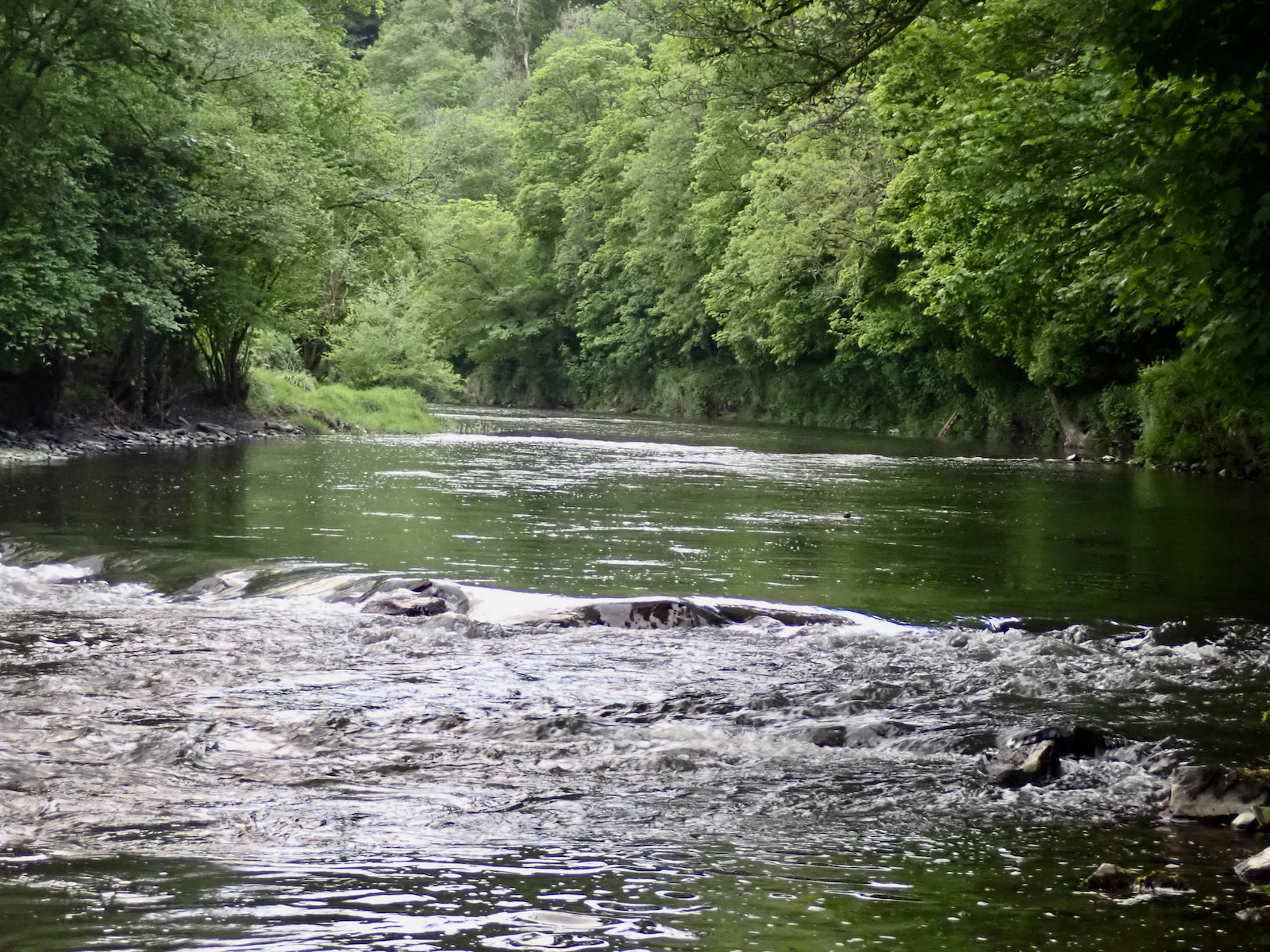
And you run and you run to catch up with the sun but it’s sinking
Racing around to come up behind you again
The sun is the same in a relative way but your older
Shorter of breath and one day closer to death
My next trip to the river will be to the higher reaches where the water still glistens running clear with vibrant beautiful crimson spotted brown trout in abundance.
Fishing is good for the soul and we really need to celebrate the wonderful nature that we still have around us. The fleeting glimpse of electric blue as a kingfisher flashes past. The swooping swift, the evocative call of the cuckoo, the cheerful chirp of the chiff chaff.
That great Countryside writer BB’s books include the rather poignant words.
The wonder of the world, the beauty and the power, the shapes of things, their colours, lights and shades, these I saw, Look ye also while life lasts
I wonder what BB would make of today’s world?
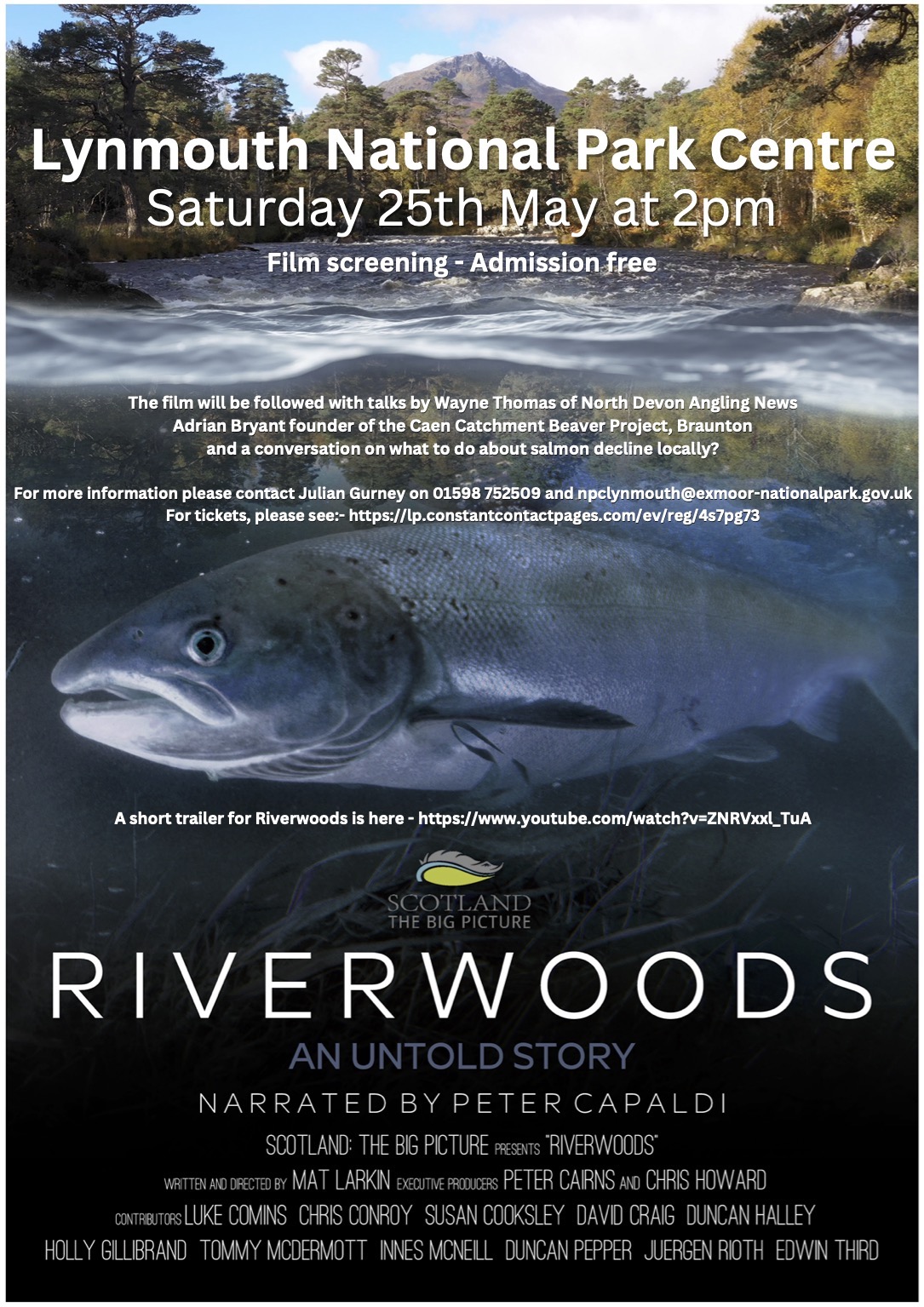
COMBE MARTIN SAC Lure League Update
Out of Minehead – Ray and hounds with CMSAC
After several aborted trips due to bad weather it was good to eventually get back out to sea on a Combe Martin SAC boat trip out of Minehead with Steve Webber skipper of Osprey Charters. As a club we have been fishing with Steve for many years a skipper who has provided us with some exciting fishing trips over the decades.
On this day we had six anglers on board two of which are good friends who kindly came along filling vacant places left by club members who could not make the trip.
The forecast for once promised calm seas, light winds and perhaps a little sunshine!
The boat was due to sail from the harbour at 10:30am so a rendezvous at the Minehead Witherspoon’s was arranged at 9:00am. This proved an unwise move in some ways as discussing the days fishing prospects over a full English was difficult as it appeared that Butlins stags had invaded in numbers. Alcohol in quantity at 9:00am certainly fuelled the volume making hearing a little challenging for those of us who have impaired hearing. Like many anglers we are getting on a bit!
And so we climbed onto Osprey all pleased to be leaving the raucous delights of Minehead to the young Butlin brigade.
Steve welcomed us with an ever cheery greeting and we set off for familiar fishing grounds to the West of Minehead. The tide was ebbing as Steve dropped anchor at the first mark. The steep wooded cliffs were lush and green. The sea a pleasing calm beneath a blue sky interspersed with light white cotton wool clouds.
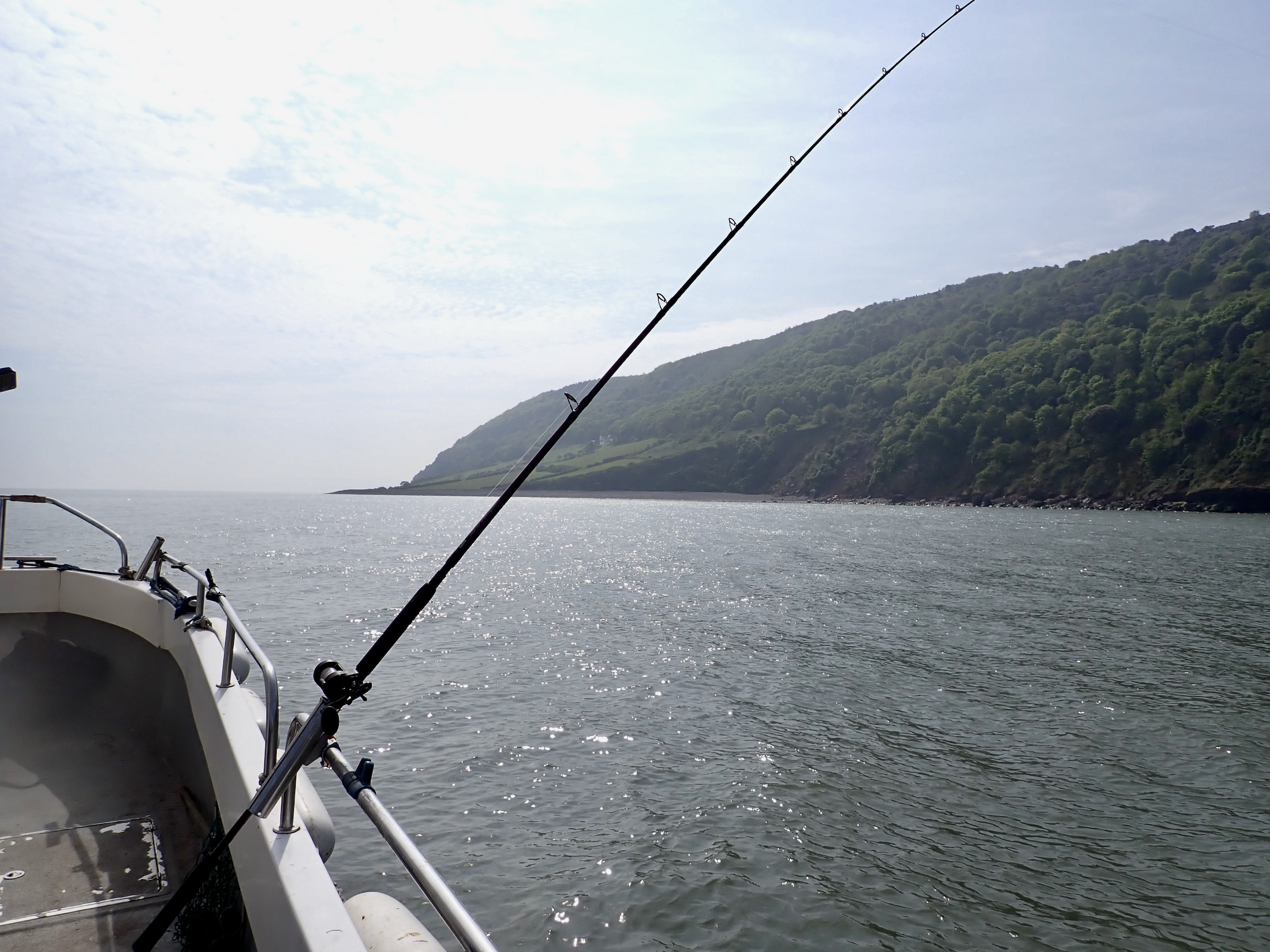
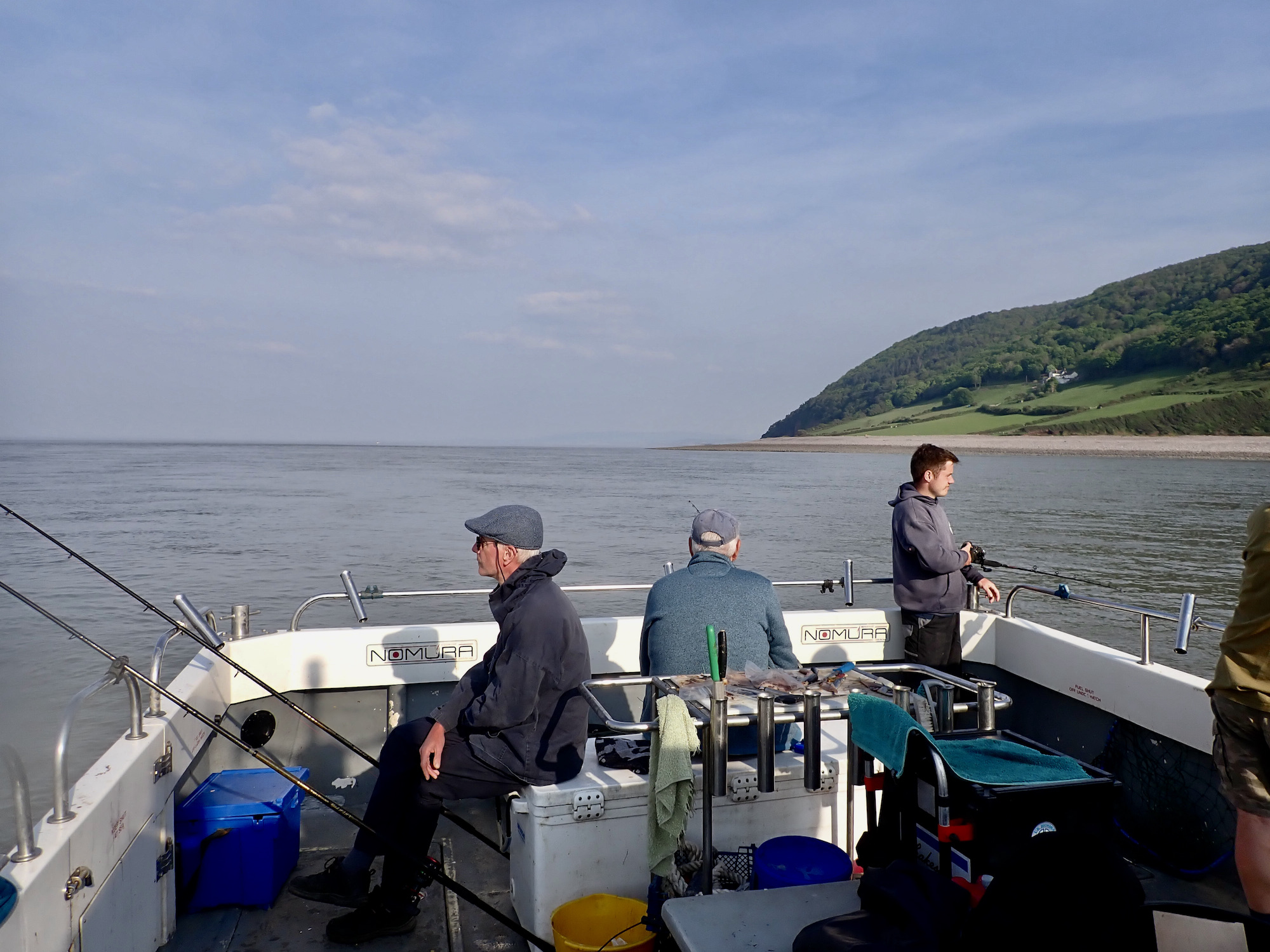
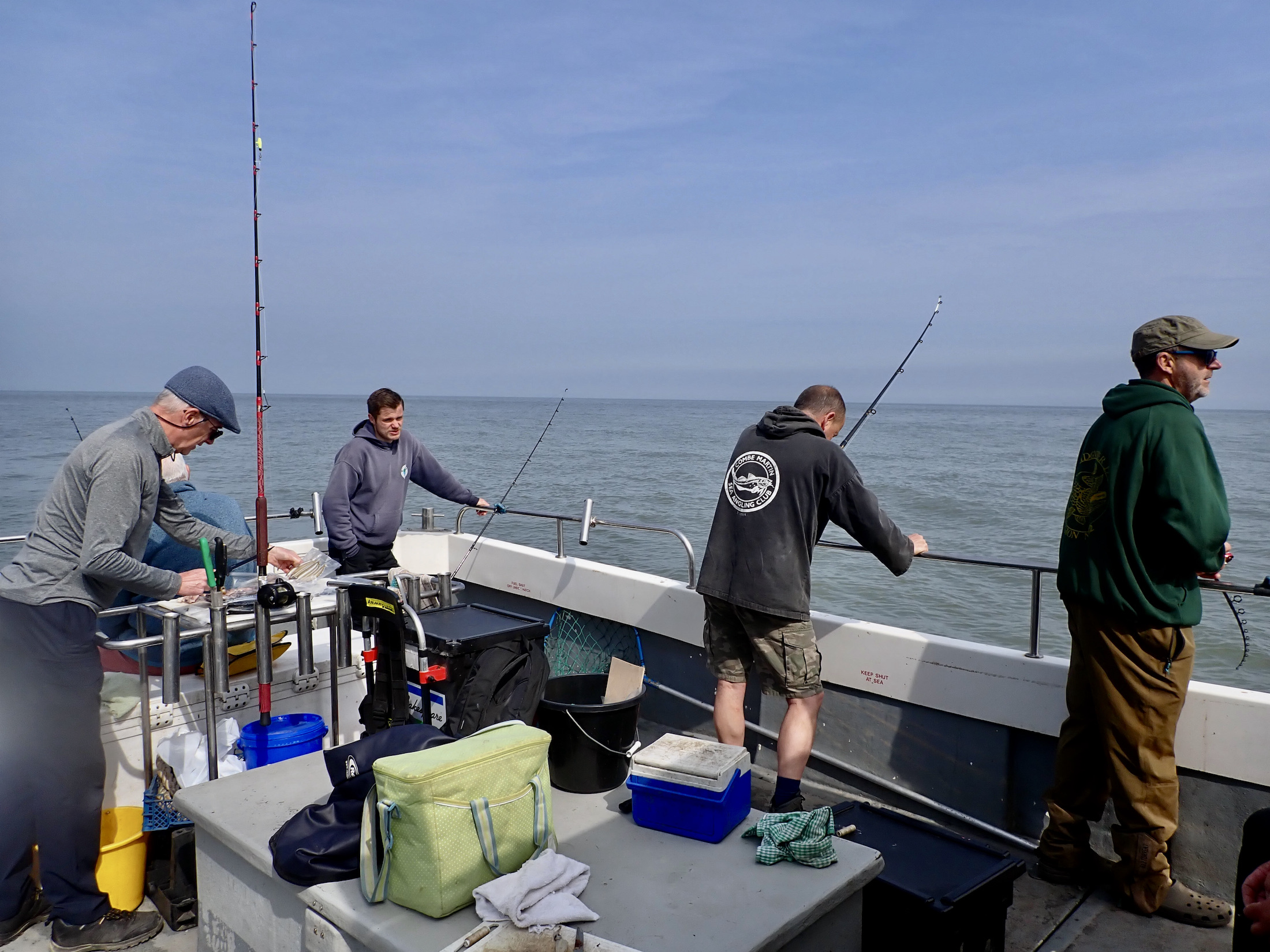
Fishing talk flowed freely with a bit of local politics, reminisce and fishy tales thrown into the mix.
I think I was lucky to catch the first fish a small smoothound. Dogfish were to prove a menace throughout the day snaffling baits intended for more worthy fish.
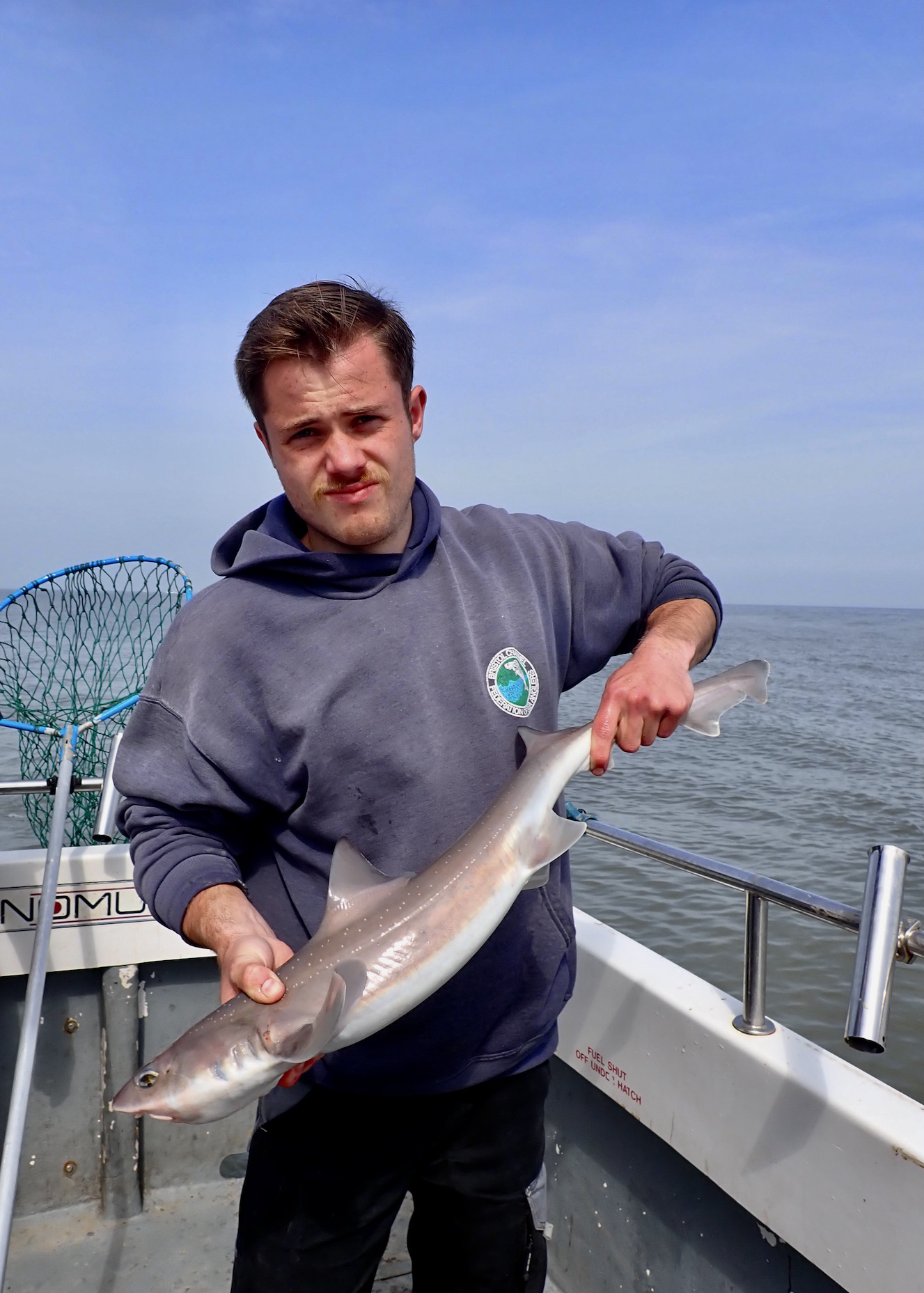
Jack Phillips caught a smoothound of perhaps seven pounds that gave a good account and was the first of several caught throughout the day. The best a fish of around ten pounds to my good friend Bruce Elston his first of the species and a welcome catch adding to his impressive tally of species across salt and freshwater.

Ray were the main target and several small eyed ray were tempted at this first mark of the day.
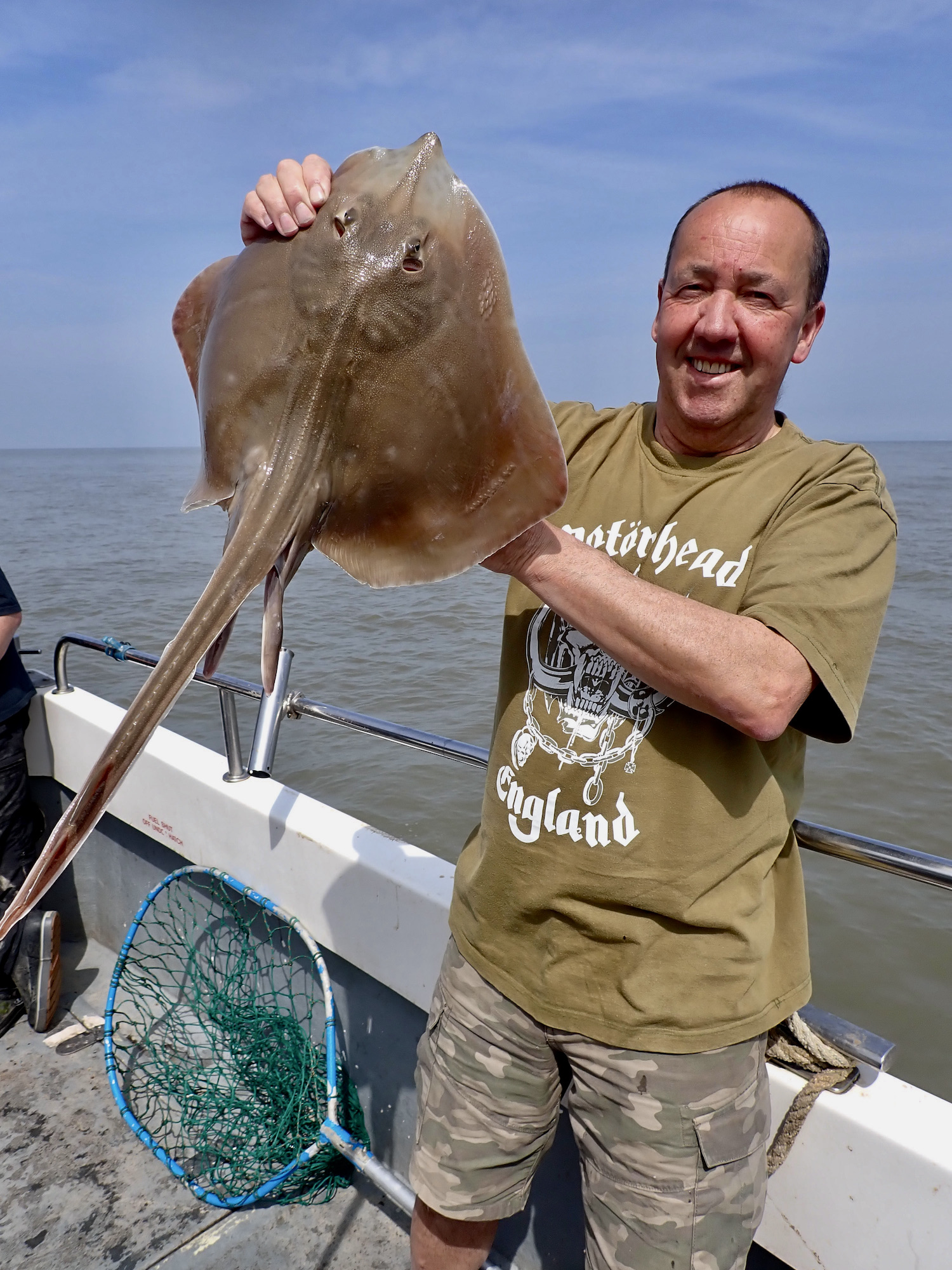
Jack hooked a very good fish that put a healthy bend in his rod before severing the 60lb b.s hook length after a ten minute tussle in a strong tide.
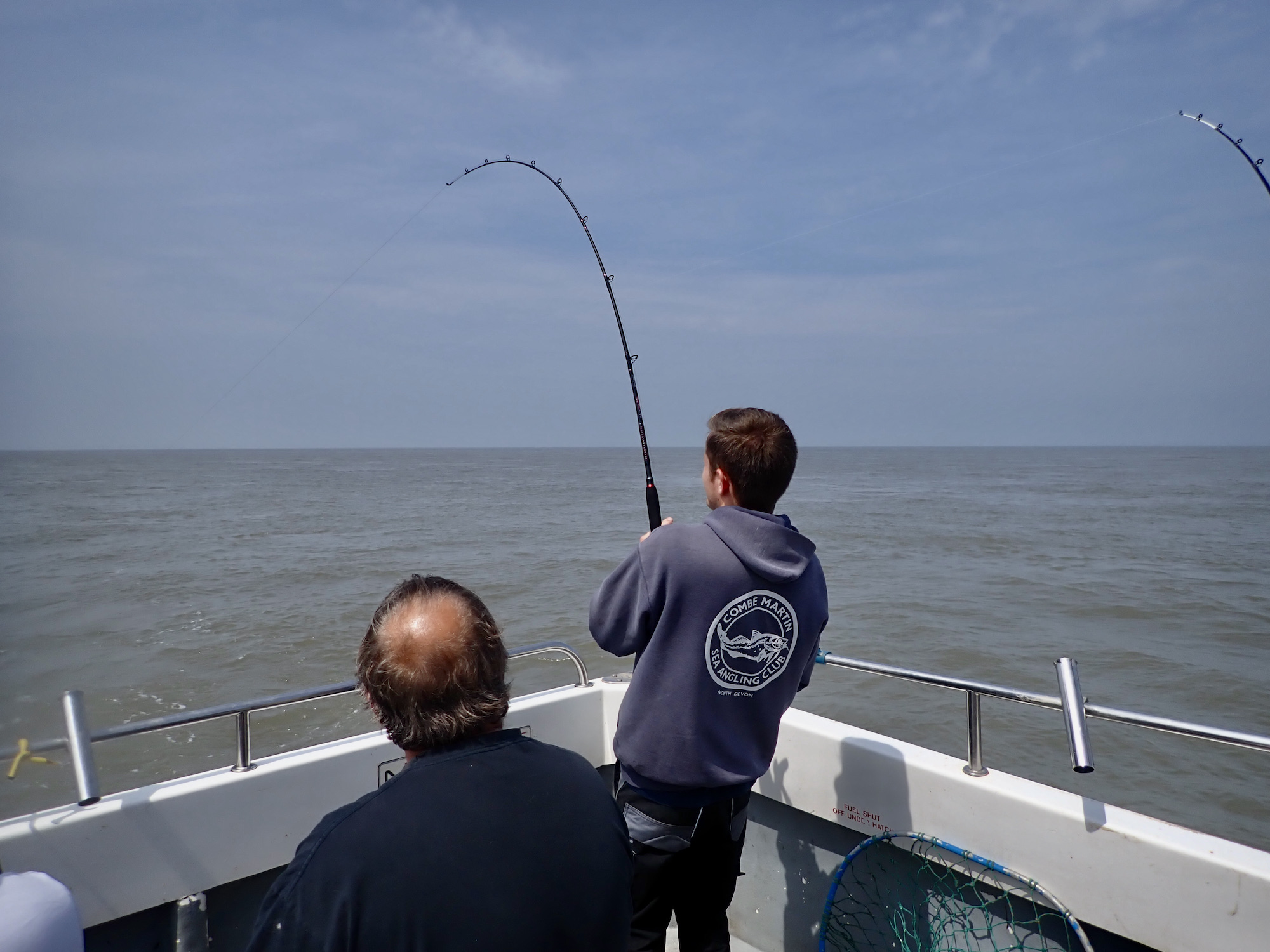
As the tide eased towards low water. Steve up anchored and steamed further west to a renowned area for ray.
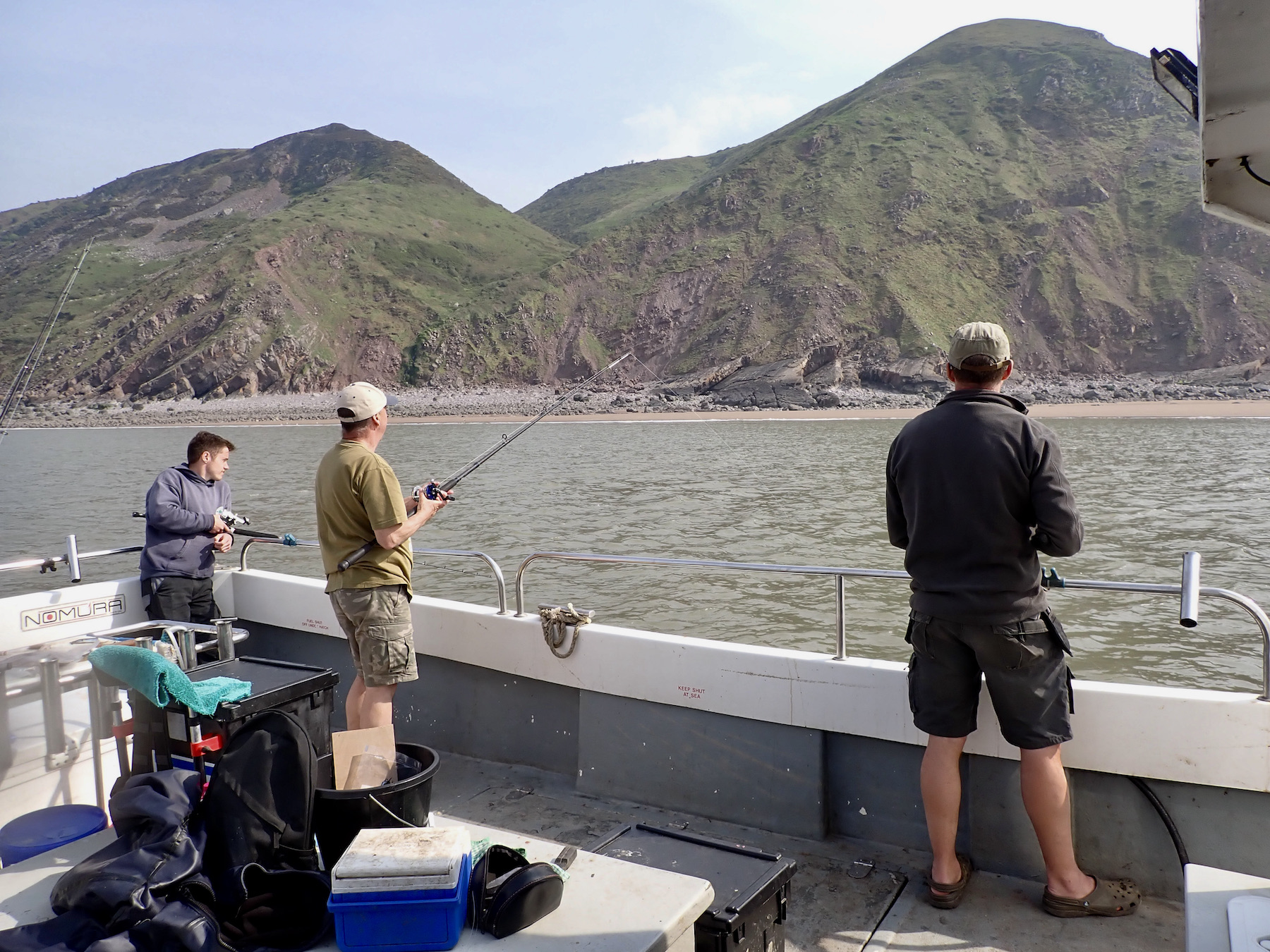
I decided to drop down my down-tider for the first time having concentrated on Up-tiding for the first couple of hours. A mackerel head and flappers was devoured within a few moments of it hitting the seabed. A large huss of just over 10lb appeared on the murky water surface and I was pleased when it slid safely into the net. They have an annoying habit of spitting out the bait on the surface.
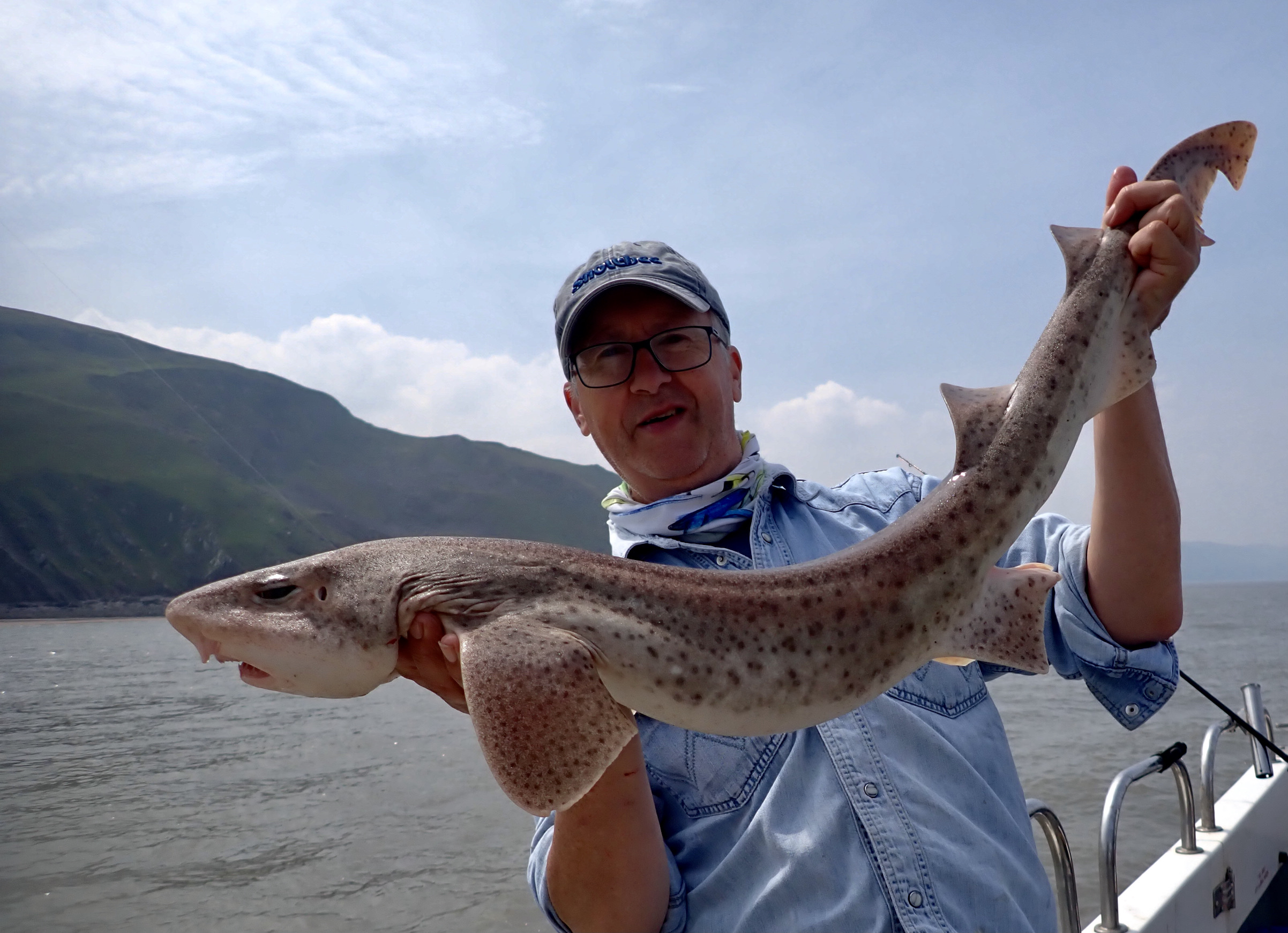
A steady succession of hounds and ray were brought to the boat. Steve kept us fully hydrated with tea and coffee throughout. Friendly banter flowed and the sun shone down.
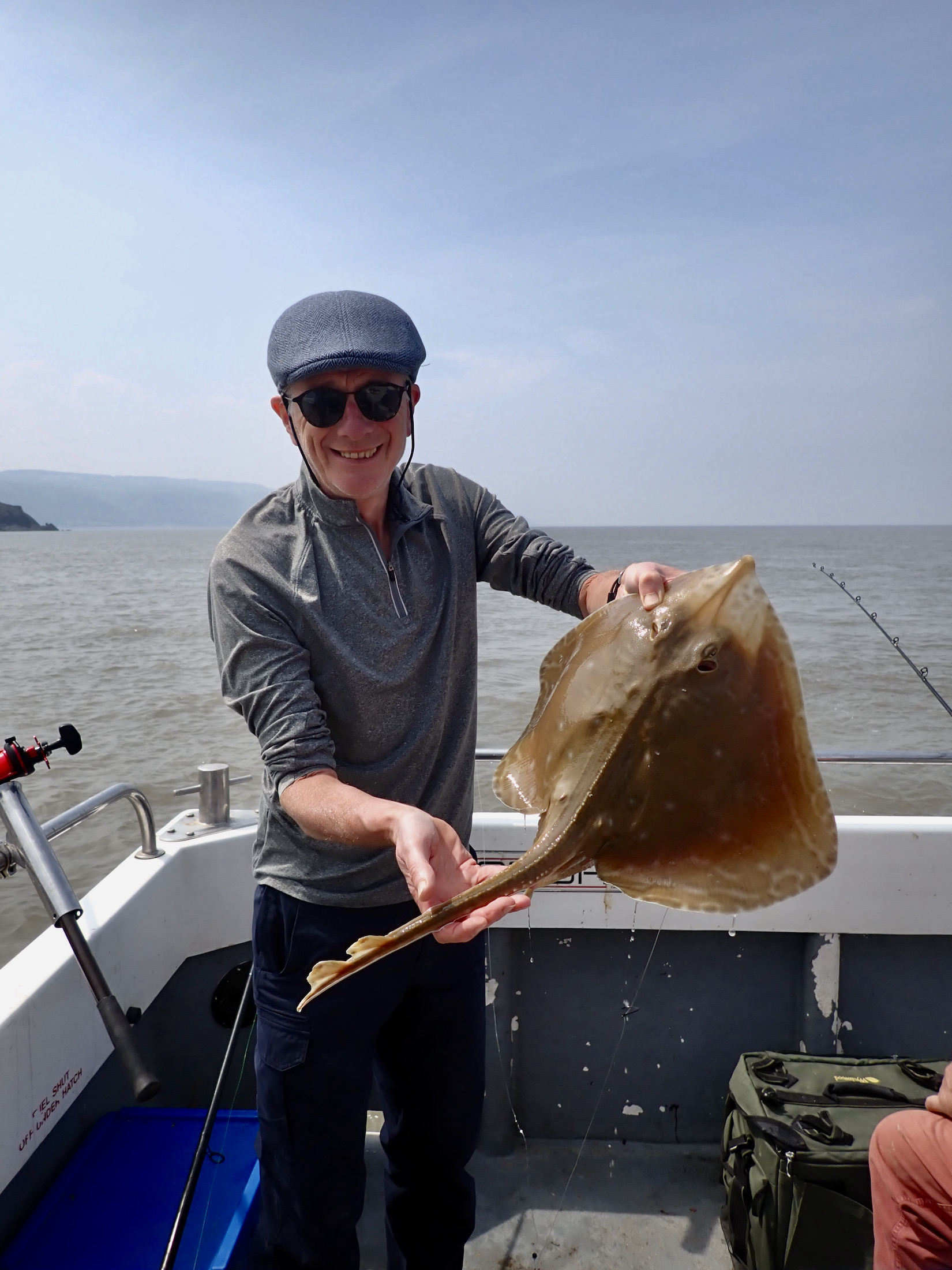
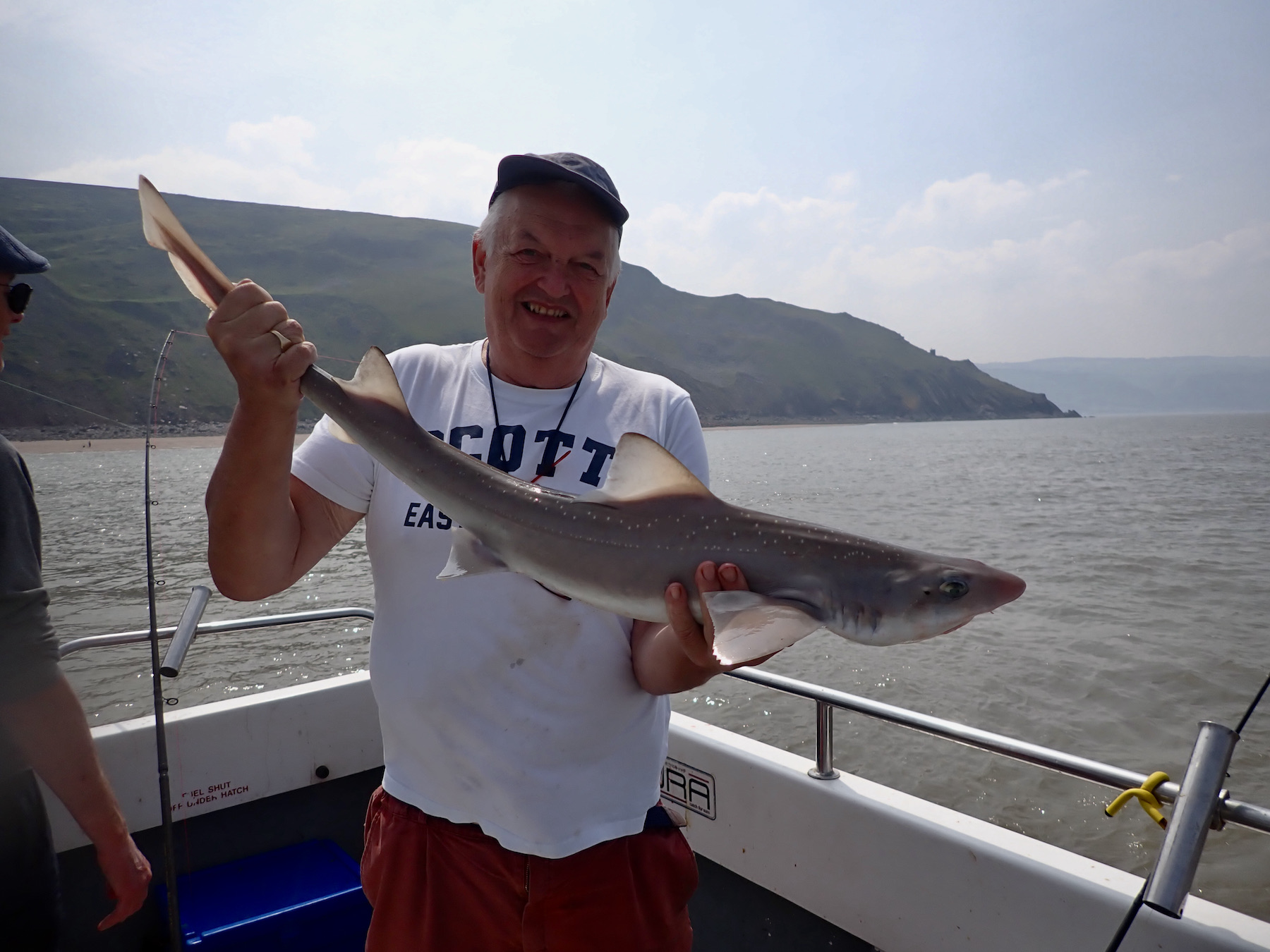
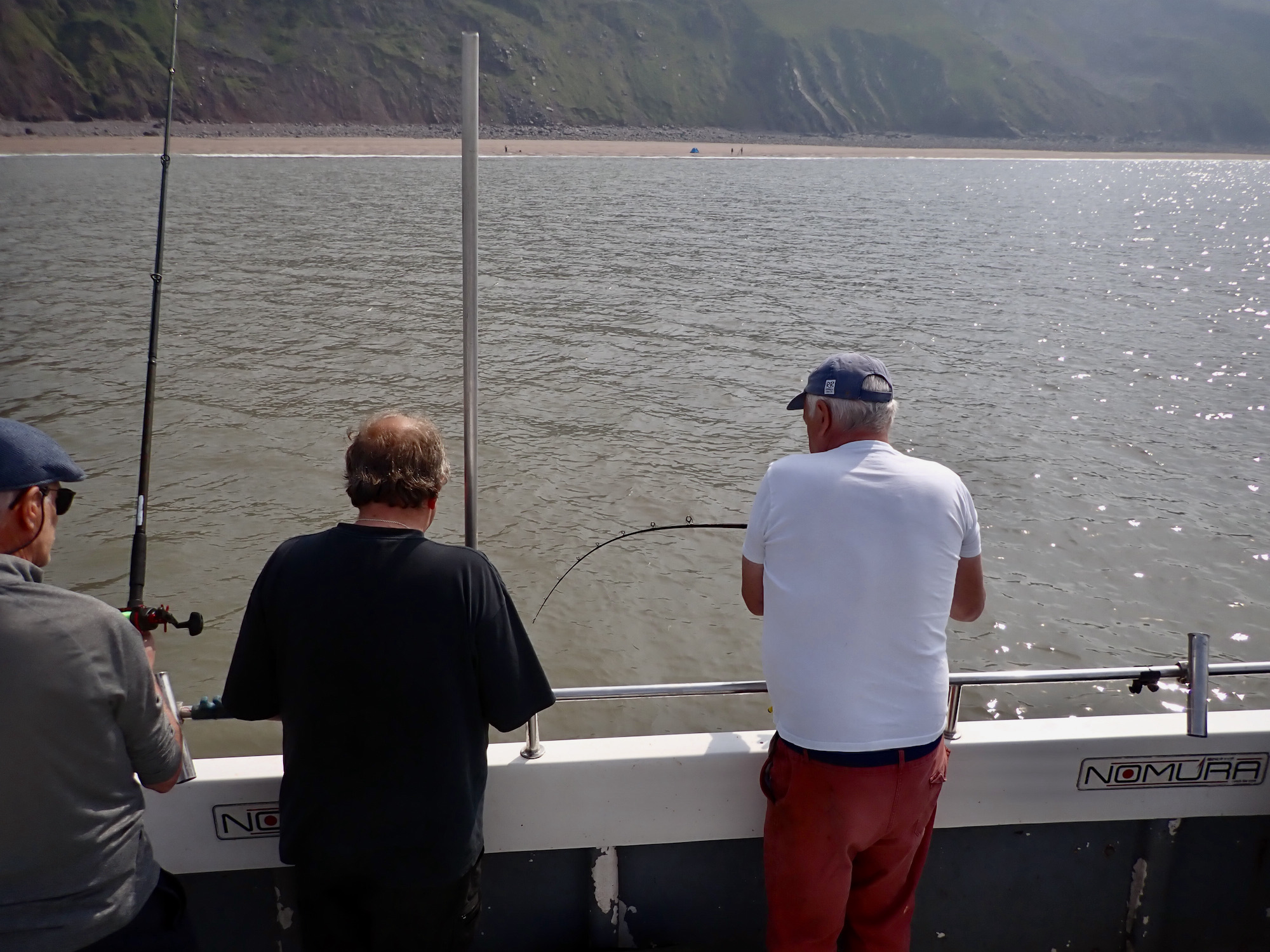
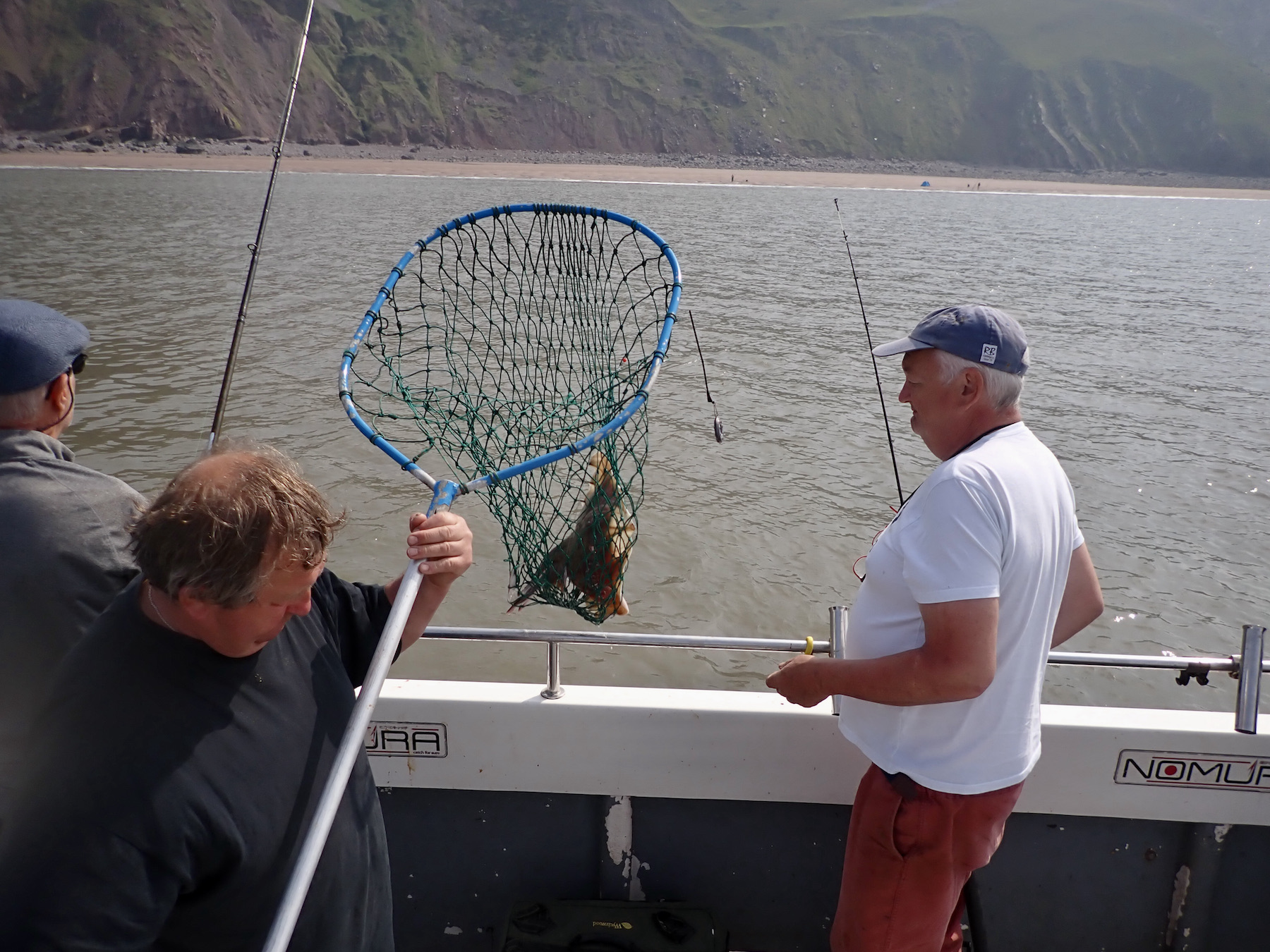
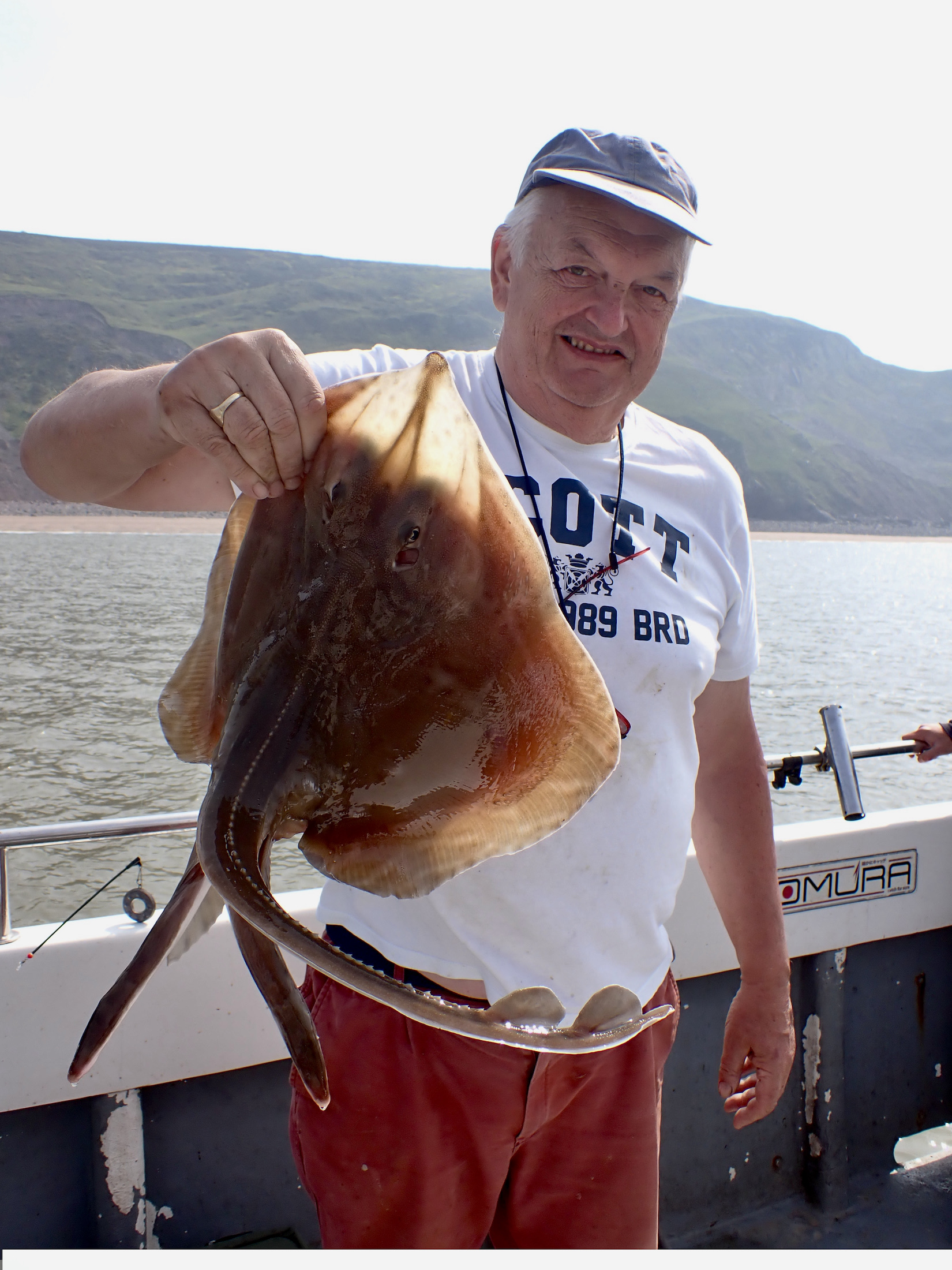
As the tide flooded we made a couple more moves to new areas based upon Steve’s extensive knowledge of this spectacular stretch of Somerset coastline.
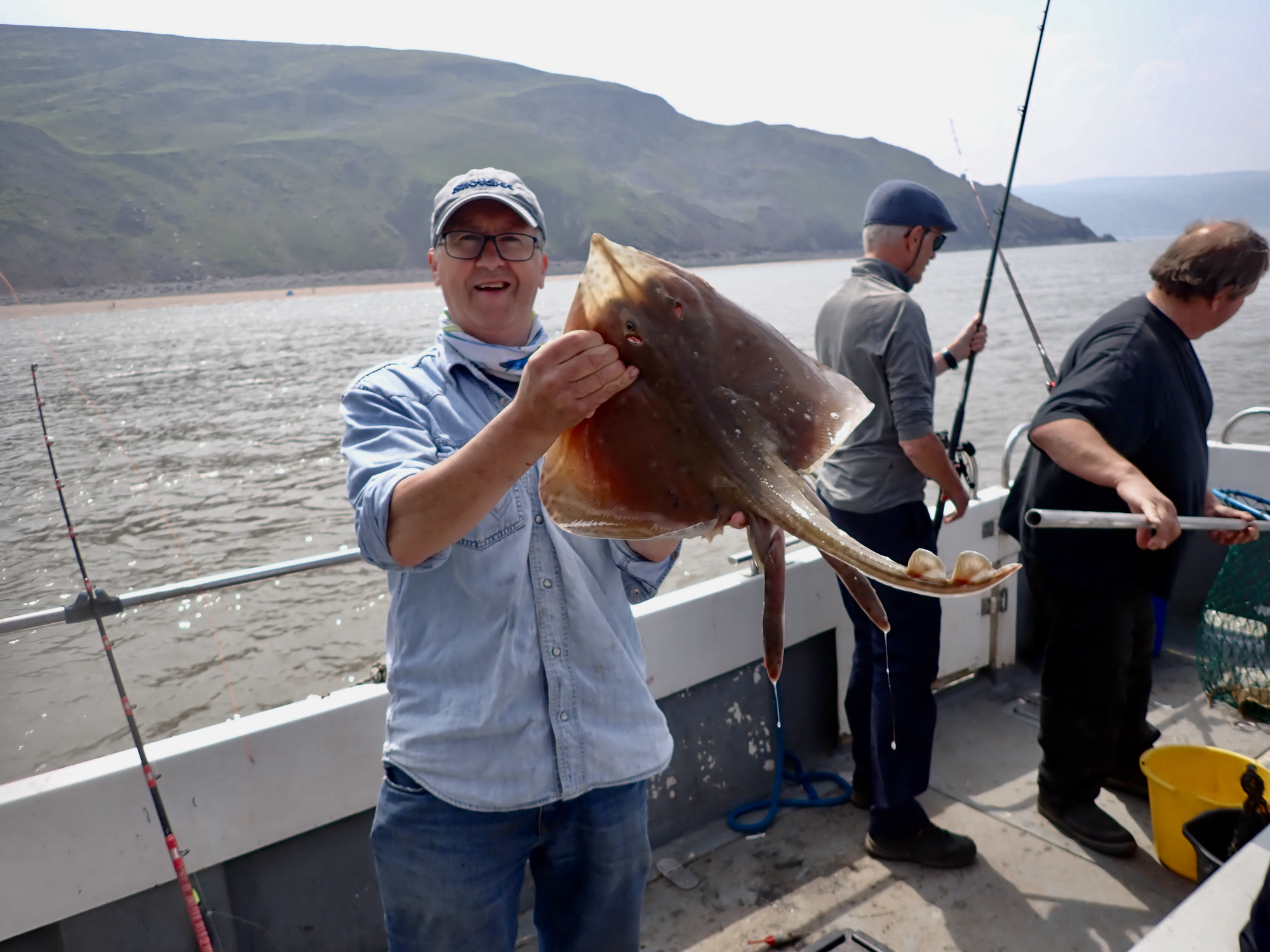
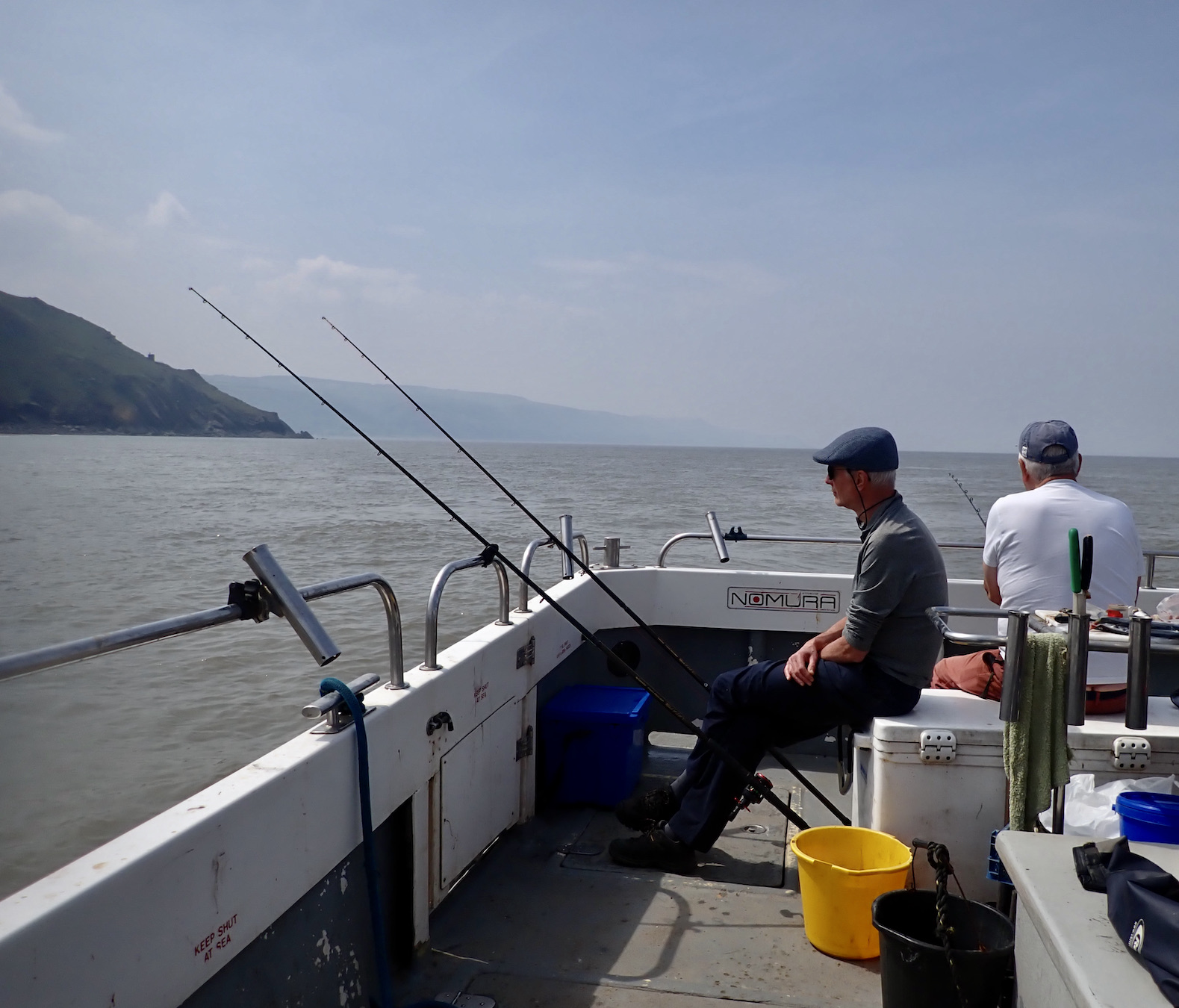
Our last mark was close to where we had started and after a quiet start gave a frantic last hour with several small-eyed nudging double figures and a stunning thornback to Peter Robinson.
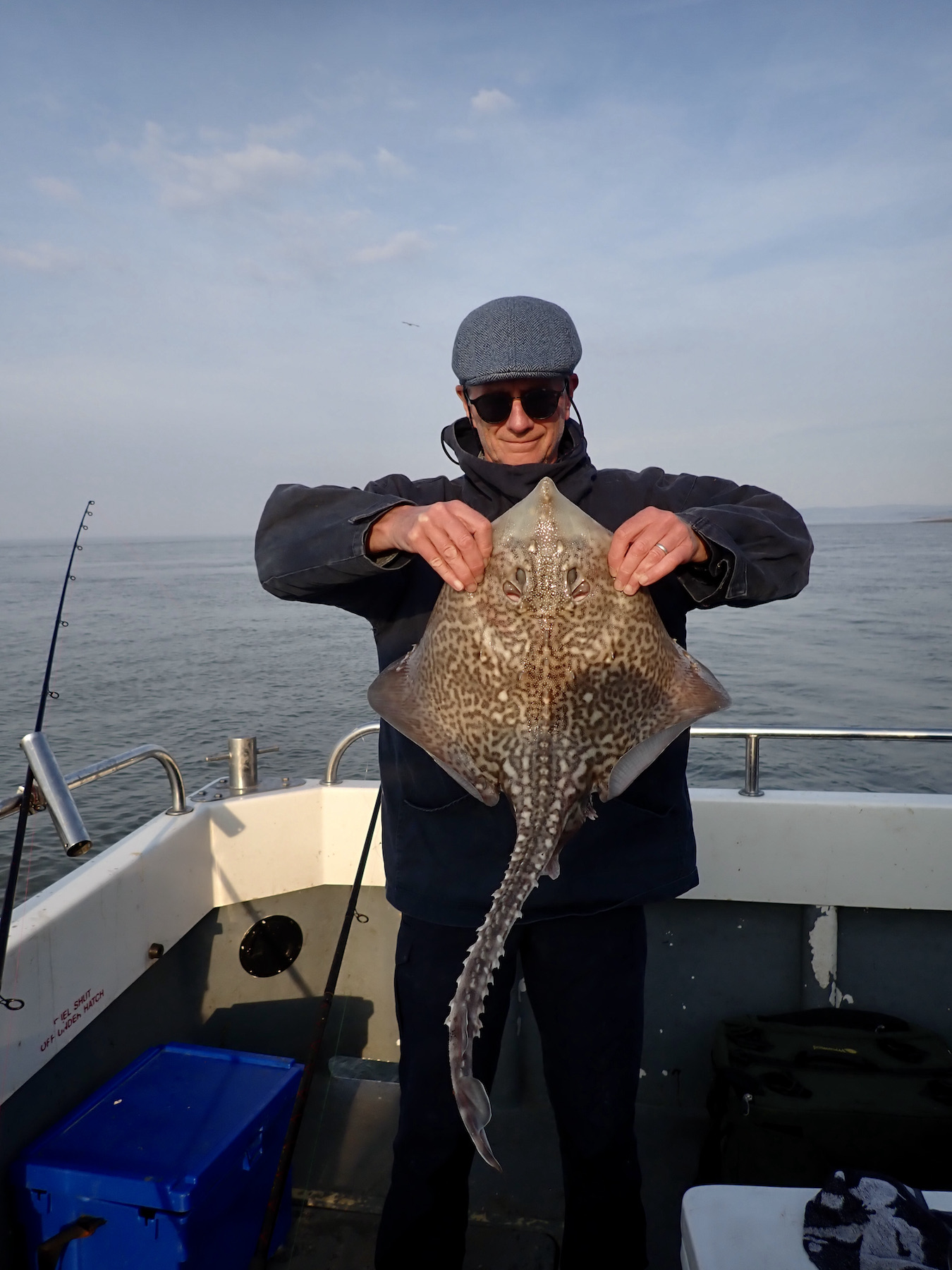
I lost a good fish that slipped the hook just a few yards from the boat. A good smoothound or a big bass? I will never know.
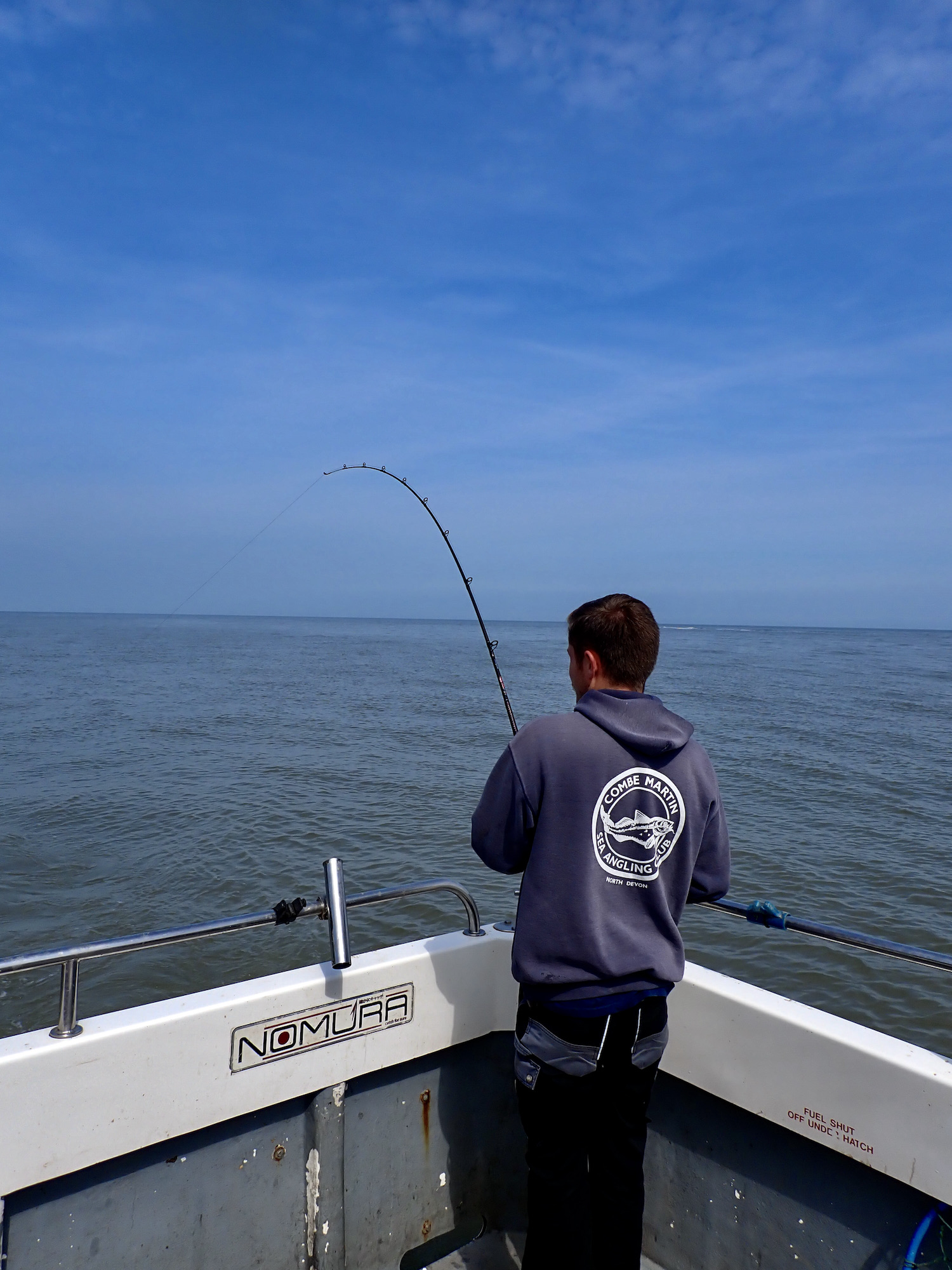

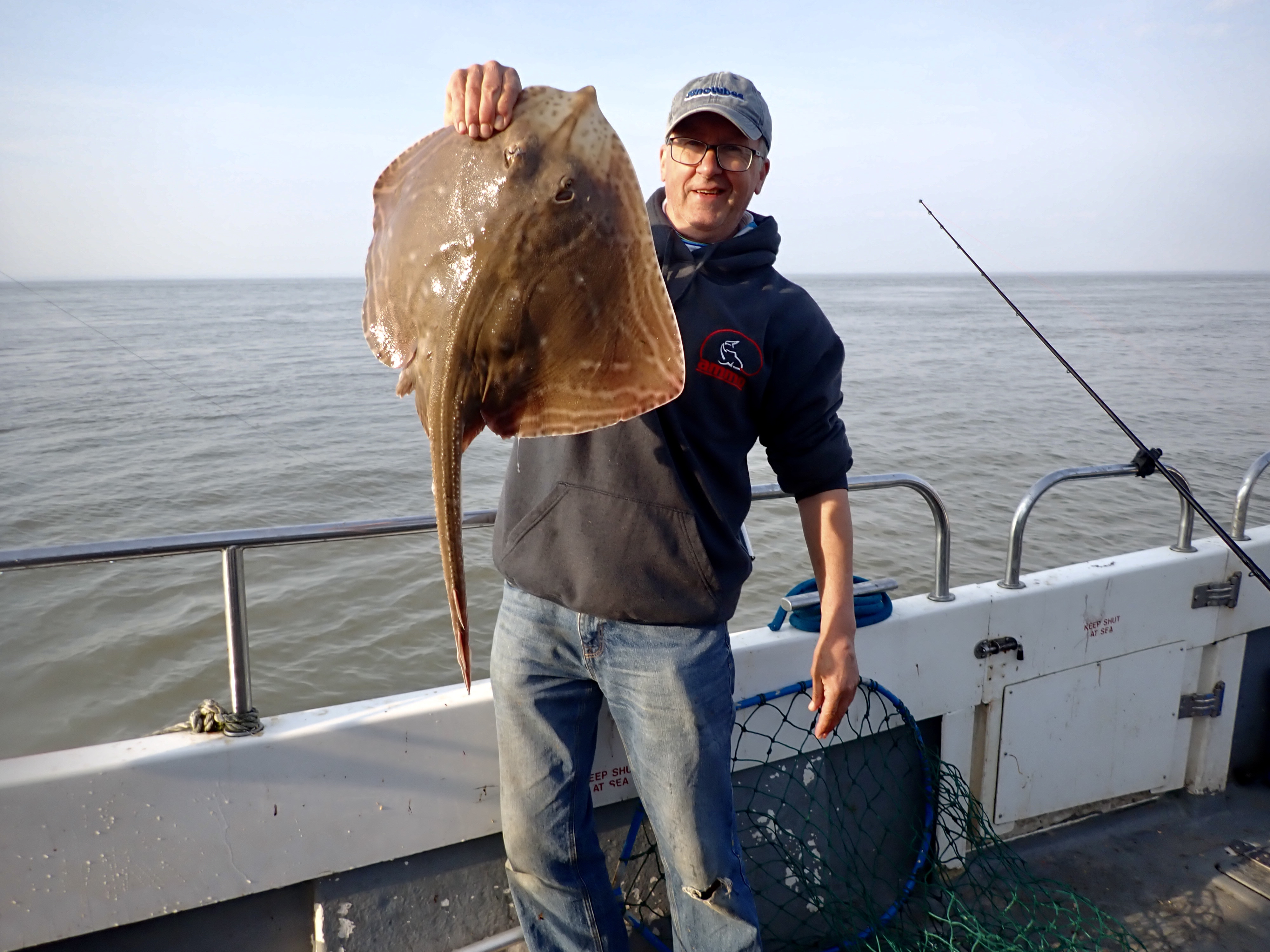
After close to nine hours at sea Steve called last orders and we steamed back to Minehead. The sun was sinking in the west as we washed down the boat. It had been a great day typical of a day out of Minehead its murky waters home to an array of ray and other species. All within a very short steam of the port.
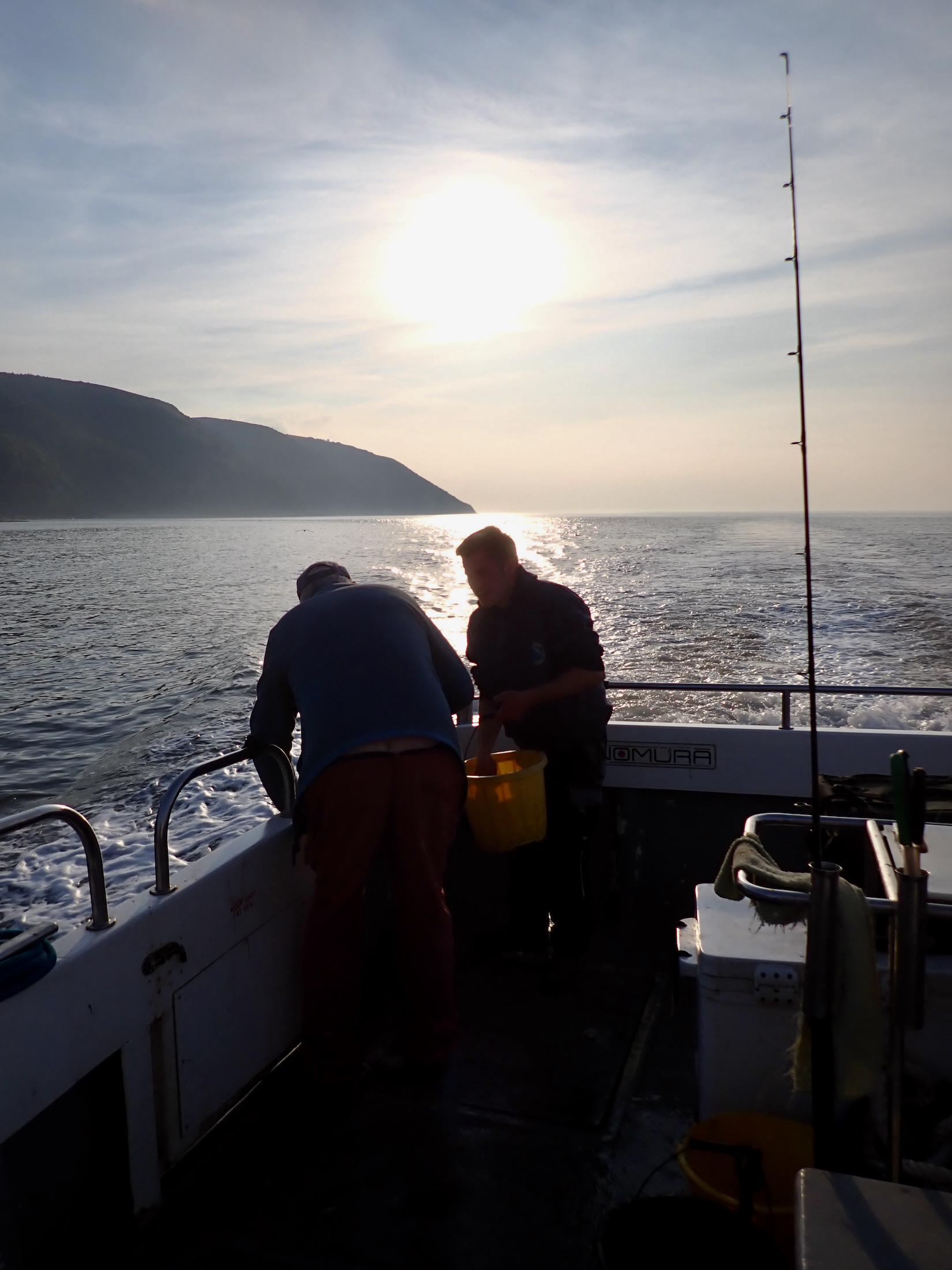
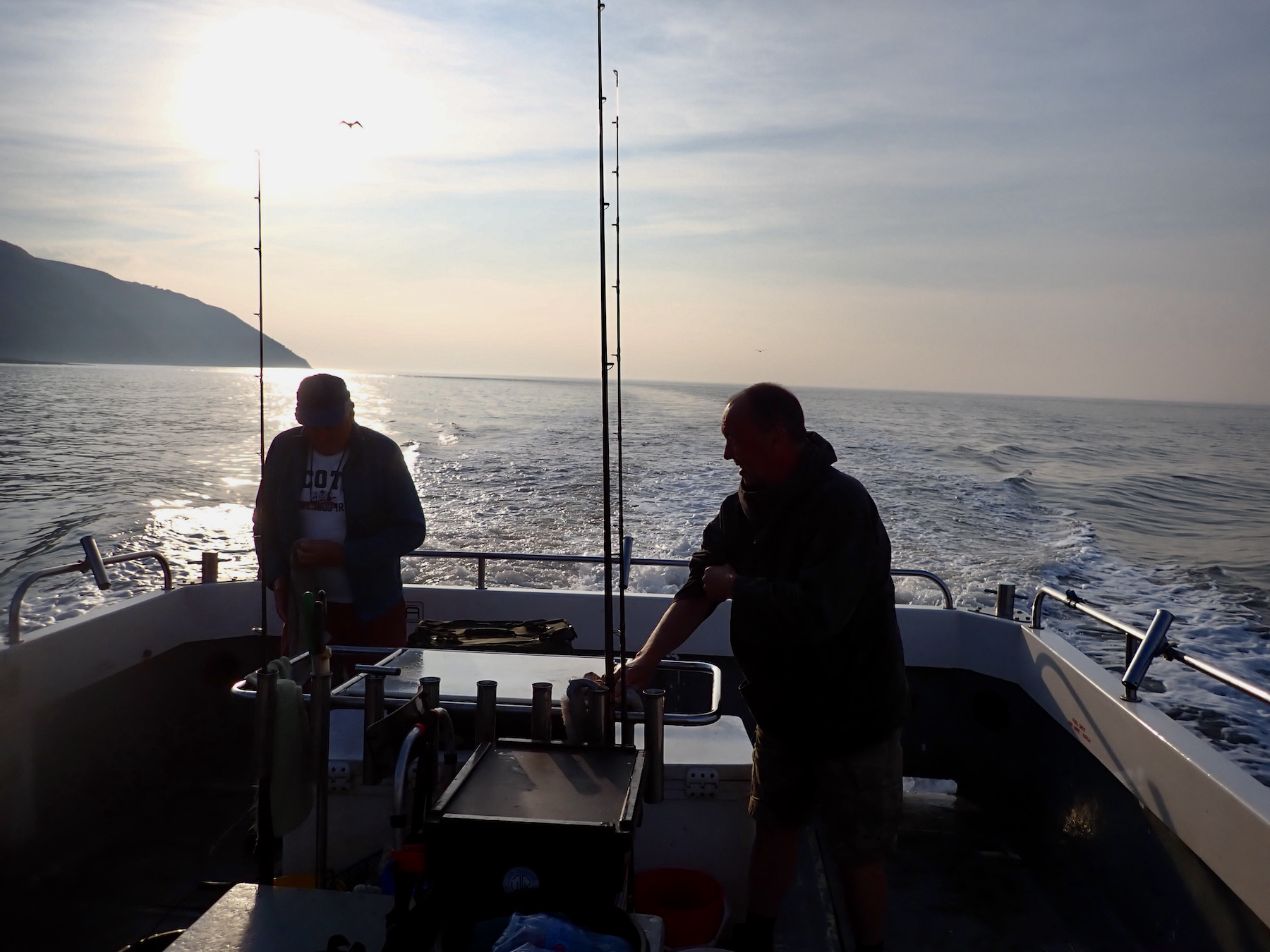
Steve and his family have three charter boats and Speed-bait operating out of Minehead. Check links below:-
https://www.charterboats-uk.co.uk/osprey-minehead/
https://www.teddieboycharters.co.uk
The flyfishing season is off to a promising start at the Arundell..
|
||
|
A few early sea trout have already been taken by rods further down the Tamar, and will be expected up with us in the next few weeks. A couple of salmon have also been hooked but not landed by rods lower downstream, and with good water levels we expect to see a fresh fish in our beats any time soon.
|
|||||
|
COMBE MARTIN SAC – PUTSBOROUGH OPEN – MAY 18th 2024

Combe Martin SAC Host their popular annual Putsborough Open on Saturday May 18th. The event is once again generously sponsored by Sakuma Tackle and Quay Sports with valuable prize bundles for at least the top ten anglers.
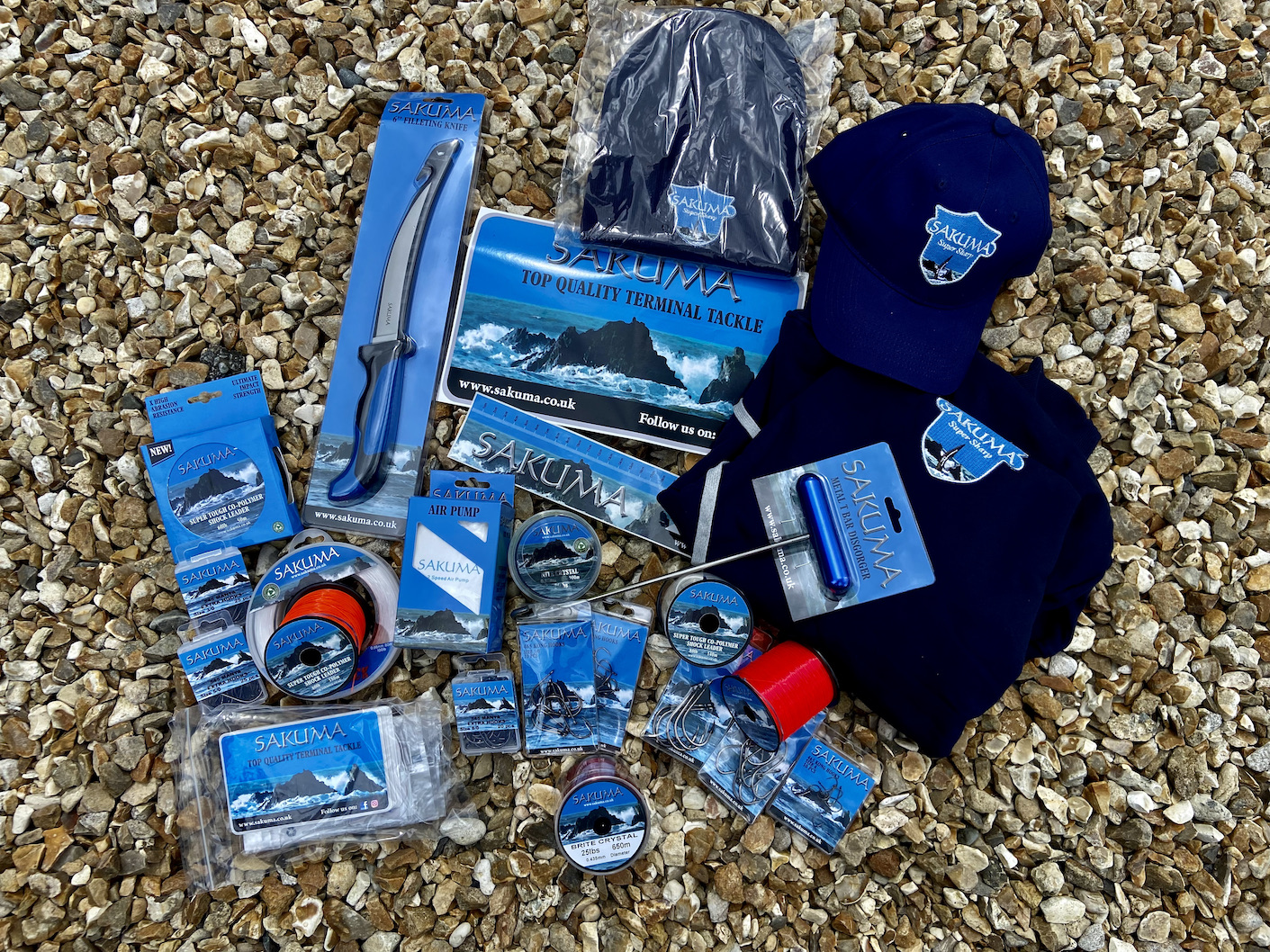
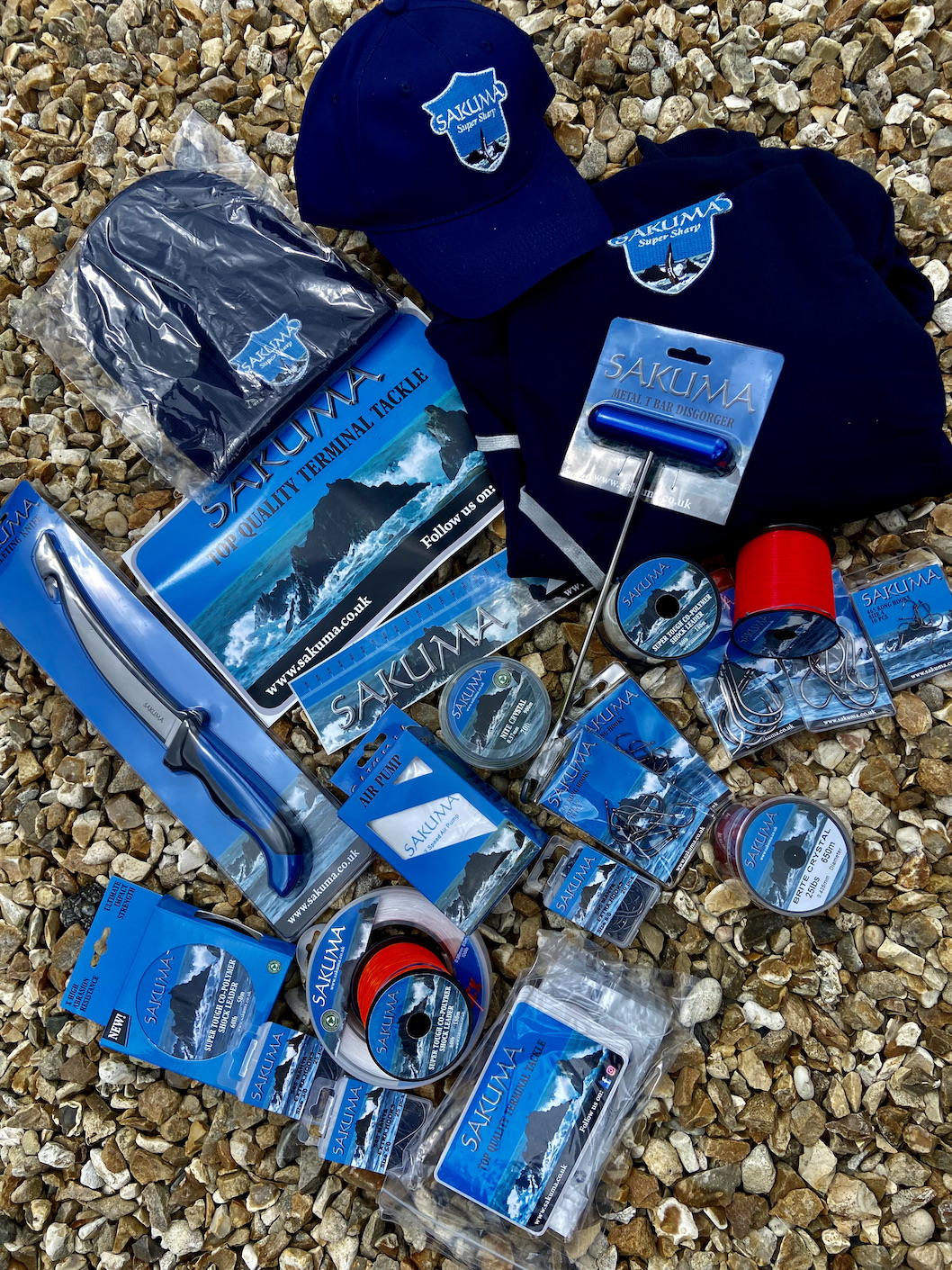
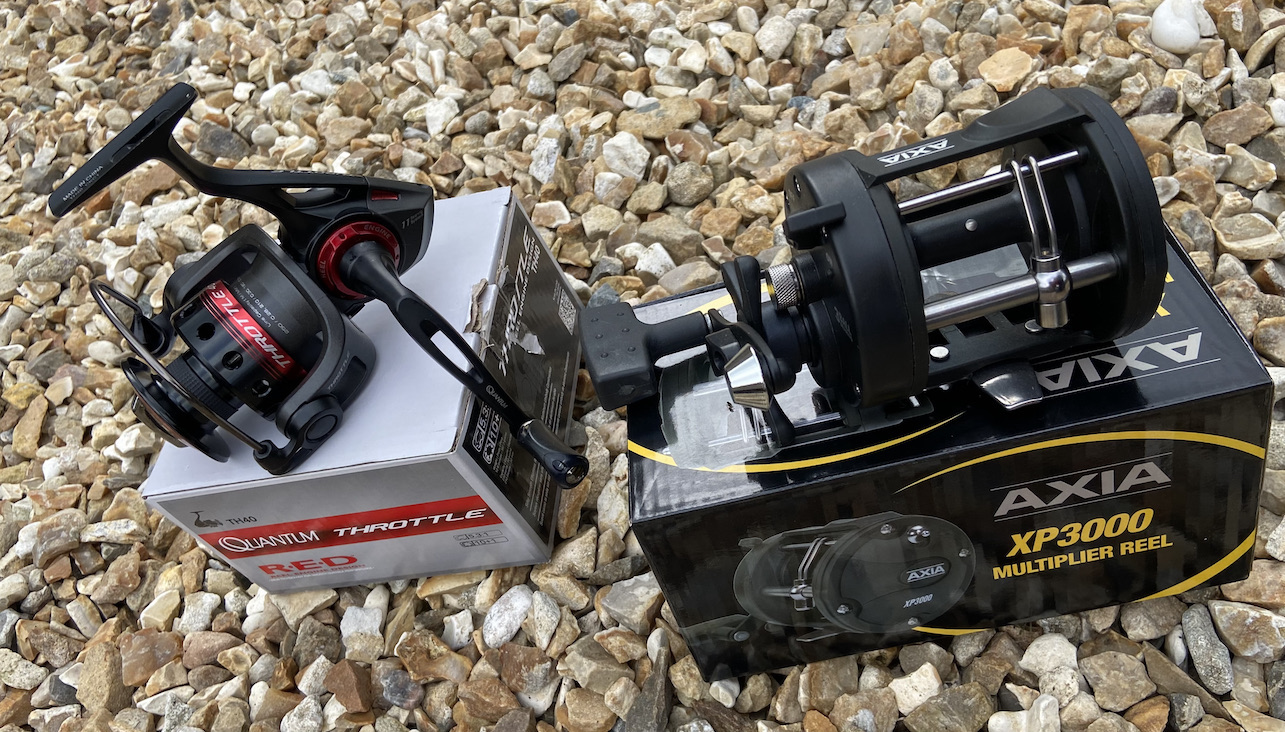
Full details on Poster Below
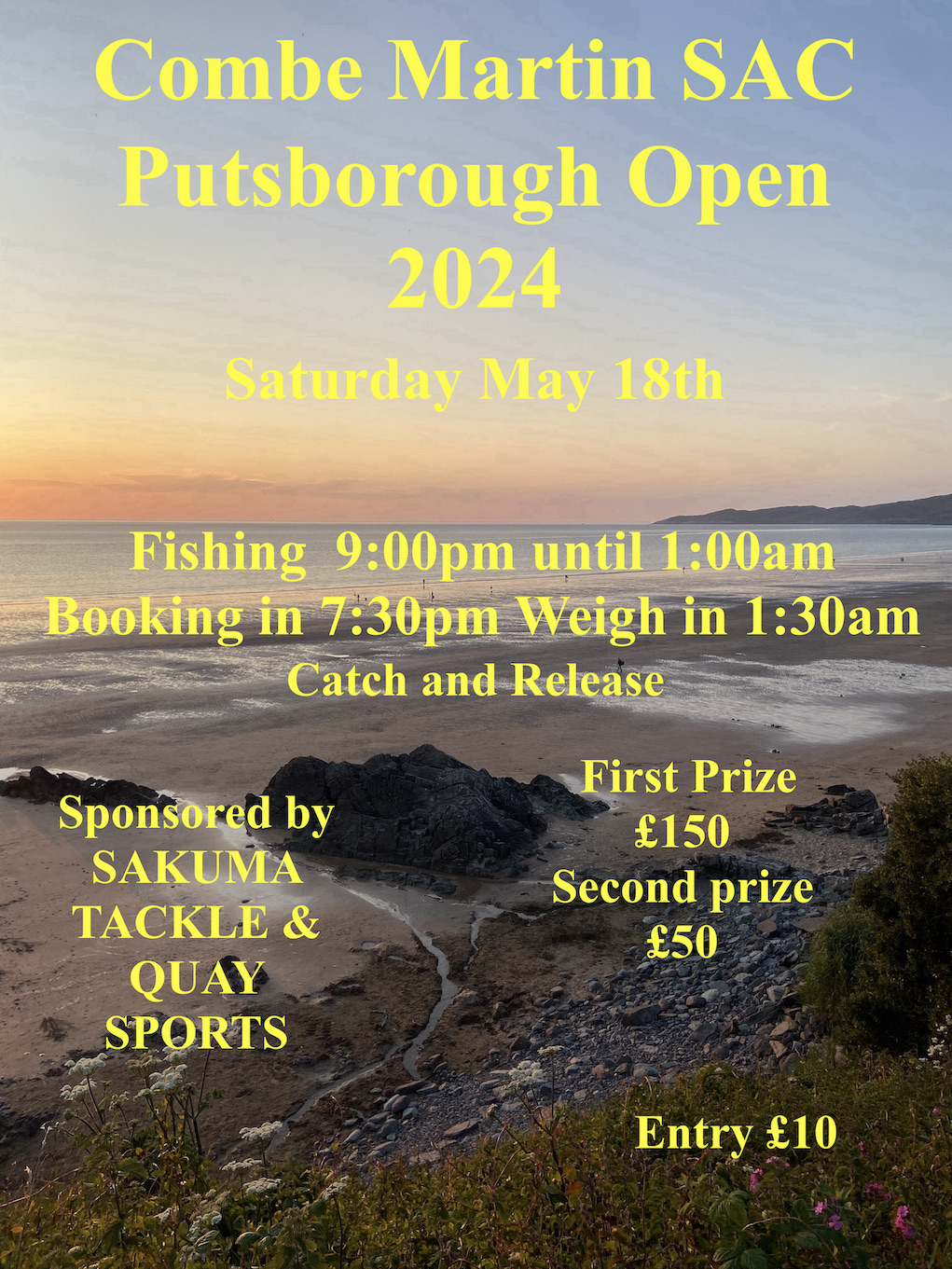
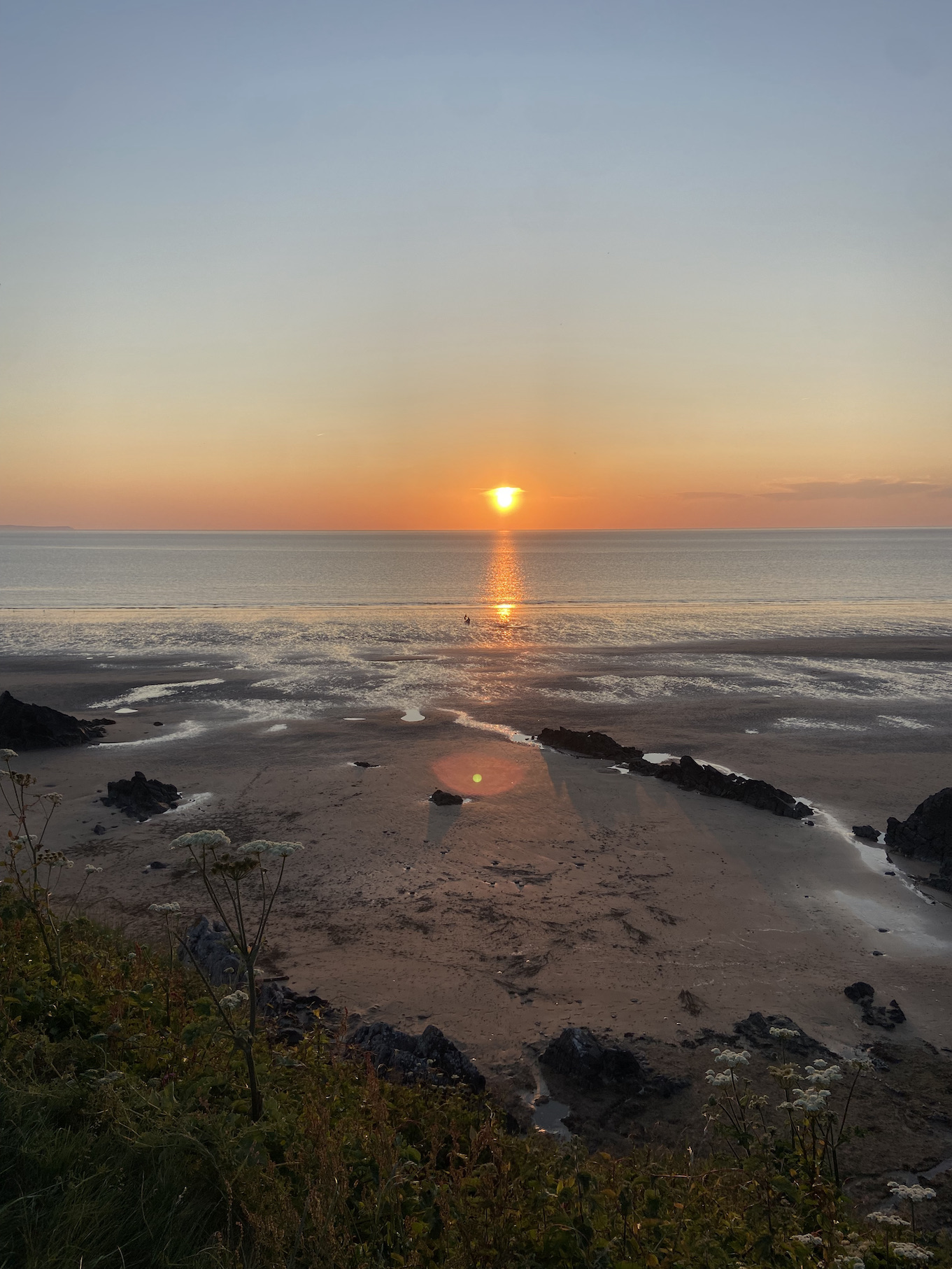
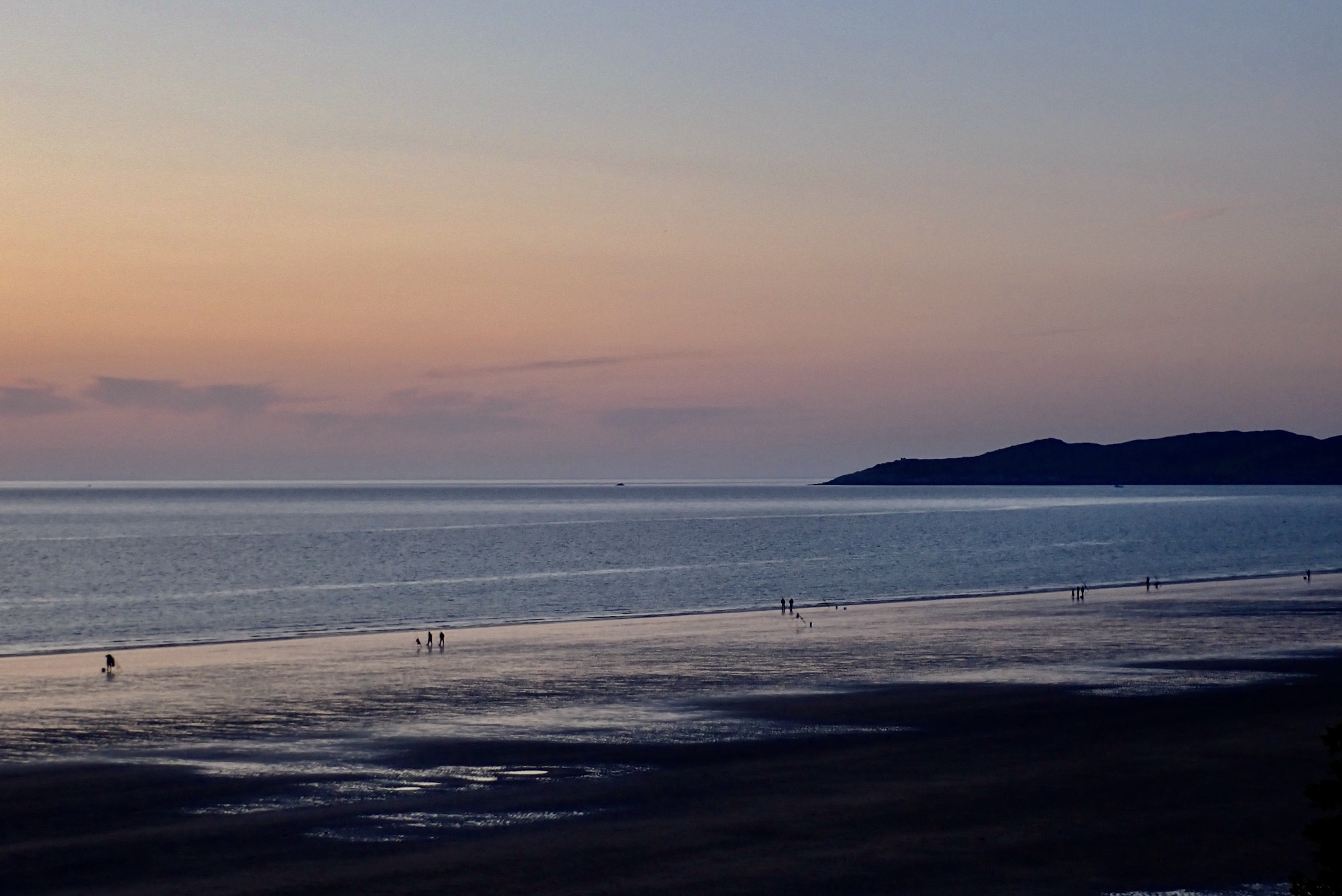
Last year was one of the post succesful competitions so far with large numbrers of fish brought to the scales. See link below :-


